Killer Coke News Archive | 2007
Campaign Reports | Newletter Archive
2003 | 2004 | 2005 | 2006 | 2007 | 2008 | 2009 | 2010 | 2011 | 2012 | 2013 | 2014 | 2015 | 2016 | 2017
Visayan Daily Star, " We'll boycott Coke products - labor coalition, The Organization of Free Workers - Against Labor Oppression, December 27, 2007
"The Organization of Free Workers - Against Labor Oppression will declare their boycott of all products of Coca-Cola Bottlers Phils. Inc. during a "Workers' Forum" on Dec. 28, from 9:30 to 10:30 a.m., at the Workers' Livelihood Center in Bacolod City , a press release from the group said."
Austin American-Statesman, "Coca-Cola, Indian village in dispute: Some locals say company used up, polluted water," By Craig Simons, December 25, 2007
"PLACHIMADA, India -- The gate of the Coca-Cola bottling plant in this remote village is locked. Weeds grow around warehouses that have been idle since 2004, when the local government ordered Coke to halt operations...Some villagers in Plachimada say that after Coke began drawing water from a local aquifer to make soft drinks in 2000, wells dried out and groundwater began to smell and sicken people who drank it. State environmental officials accuse Coke of giving factory waste laced with cadmium, a highly toxic element, to locals as fertilizer."
Warsaw, Poland, Killer Coke's Santa Claus reveals he is a 'closet right-wing paramilitary' — ; "Ho, ho, ho - have some bloody Coke", December 16, 2007
Read about the Polish action
"The half-paramilitary/half-Santa Claus actor loaded his weapons when he saw Coca-Cola's trade unionists giving out information about Coke's crimes. One by one he assassinated the workers, with impunity. 3 activists staged a die-in while playing the roles of the slain Coca-Cola employees and former SINALTRAINAL trade union leaders"
"An interesting part of the action was the fact that the PR chief of Coca-Cola Poland arrived right on time for the beginning and stayed for the whole event. She was unbelievably ignorant of Coke's dark history so I enjoyed playing the role of teacher for her."
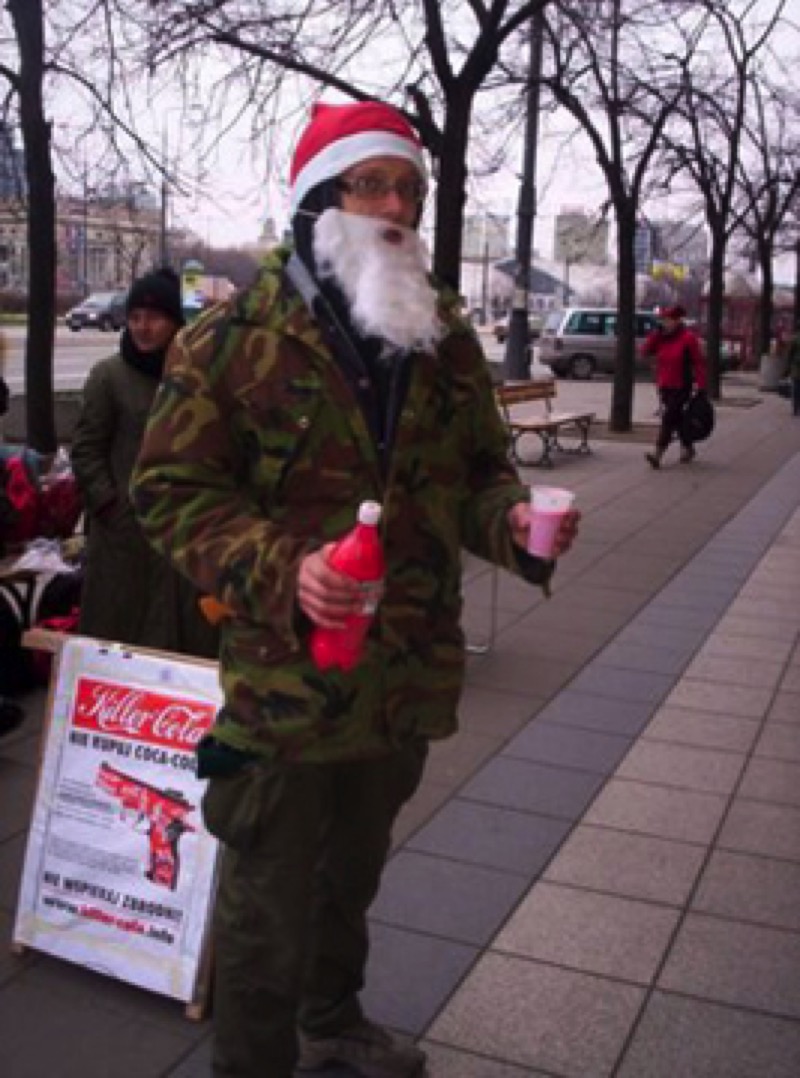
Come on, one drop of Killer Coke won't kill ya!!!
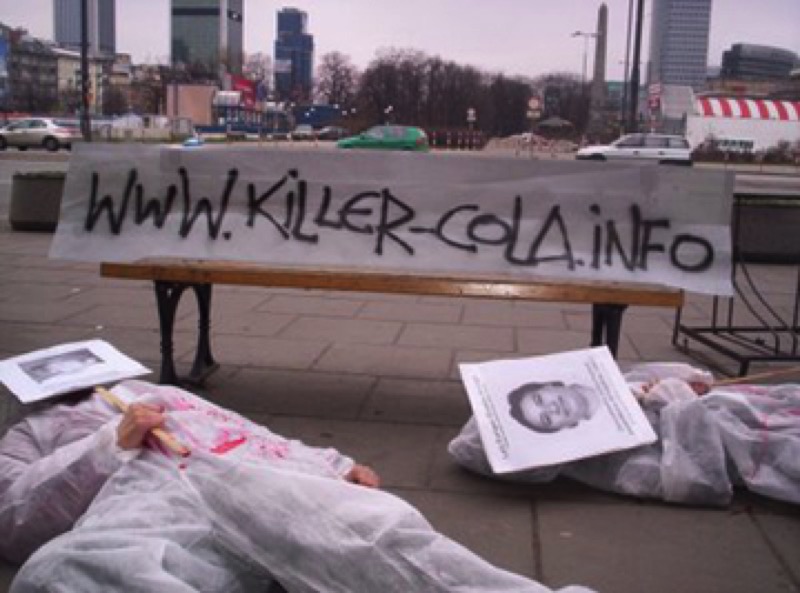
Happening Killer Cola - Warszawa 15 grudnia 2007
Click above or click here to see the video from the Polish campaign
Killer Cola - Poznaj krwawy smak zbrodni
Click above or click here to see the video from the Polish campaign
The Statesman (Stony Brook University), "Coca Cola, Pepsi, or Cadbury-Schweppes: New Contract Bid to Run Through June 2008," By Adam Peck, December 13, 2007
Read Article
The Statesman (Stony Brook University), "A New Contract With an Old Problem," By The Statesman Editorial Board, December 13, 2007
Read Editorial
"And Zero Responsibility," From Simon in Germany

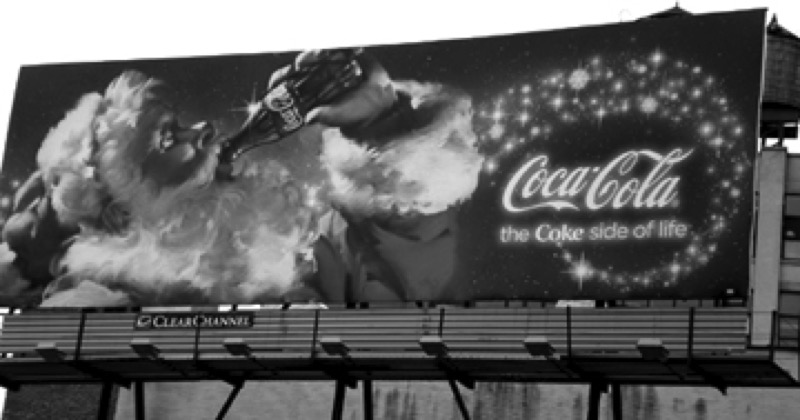
Coca-Cola: The Secret to Santa's obesity
"Thin Santa Claus strikes blow against obesity," By Auslan Cramb, The Telegraph
"He said he was proud of the fact that he had a healthy diet and did not consume sugary drinks...'I have always eaten healthily and have run a healthy-eating course in the past. I gave up cola years ago when I saw what it did to a penny.' "
BBC News, "Did Coke really turn Santa red and white? " December 24, 2007
Read Article
"No. Santa's outfit is believed to have been inspired by the Bishop of Myra in the 4th Century... long before the soft drinks market realised its potential."
'Doonesbury' Disses Dasani!
Coke and Pepsi bottle municipal tap water as 'Dasani' and 'Aquafina' and sell it to us at twice the cost of gasoline," observes the fictional entrepreneur Chad Severnson in cartoonist Garry Trudeau's Sunday, Dec. 2nd 'Doonesbury' strip.
Chad's next comment to radio talk-show host Mark Slackmeyer, a mainstay of Trudeau's long-running feature, makes a point that the Campaign to Stop Killer Coke has always stressed: "Bottled water is a triumph of perceived need over reason - the greatest marketing coup in history."
Since 'Doonesbury' is one of the most widely syndicated comic strips in the English-speaking world, it's safe to assume that the millions who saw the Dec. 2nd episode made up the largest audience ever exposed to such a righteous, anti-coke and anti-Dasani message. In case you missed it, have a look at it below.
The Campaign salutes Garry Trudeau and Universal Press Syndicate for this well-timed and perfectly-aimed arrow through the heart of a colossal fraud and key Coca-Cola profit center. We also recommend our own "Dasani is DaPhony" mini-poster as rendered by another fine cartoonist, Jay Lynch, and writer-editor Joe Pilati, who have collaborated on several leaflets and posters for the Campaign. The mini-poster can be seen below.
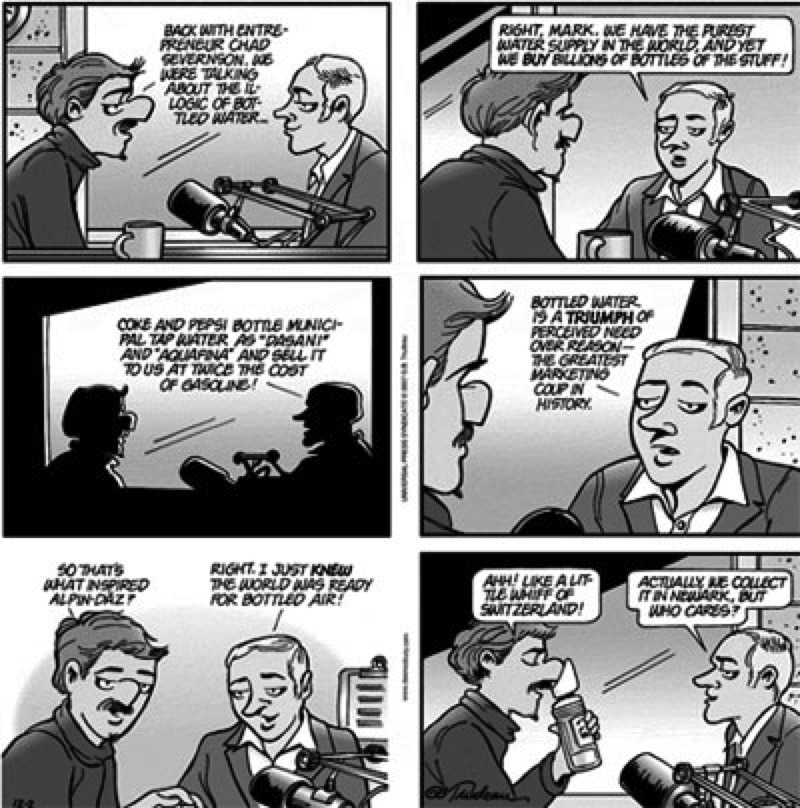
Doonesbury by Garry Trudeau
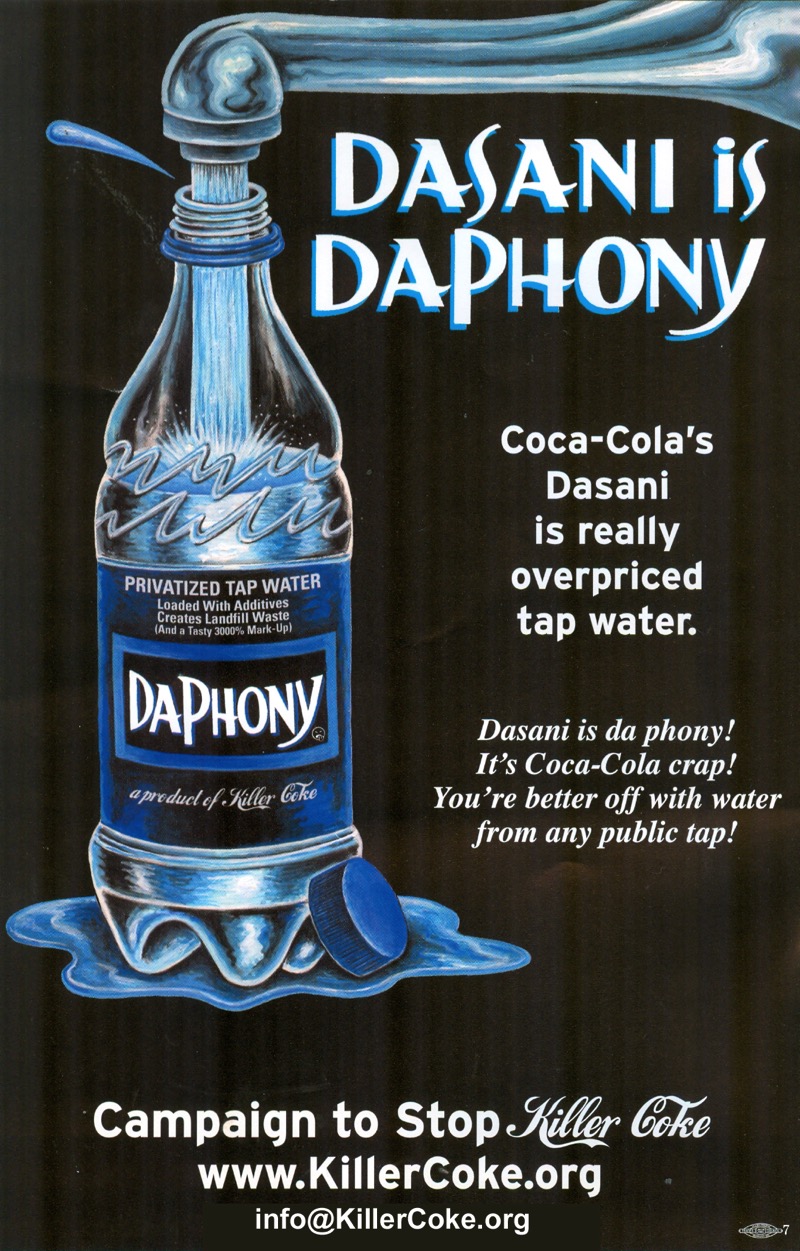
The New York Times, "Junking Fat Foods in Schools," Editorial, December 10, 2007
Read Editorial
"A worthy but imperfect amendment pending in Congress would help curb junk foods sold in too many of the nation's schools...So far, the farm bill is about as good for the American consumer as most of the confections in school vending machines...The people who make Mars bars, Frito-Lay chips and Coca-Cola also back the amendment. That's because it would not remove all junk food. It would allow diet drinks in high schools and require states like California, which currently bans them, to relent. Local districts would be allowed to impose tougher restrictions on the foods in their schools but states would not. The bill would also give industry a long time, until 2011, to adapt."
Food Week Online, " 'Jury' raps Coca-cola over ad campaign," December 10, 2007
Read Article
"A 'trial by jury' panel set up by The Parents Jury has returned a guilty verdict against Coca-Cola's marketing campaign that promotes Coca-Cola as a suitable accompaniment to the family dinner."
Herald Sun (Australia), "Pepsi party's no joke to Coca-Cola," By John Masanauskas, December 10, 2007
Read Article
"COCA-COLA is furious that some of its workers toasted the Christmas season by guzzling rival Pepsi's cola. About 70 workers from Coca-Cola's Moorabbin manufacturing plant chose the rival cola for their party on Friday after management refused to supply Coke."
Earth Policy Insitute, "BOTTLED WATER BOYCOTTS: Back-to-the-Tap Movement Gains Momentum," December 2007
Read Data
Read about back-to-the-tap initiatives in the following cities: Davis, CA; Emeryville, CA; Los Angeles, CA; San Francisco, CA; San Jose, CA: Santa Barbara, CA; Chicago, IL; Urbana, IL; Louisville, KY; Boston, MA; Ann Arbor, MI; St. Louis, MO; New York, NY: Salt Lake City, UT; Charlottesville, VA; Vancouver, WA; Wauwatosa, WI; Manyly, NSW; Burnaby, BC; Vancouver, BC; Charlotteown, PEI; Town of the Blue Mountains, ON; Ottawa, ON; Toronto, ON; Paris, France; Florence, Italy; Rome, Italy, and Liverpool, UK. States and Counties: California, U.S.; Santa Clara County, CA, U.S.; Cook County, IL, U.S.; Illinois, U.S.; Massachusetts, U.S.; Frederick County, MD, U.S.; Maine, U.S.; Michigan, U.S.; Jackson County, MO, U.S.; New York State, U.S.; Oregon, U.S.; New South Wales, Australia; Cornwall County, UK; Stroud District, Gloucestershire County, U.K. National Governments: Denmark; U.K. Government Agencies; Green Party, U.K. and more.
peopleandplanet.net, "Bottled water backlash is growing," By Janet Larsen, December 7, 2007
Read Article
"From San Francisco to New York to London, Rome and Paris, city governments, high-class restaurants, schools, and religious groups are ditching bottled water in favour of what comes out of the tap. With people no longer content to pay 1,000 times as much for bottled water, a product no better than tap water, a backlash against bottled water is growing."
Park Slope Reader, "Water, water everywhere, but is it green to drink?" By Elizabeth Ruksznis, Winter 2007
Read Article
Read "Bottled Water: Top 10 Reasons Not to Buy It
The Phoenix (Loyola Chicago), "Coca-Cola debate nears settlement Committee looks to Colombian Jesuits for input," By Anthe Mitrakos, December 5, 2007
Read Article
The Moscow Times, "A New Era for Labor Unions," By Boris Kagarlitsky, December 6, 2007
Read Article
"...when punitive measures were brought against workers demanding their rights. Valery Sokolov, leader of the labor union at Heineken's brewery in St. Petersburg, was dismissed following a work slowdown staged there in April. Before that, Sergei Dolgy, chairman of the first Coca-Cola employees' union, was fired in similar fashion."
University of Saskatchewan Students: To contact the university's campaign against Killer Coke, email popthemonopoly@gmail.com
Scienceline, "Is vitaminwater good for you?" By Christopher Intagliata, December 3, 2007
Read Article
"...vitaminwater's parent company, Glaceau (owned by Coca-Cola), markets the drink by emphasizing its nutritional value. Is there any science behind the marketing though?
" ...'The way that vitaminwater is marketed and positioned it's made to look more healthful than other sugary beverages, but it's not — ; it's still just a soft drink,' said Margo G. Wootan, Director of Nutrition Policy at the Center for Science in the Public Interest. 'It has this aura of healthfulness that is not deserved. Adding vitamins and minerals to junk food doesn't make it healthy.' "
Stuff.co.nz (New Zealand), "Another first for Charlie's," By Jenny Ruth, December 2, 2007
Read Article
"...vitaminwater's parent company, Glaceau (owned by Coca-Cola), markets the drink by emphasizing its nutritional value. Is there any science behind the marketing though?
" 'The way that vitaminwater is marketed and positioned it's made to look more healthful than other sugary beverages, but it's not — ; it's still just a soft drink,' said Margo G. Wootan, Director of Nutrition Policy at the Center for Science in the Public Interest. 'It has this aura of healthfulness that is not deserved. Adding vitamins and minerals to junk food doesn't make it healthy.' "
Red and Black (University of Georgia), "Students lead protest of Coca-Cola," By Kristen Coulter, November 28, 2007
Read Article
"A group of University students are protesting Coca-Cola this week. Members of the Rhetoric of Social Movement class are protesting against Coke because of allegations about the company's business practices...The group planned one protest activity for each day. On Monday and Tuesday, they put up fliers and posters. Today, they plan to unplug or put out of order signs on campus vending machines. On Thursday, they will host an information session and debate in the SLC."
On Nov. 26, Coke Director and President of Hearst Magazines Cathleen Black spoke at the 92nd Street Y, NYC. Campaign to Stop Killer Coke supporters were there to educate those attending the event.
The flyer that was distributed:
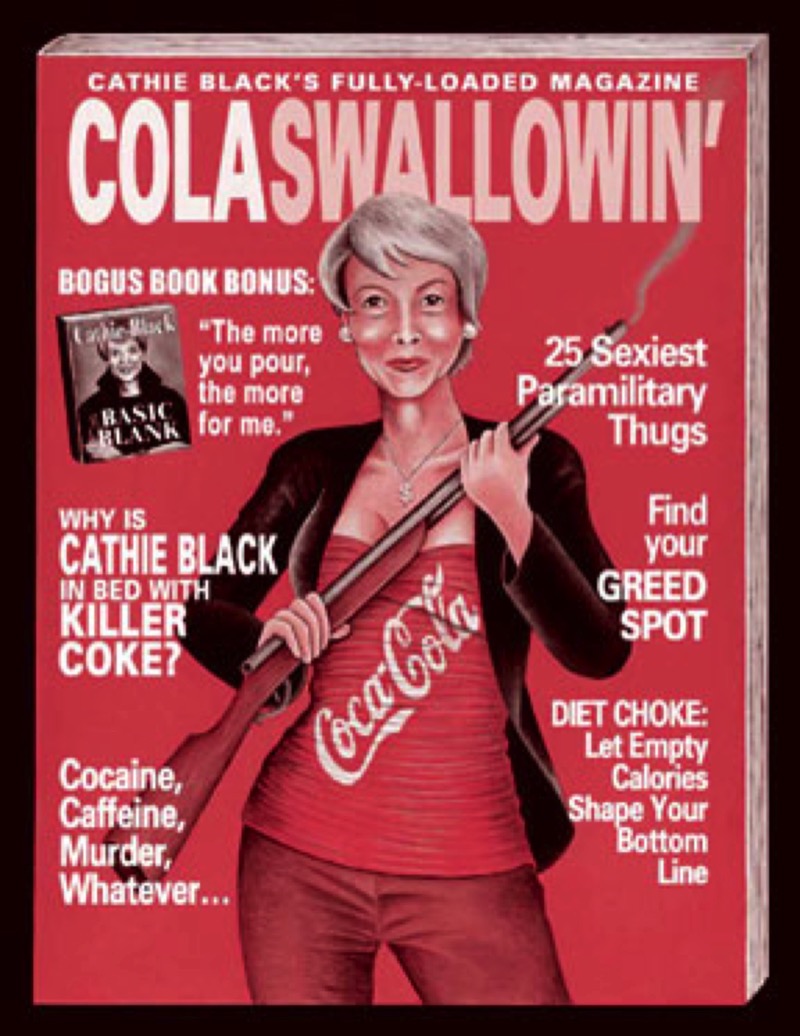
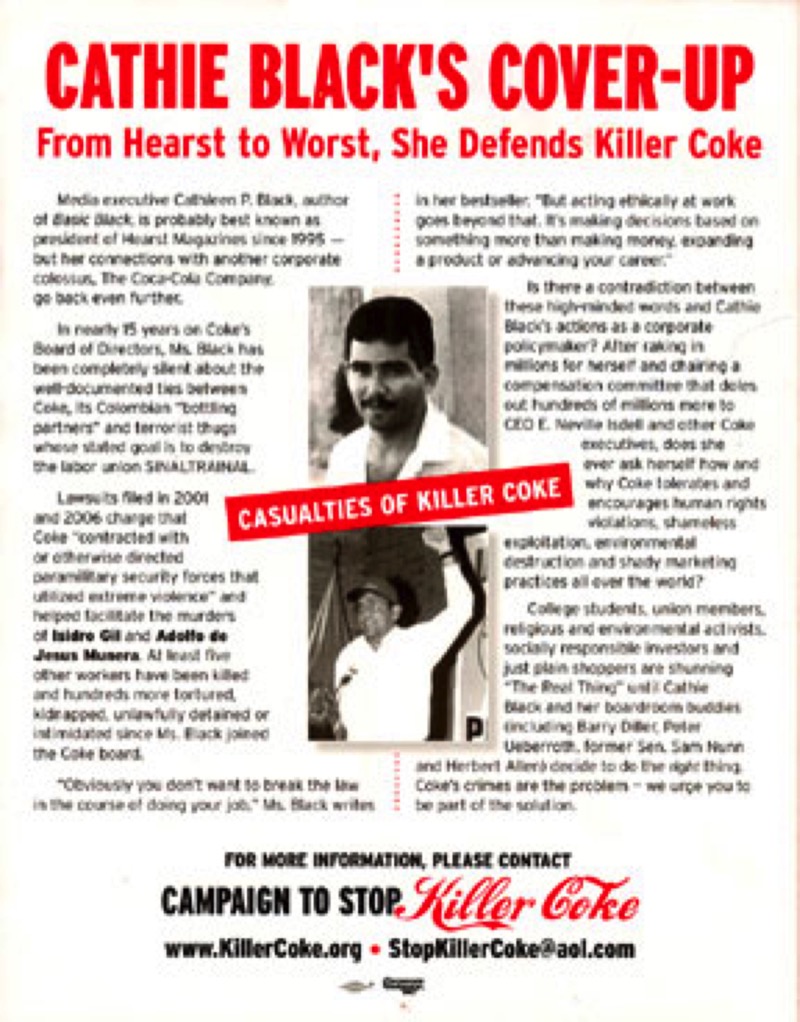
See side one of our flyer in pdf format
See side two of our flyer in pdf format
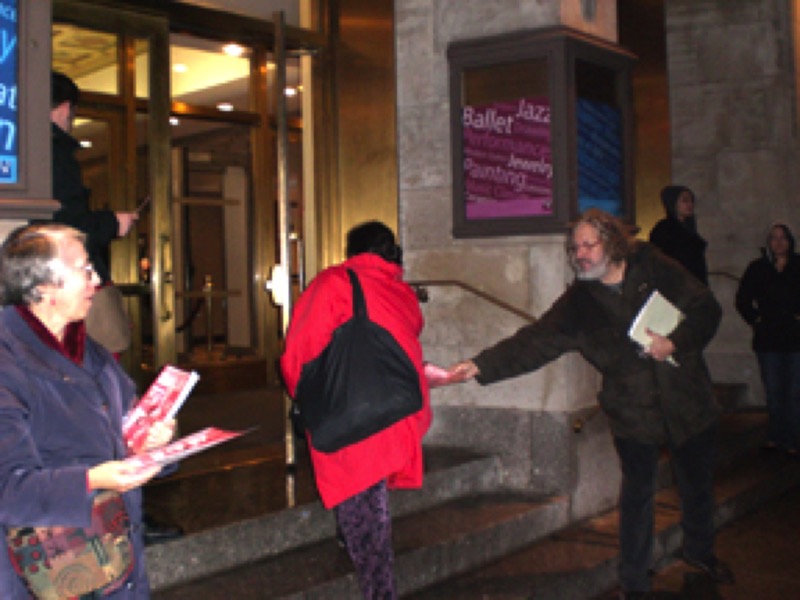
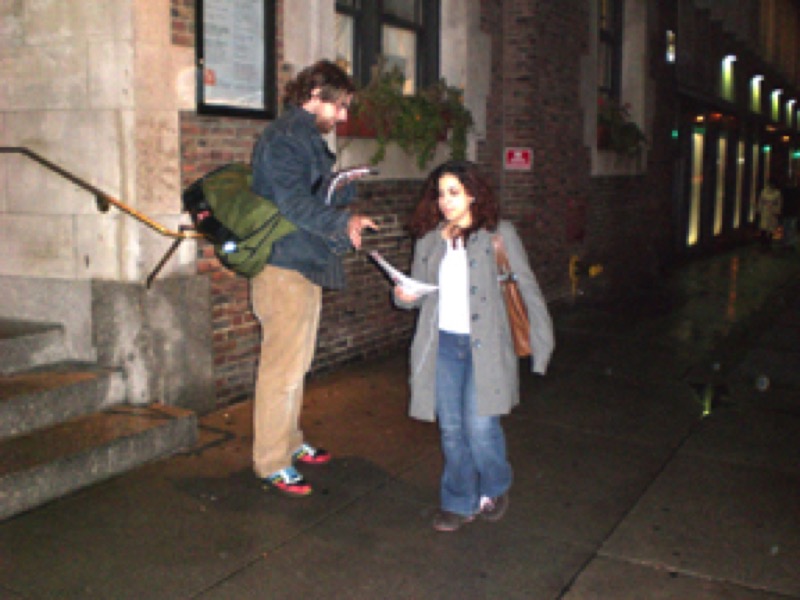
Political Affairs, "Ireland: American Transnationals Continue to Undermine Trade Union Growth," By Socialist Voice
Read Article
"Coca-Cola Ireland informed employees at the Drogheda plant in September of its decision to close in September 2008. Union representatives have inferred that the decision has been largely influenced by the fact that the Ballina plant is non-union, and that the pay and conditions of workers there are 'far inferior' to those at the unionized Drogheda plant. One TEEU [Technical, Engineering & Electrical Union] official, Arthur Hall, commented: 'This is corporate greed at its worst. This is a highly profitable operation, and it has not lost a day of production in disputes for well over a decade. The only reason why it is moving its main production to Ballina that I can see is that it has a non-unionized work force there and can ensure that less of its profits stay in the local economy.' "
Scoop Independent News-Health (New Zealand), "Aspartame Research Needed, Not Coca-Cola Soft Sell," November 26, 2007, Press Release: Soil and Health Association
Read Article
" 'Aspartame consumption has been linked to many health symptoms, including those expressed as ADHD, anxiety, depression, irritability, confusion, memory loss, insomnia, dizziness, migraines, cramps, abdominal pain, numbness or tingling of extremities, rashes, chronic fatigue, and personality changes. These same symptoms are increasingly expressed among our young people, and removal of aspartame may assist with a marked improvement in quality of life for some, their families and teachers.' "
THE MISCELLANY NEWS, "Campus groups broaden consumer choices," By Acacia O'Connor, November 8, 2007
Read Article
"Concern for the individuals involved in production is also at the heart of the Vassar branch of the Kick Coke campaign. The student-led movement is pushing to remove Coca-Cola from Vassar's campus. The campaign hopes to instead replace Coke with more socially conscionable local juices and sodas."
Plenty Magazine, "Drinking Problem: Across the country, folks are working to wean Americans off bottled water," By Dianna Dilworth, November 19, 2007
Read Article
" 'Our fundamental concern is that bottled water companies are changing the way that we think about our water and setting out to turn our water into a high priced luxury and not a fundamental human right,' says Deborah Lapidus, the group's national organizer."
The Stony Brook Statesman , "Coca Cola Defends Allegations: The Coca Cola Conundrum, November 15, 2007
Read Coke's arguments
The Stony Brook Statesman , "Students Speak Out Against Coca Cola'a Human Rights Violations: The Coca Cola Conundrum," November 15, 2007
Read Stony Brook students response
Correction: In the Students' response is an error which is in the process of being corrected by the Statesman. It reads: "Students from at least 45 colleges and universities, including Rutgers and New York University, have spearheaded movements against Coke and over 30 have kicked Coke off their campuses." It should state: "Students from some 200 colleges and universities, including Rutgers and New York University, have spearheaded movements against Coke and over 45 have kicked Coke off their campuses."
Coke: "In a country in which violence against union members has deterred all but 4 percent of workers from unionizing, 31 percent of Coca-Cola bottler employees belong to unions."
Students: "Coke lies about the percentage of Coke workers in unions; they falsely claim 31 percent. However, Coca-Cola considers that the vast majority of Coke workers in Colombia are not employees, but rather "flexible," subcontracted workers who have no chance of union representation, receive low pay and meager benefits (if any), have no job security and often are living under poverty. Due to Coke's campaign of terror directed at union leaders, only about 4% of Coke's workers in Colombia belong to unions. Recently, two groups of subcontracted workers attempted to join SINALTRAINAL, the major union representing Coke employees, but were fired."
Marketing Week (UK), "C4 accuses Coke of child labour abuse," By John Reynolds, November 15, 2007
Read Article
"Coca-Cola is due to come in for fresh criticism next week over its corporate practices following allegations of child labour and environmental abuses to be aired on television next week. The Channel 4 documentary, presented by comedian Mark Thomas, will make a series of grave charges against Coca-Cola, including the allegation that it is employing children in sugar cane plantations in El Salvador, Central America. The documentary is scheduled to be screened on Monday November 19 at 8pm on Channel 4."
The Norman Transcript (University of Oklahoma), "Former economic hit man challenges students to make a difference," November 14, 2007
Read Article
" 'Even on the OU campus, there is enormous potential for change,' he [Economic Hit Man John Perkins] said. 'The university contracts with Coca Cola and Nike, both of which need to improve their social and environmental policies,' he said."
The Llama Ledger (Simon's Rock), "Bookstore to discontinue purchase of vitaminwater," By Shanna Gregory, November 14, 2007
Read Article
"Although the sale of Coca-Cola was banned from campus last spring, vitaminwater, purchased by Coke in May, is still sold in the student bookstore. Many students are upset that despite the efforts of the Activist Collective, Coke has still maintained a hold on the Simon's Rock campus.
"First year student Mindy Isser is especially outraged. "Since we got rid of Coke, we need to get rid of vitaminwater. Just because it's bottled locally doesn't make it any better. I don't support companies with shady business practices." The Coca-Cola Company announced its intended purchase of vitaminwater's parent company, Glaceau, this summer, only months after Simon's Rock decided to stop selling the company's products."
The Seattle Times, "The newest public enemy: bottled water," By Sandy Bauers, November 12, 2007
Read Article
"Bottled water, once an icon of a healthy lifestyle, has become a pariah, the environmentally incorrect Humvee of beverages. In recent months, dissent over the once innocuous bottle of Aquafina or Dasani has grown from a trickle to a tsunami. Not just among enviros who decry the 1.5 million barrels of oil used to make a year's worth of bottles. (Plus more to transport it from, in the case of Tasmanian Rain, the end of the earth.)..."
Joseph Murphy Institute, CUNY, New York, removes its Coke vending machine
The one Coke vending machine at the Josephy Murphy Institute, part of the CUNY system is being removed thanks to Union Semester students! Thanks to the Murphy Institute for doing the right and just thing.
Here's their statement, approved by the Director of the Murphy Institute:
As an Institute of the City University dedicated to the education of union members and New York City workers, we want you to know that we are removing all Coca Cola products from vending machines in our facility. We cannot support a company in blatant violation of the basic right of all workers to organize for just, humane, and decent working conditions. In solidarity with workers in Colombia, we refuse to buy any of your products, and ask that you stop your violent reprisals against those seeking their rights as workers and as human beings.
As an individual, I must add my voice to those who object to your treatment of Colombian workers because my father worked for Coca Cola Bottling Company in Asbury Park, New Jersey for more than 40 years, and served as a Teamster shop steward for some of that time. I owe it to his memory to speak out against actions he would deplore by a a company to which he gave so much of his life.
Deborah D'Amico, Senior Program Developer, PhD
Josephy Murphy Institute
The Michigan Daily, "Activism and survival in our times," By Neil Sardana, November 8, 2007
Read Article
"Our University has been directly involved in this issue by ordering the investigation of Coca-Cola's operations in Colombia and India. However, in several steps along the process, the University administration has looked the other way on Coke's violations and has helped the company hide its crimes by creating an 'investigation process' that has not even started yet. It is important for the University community to stand up to these injustices and to speak out against the University's involvement in them. The University of Michigan Stop Killer Coke Coalition formed to challenge the administration on this issue and is working to unite the campus to finally put an end to this stain on our University's image. This is, in the end, about challenging the power of Coca-Cola and making the company recognize that it cannot continue to operate in such a disgraceful manner without consequences."
November 8 Day of Action
University of Vermont gives out apple cider and get signatures
We here at the University of Vermont promoted a day of boycotting Coca-Cola this past Thursday by giving out free hot apple cider for students in exchange for signatures for our petition. A good number of people stopped by our table and signed up to join our list serve and group here. Many of the students and faculty who stopped by supported our campaign and others seemed to change their views on coke.
Binghamton University, SUNY, New York, Holds a Funeral
Today was awesome. The procession went well and hit right at classes changes. There were about 25 people holding coffins, tombstones, signs. To top it off we had a drummer and one person dressed like death (Halloween costume). We marched to the administration building and did a talk, then marched to a prominent area and left the coffins there for a majority of the day, got signatures, and handed out info.
Three Local stations came and did interviews and put the reports on the news. We are going to have a meeting with a vending body set up ad-hoc to deal with the issue.
Pipe Dream (Binghamton University, SUNY), "Students hold Coke 'funeral' By John Jensen, November13, 2007
"A funeral procession covered the grounds of Binghamton University last Thursday, as a student group on campus took action against one of the school's major corporate partners.
"Killer Coke, a student group on campus, held a faux funeral on Thursday in an act of protest against the Coca-Cola Company for their alleged involvement in the murders of eight union leaders in Colombia."
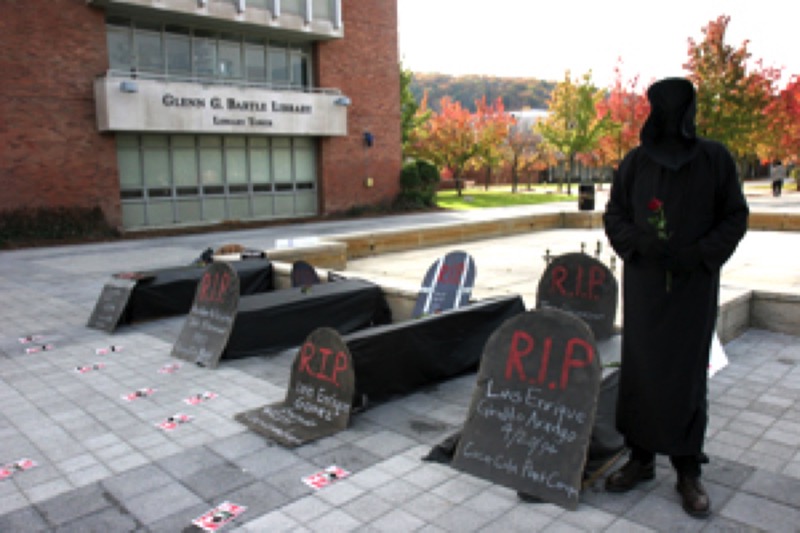
Pipe Dream (Binghamton University, SUNY), "Campus gets a wake-up call," By the Editorial Board, November 13, 2007
"Killer Coke's props were more than just posters. Their elaborate procession drew attention to their cause, and the group has continued to gain momentum for their anti-Coke mission. Given that the University's most appealing pieces of real estate (from vending machines to the New University Union) have been sold to faceless corporations, standing up to the Coke giant is an impressive goal."
Joseph Murphy Institute, City University of New York, Demonstrates at the International Labor Organization
Joseph Murphy Institute, CUNY, New York, organized a die-in in front of the New York Headquarters of the International Labor Organization.
You can also click here to see the video.
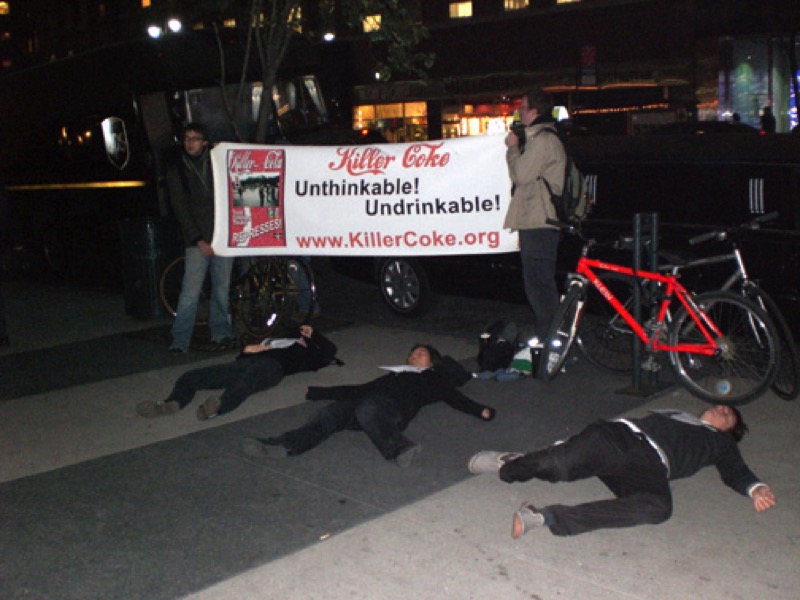
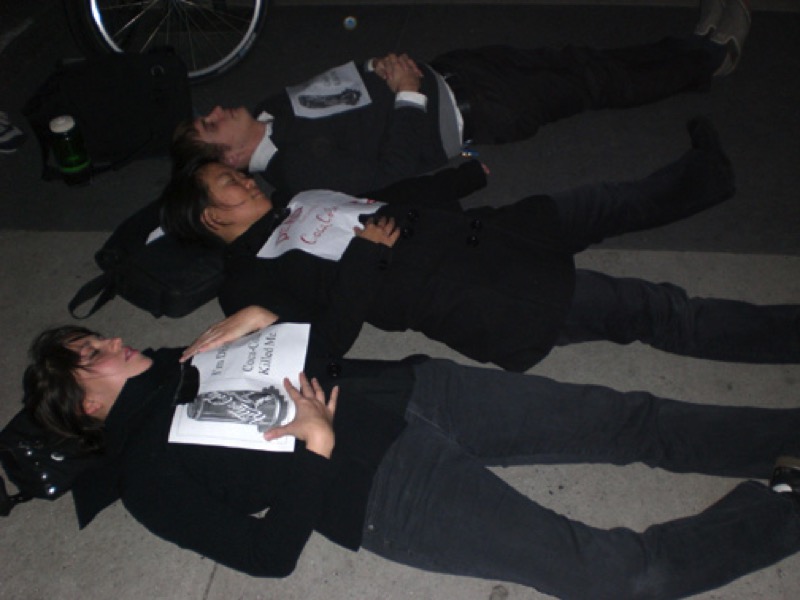
Earlham College, Indiana, Has an Alternative Drinks Party
Hey All You Amazing Anti-Coke Organizers!!!
We're havin' an awesome Alternative Drinks Party with our mascot here at Earlham! We got a pretty good turnout and people are having a good time, drinking lots of free organic soda!
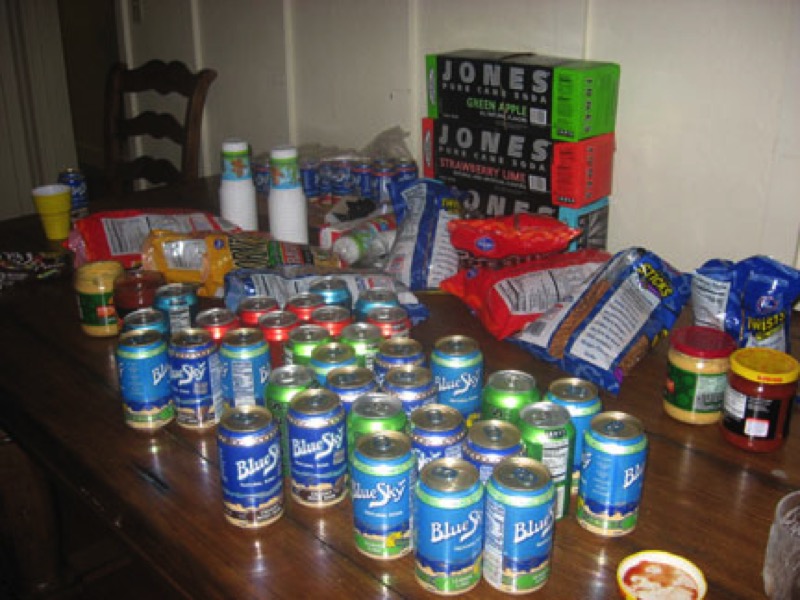
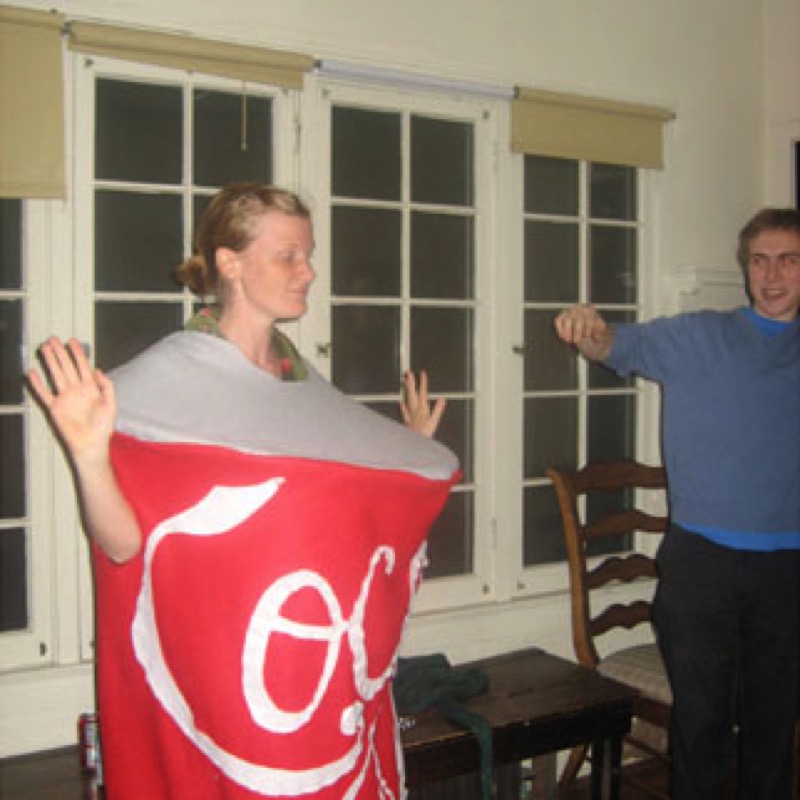
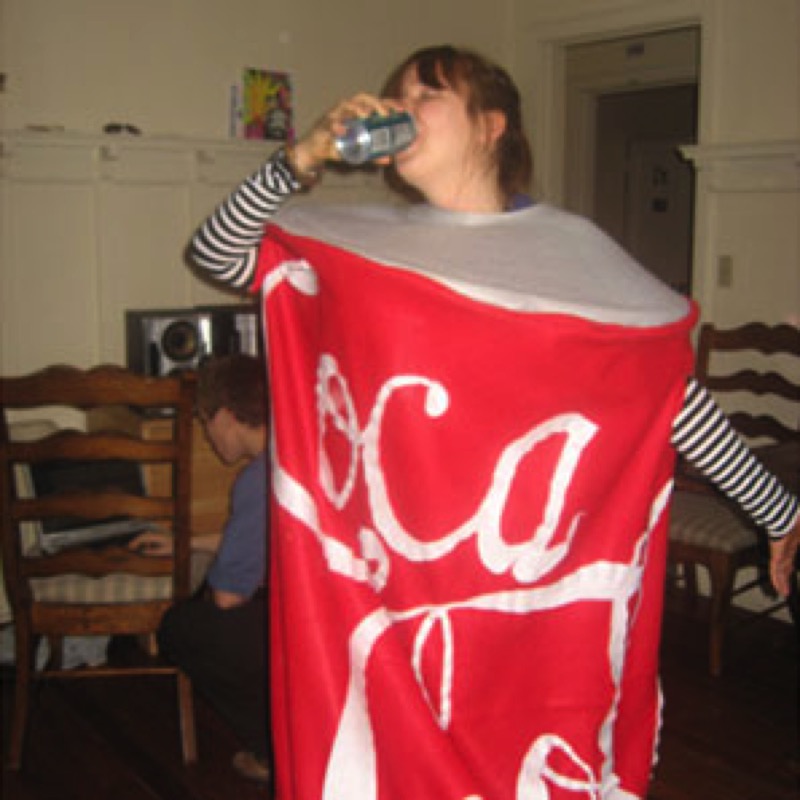
Pitzer College, California, Kicks Off Its Campaign
Today at Pitzer we began our petition drive to stop Pitzer from renewing their contract with Coke. On our first day of tabling outside the cafeteria we gave out samples of a local soda and collected over 100 signitures for our petition (Pitzer has 960 students.)
We also Chalked dead body outlines on sidewalks all over our campus and left facts about Coke near them. This created a lot of positive discussion amoung the student body.
Vassar Students, Faculty and Staff Hold Rally Against Coca-Cola
At Vassar we held a 30-40 person rally to Kick Coke today. Present were students from the Vassar Greens, Student Activist Union, Amnesty International, Vassar Green Party, MEChA, and Class Issues Alliance, as well as members of SEIU and CWA, and faculty members. We got some local media coverage as well, print, TV and radio. Should be a good rallying point for us, we are now going to kick up the pressure on our administration and begin working on taste tests for local sodas and juices to hopefully replace Coke.
Mid-Hudson News Network, "Vassar College students urge administration to remove Coke from campus," November 9, 2007
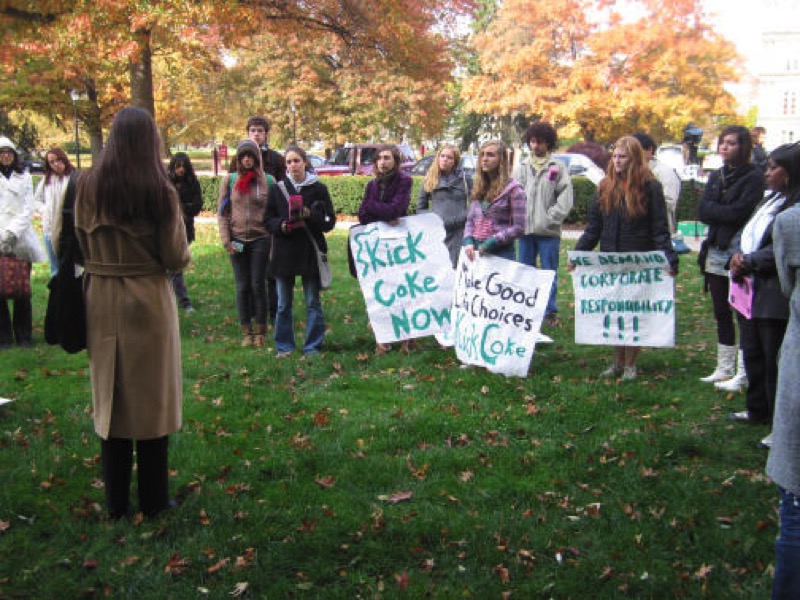
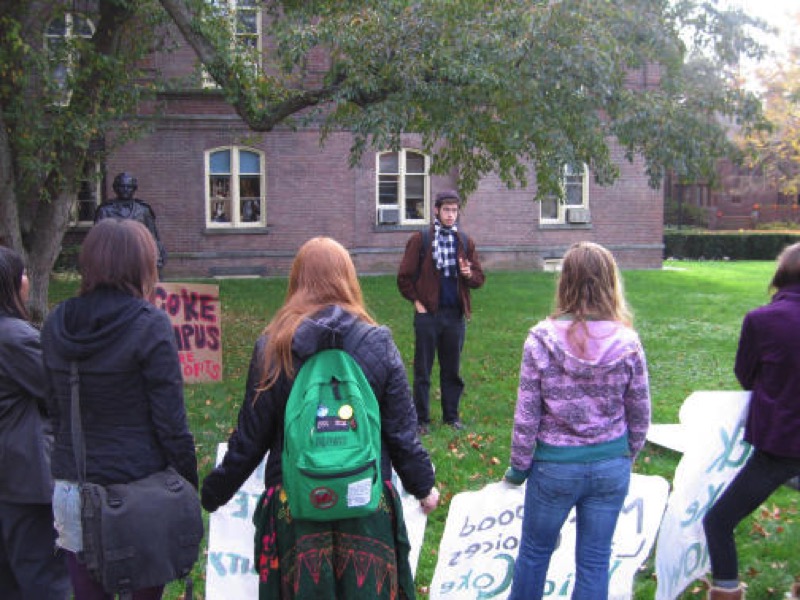
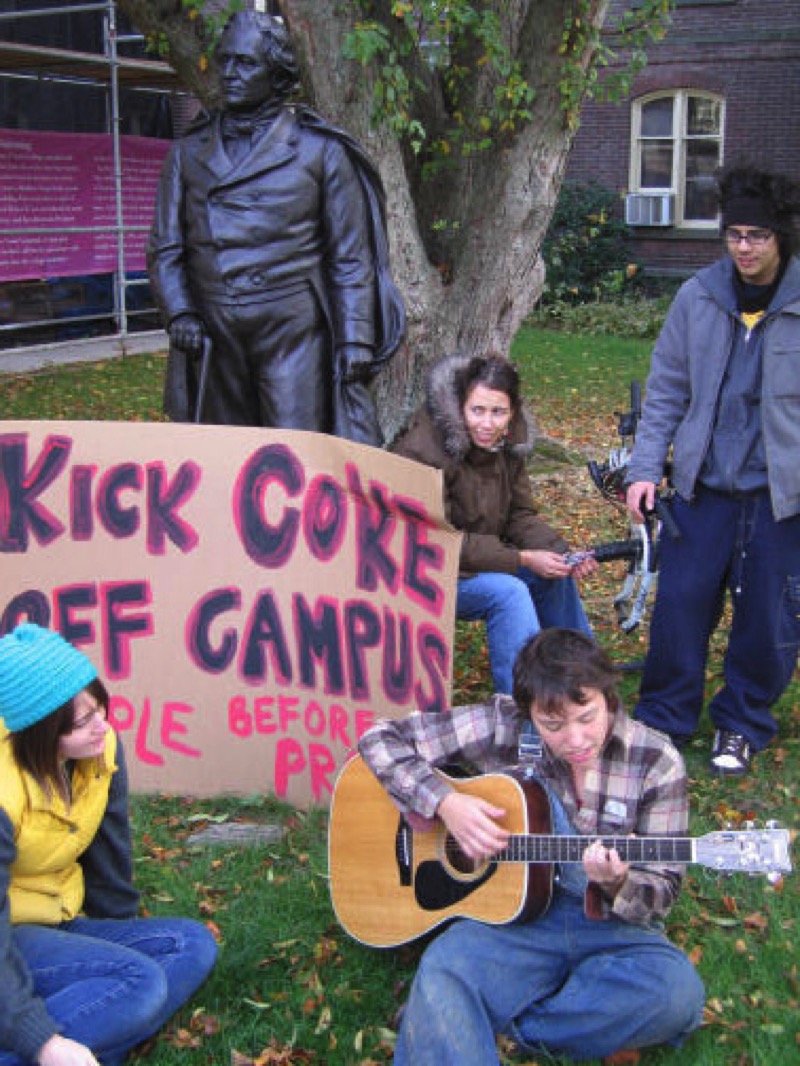
Kick Coke Campaign, Vassar College, October 2007
Read Newsletter
McMaster held a ceremony for the dead Colombian trade union leaders.
We had a ceremmony in front of our student centre paying respect to the dead trade union leaders. There was a good turnout of both undergrads and faculty. We turned a couple of heads obviously as we had very good speakers.
McMaster Campus Choice
The Daily Free Press [Boston University], "Students push for clearer labels on bottled water," By Evelyn Ratigan, November 11, 2007
"Students across the country yesterday [Nov. 7] held demonstrations to pressure the Coca-Cola Company to be more transparent about the origin of the water it uses in its bottled water product, Dasani. Demanding that the company be more clear that Dasani water comes from the same source as tap water, Corporate Accountability International - the group that organized the nationwide rallies - sponsored the Day of Action at Boston College, Tufts University and Boston University, where CAI company representatives met with environmental groups."
The Brown Daily Herald, "Protesters greet Colombian Ambassador Barco," By Leslie Primack, November 2, 2007
Read Article
University of Bath (UK) Press Release, "'US universities disturbingly over-commercialized' says new book," By University of Bath, September 27, 2007
Read Article
Universities and colleges in the United States have become "disturbingly" commercialised, according to a new analysis edited by an academic at the University of Bath, UK. Higher Education: Open for Business, edited by Christian Gilde, says that commerce has become too closely involved in academic research, classroom activities and college sports. In his introduction to the work, which has nine papers from eight authors, Mr Gilde, of the Marketing Group in the University's School of Management, says: "Some campuses seem to have abandoned ethical standard in the quest for corporate dollars.
"It is disturbing to see that today's cafeteria conversation do not center around topics such as Shakespeare or international affairs. Due to the overcommercialization of higher education, college and university students sadly start paying attention to issues such as the following: are we a Gateway or a Dell campus" Are we a Coca-Cola or a Pepsi campus" Are we a Nike or an Adidas campus""
Mr Gilde said that "commercialism has gotten too close to certain aspects of academia" and he believed this was a "dangerous development". "If universities morph, more and more, from knowledge seekers into profit seekers, we are faced with a development that will change the landscape of higher education."
BBC News, "Coke, Pepsi pay Himalayan fines," September 17, 2007
Read Article
"Coca-Cola and Pepsi have been fined by India's Supreme Court after painting advertisements on the side of the Himalayan mountains."
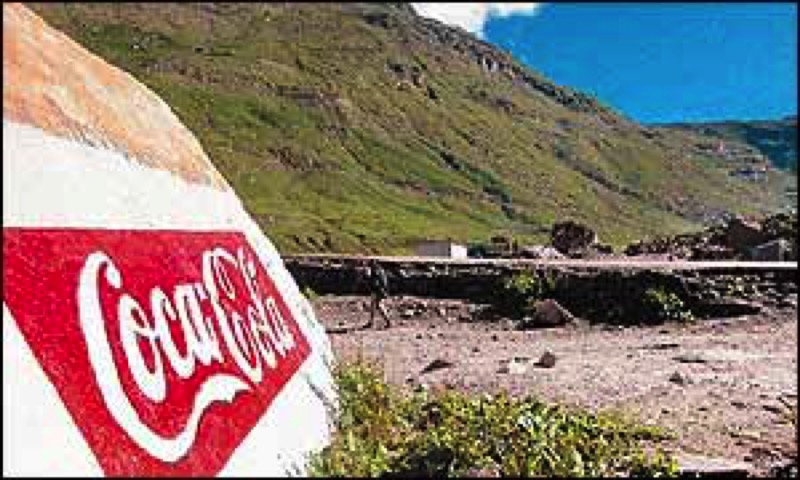
Click here to see omnipresent ads throughout Morocco.
The Journal of Cultural Anthropology, Society for Cultural Anthropology, November 2007 (Volume 22, Number 4)
Read Articles in Cultural Anthropology
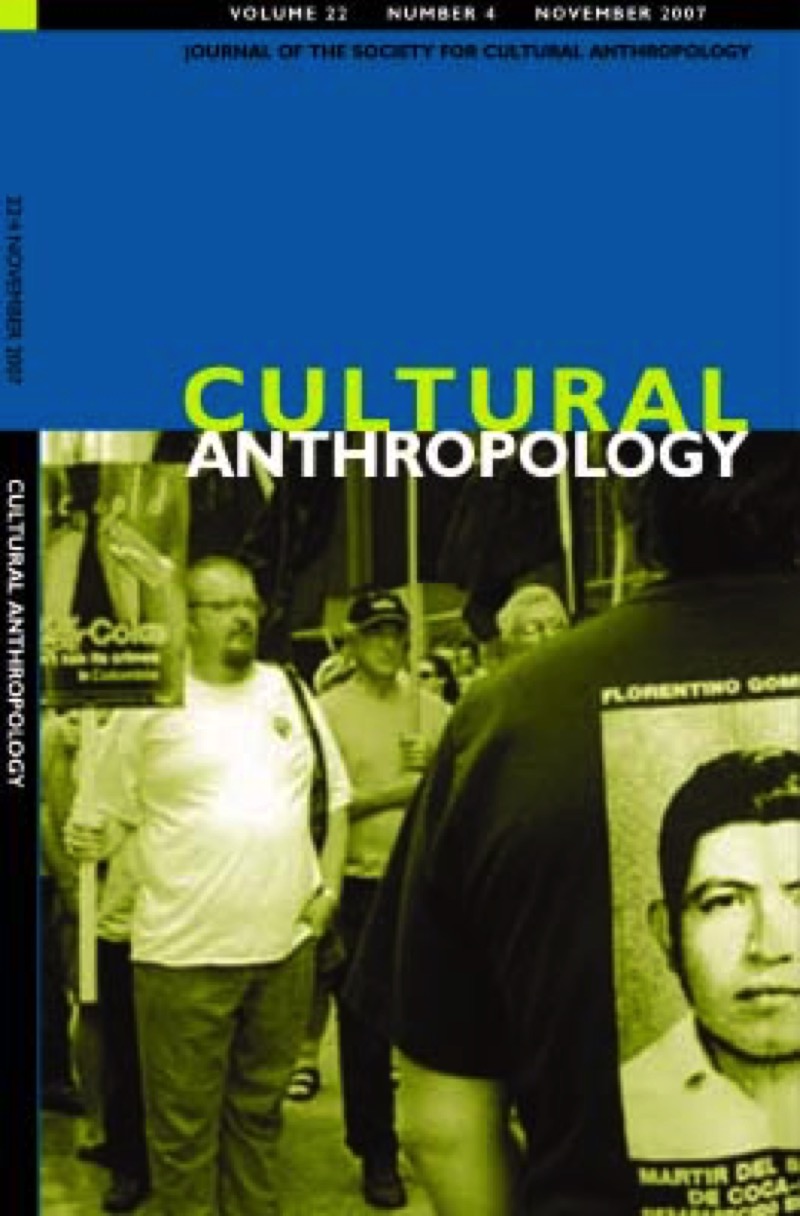
In spring 2006, the American Anthropological Association and a number of its sections, including the Society for Cultural Anthropology (SCA) and the American Ethnological Society, endorsed boycott actions against The Coca-Cola Company (Download Resolution). The endorsement was based on a growing anthropological record of problems associated with The Coca-Cola Company. The editors of SCA's journal, Cultural Anthropology then issued a call for papers that addressed various aspects of what they had come to think of as "the Coke Complex" - the multiplicity of examples, practices, organizational forms and political economic dynamics that enable and index The Coca-Cola Company and the so-called "New Economy" in which Coca-Cola now operates. Their goal was to collect a set of diverse essays - not necessary focused on The Coca-Cola Company itself - that co uld leverage anthropological insight in helping readers understand the many different ways that The Coca-Cola Company, the global beverage industry and the global economy writ large "work," often with unjust and environmentally unsustainable effects. This collection of essays on "The Coke Complex" is now available, in the November 2007 issue (Volume 22, Number 4) of Cultural Anthropology.
Drawing on rich ethnographic and historical material, the essays move from Mexico to India, from the U.S. to New Guinea and Fiji, examining the business and cultural practices of the global beverage industry. Each essay untangles multiple connections - between struggles over water rights, cultures of consumption, and new political strategies of activist and non-governmental organizations, for example - that demonstrate how Coca-Cola, the global beverage industry, and the global economy writ large work, often with unjust and environmentally unsustainable effects.
Counterpunch, "Huitepec, the Mayan Hill of Water: Coca-Cola's Raid on a Sacred Mountain," By John Ross, September 7, 2007
Read Article
"Coca Cola is a hydration company - without water we have no business," an in-house document " Our Use of Water" unearthed by the NGO War on Want, bluntly states. Chiapas, the source of 65% of southern Mexico's water, figures prominently in Coca's plans. To underscore its mission, Coca-Femsa has obtained a 20 year concession from the city of San Cristobal, which claims jurisdiction over Huitepec water, to siphon off five liters a second of the precious fluid for the next generation, for the manufacture of its noxious brew and the commercialization of bottled water whose plastic husks have become the most littered item on Planet Earth.
"San Cristobal's claim to ownership of Huitepec water is contested by the Tzotzil Maya in neighboring villages. Indeed, under the provisions of the International Labor Organization's Resolution 169 (OIT 169 by its Spanish initials), the legal benchmark for what defines Indian territory (habitat) and territoriality (what goes on in that territory), Huitepec is the collective property of the people who live on this land...
"The neo-liberal icon that sucks up Huitepec's bountiful water, the Coca Cola Corporation of Atlanta Georgia, is a powerful political player in Mexico - former president Vicente Fox was president of Coca-Mexico before he became president of Mexico. Mexicans drink more Coke per capita than any other nation on earth and Chiapas and its Indians are an important market. One reason for heavy sales in Los Altos: Coca Cola is often the only option to scarce or undrinkable local water."
USA Today, "Murder and payoffs taint business in Colombia," By David J. Lynch, October 30, 2007
Read Article
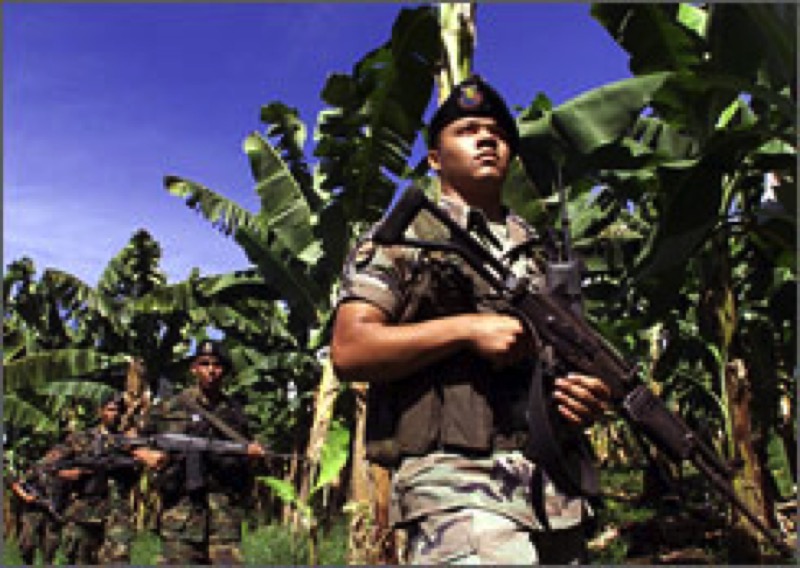
"A 'Killer Coke' campaign by activists aims to drive Coca-Cola (KO) off U.S. college campuses over the killings of union leaders at four of its bottling plants in Colombia. Since April 2003, 45 campuses, including Rutgers University and Smith College, have switched from Coke, says Ray Rogers, the veteran labor strategist who leads the campaign."
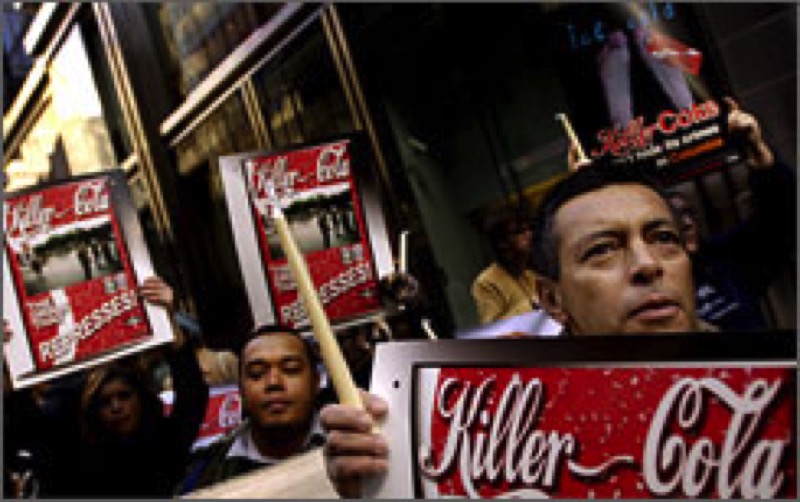
Colombian labor organizer Luis Cardona, protests
in New York in 2005. Protesters alleged that
Coca-Cola hired paramilitary death squads to
terrorize labor leaders in Colombia.
ABC News, "Consumer groups bite back on a global scale," By Christopher Zinn, November 1, 2007
Read Article
"The bad drinks marketing award went to Coca-Cola for repackaging tap water."
ABC News, "Coke, Kellogg's cop Bad Product Awards," By Christopher Zinn, October 30, 2007
Read Article
"An international network of consumer groups has named several companies, including Coca-Cola, Kellogg's and Mattel, as the worst brands when it comes to abusing consumer rights around the world."
Center for Science in the Public Interest Press Release, "Groups Announce Global 'Dump Soda' Campaign," October 29, 2007
Read Article
"An international coalition of consumer organizations announced the formation of the Global 'Dump Soda' Campaign to call attention to the marketing of sugary soft drinks and other high calorie beverages linked to the world-wide childhood obesity crisis."
"What Happens To Your Body Within An Hour Of Drinking A Coke" by Nutrition Researchers on October 24, 2007
Read Article
"Don't drink cola if you want to be healthy. Consuming soft drinks is bad for so many reasons that science cannot even state all the consequences. If you do drink soft drinks, as well as other sugary foods, you need the two products listed at the bottom of this article...
"The main problem is sugar. It's an evil that the processed food industry and sugar growers don't want people to know about. Even dietitians, financially supported by sugar growers and sugary product manufacturers, are loathe to tell us the truth...
"So there you have it, an avalanche of destruction in a single can. Imagine drinking this day after day, week after week. Stick to water, real juice from fresh squeezed fruit, and tea without sweetener."
GSEU Rank and File, "GSEU Successfully Lobbies GSO Senate to Make the Ethical Beverage Choice," October 23, 2007
"Wednesday, October 17, 2007 (Stony Brook) - Members of the Graduate Student Employees Union (Stony Brook) successfully advocated for a motion of the Graduate Student Organization (GSO) Senate to ban Coca Cola from its meetings joining GSEU and United University Professionals, the faculty/staff union at Stony Brook, the GSO Senate as the third representative body to ban Coca Cola from their meetings at Stony Brook University."
Conde Nast Portfolio, "The Banana War," by Kevin Gray, October 2007
Read Article
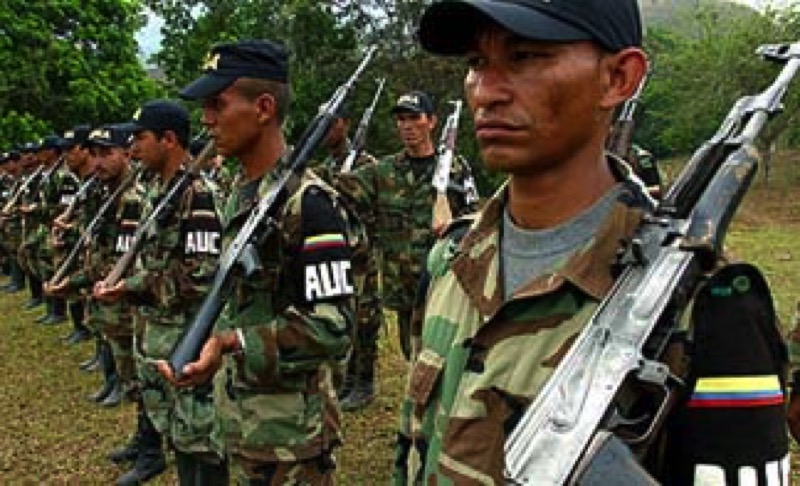
Photograph by Scott Dalton
"In Colombia, multinational companies' ties with the A.U.C. are part of an ongoing investigation that is gripping that country as intensely as Watergate did the U.S. The links between Colombia's political and military elite and the paramilitary group have so far led to the arrest of more than a dozen current and former Colombian congressmen--and now those connections are threatening to bring down the government of President Alvaro Uribe, the United States' closest ally in South America.
"The widening scandal may engulf other U.S. firms doing business in Colombia. Two jailed leaders of the A.U.C. (which agreed to disband last year) have testified in Colombian courts that many multinational corporations operating in Colombia paid them off. Congressman Bill Delahunt, a Democrat from Massachusetts who is leading a House subcommittee investigation, told me he plans to call the Coca-Cola Co., Nestle, Occidental Petroleum, and Drummond (an Alabama mining outfit), among others, into congressional hearings to explore accusations that they or their business partners also funded the A.U.C. or other groups."
The Phoenix (Loyola University Chicago), "Letter to the Editor: Coca-Cola: Student reprimands Loyola's support of a company 'directly involved' in South American violence," By Micah Uetricht, October 24, 2007
Read Article
"When I discuss the alleged crimes of the Coca-Cola corporation brought forth by citizens from India and Colombia with people, they are shocked. How, they seem to wonder, could murder, kidnapping, torture of union members in Colombia and the poisoning and drying up of groundwater that rural Indian citizens drink be connected to such an innocuous bottle of carbonated sugar water? The question is a good one. First, the facts..."
The Phoenix (Loyola University Chicago), "Students question Coca-Cola contract: USGA petitions Loyola to consider a more ethical corporation," By Anthe Mitrakos, October 24, 2007
Read Article
"Loyola's Unified Student Government Association recently passed its own resolution, saying, 'We...also hear and convey the student call to not renew the beverage contract with Coca-Cola, based on the documented human rights violations at their bottling plants and their failure to comply with requests for independent investigations.' It continued, 'We believe that...we have an imperative as a center of higher learning to not support businesses...with documented human rights violations.' "
Loyola University Chicago Unified Student Government Association Resolution calling for an end to the Coca-Cola contract at the university (Passed)
Read Resolution and Letter
"We, the Unified Student Government Association, also hear and convey the student call to not renew the beverage contract with Coca-Cola, based on the documented human rights violations at their bottling plants and their failure to comply with requests for independent investigations. When students actively and intelligently express their wishes to the administration, they deserve to have these imperatives met because they are the group directly impacted by the administration's choices."
India Resource Center Press Release, "Community Protests Coca-Cola Plant in India: Community Files Police Report Accusing Coca-Cola of Water Theft and Pollution," October 25, 2007
Read Press Release
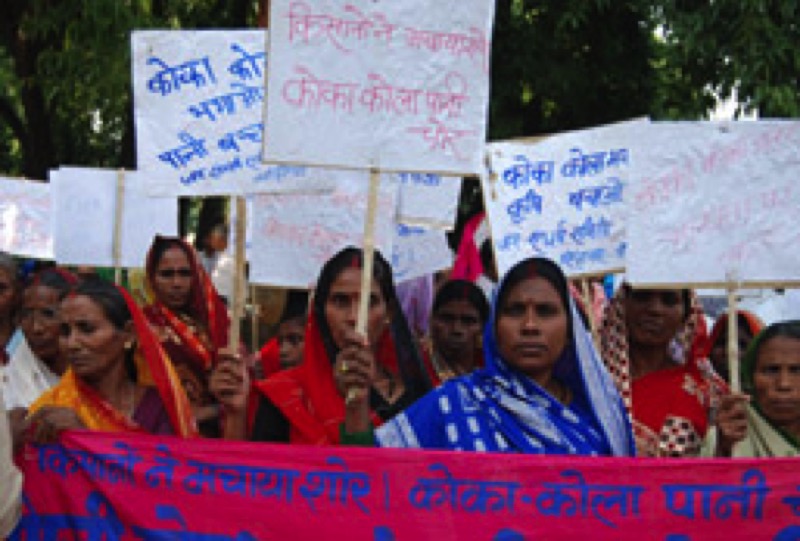
Over 600 people marched and rallied against the Coca-Cola bottling plant in the village of Sinhachawar in Ballia district in India yesterday, demanding that the plant be shut down permanently. The community has accused the bottling plant of pollution and also illegally occupying land held by the village assembly. A visit by community members to the factory premises in May 2007 found the bottling plant indiscriminately dumping its hazardous waste inside and outside the factory premises."
Pipe Dream (Binghamton University), "Anti-Coca-Cola group mobilizes at BU," By Marina Gaft, October 19, 2007
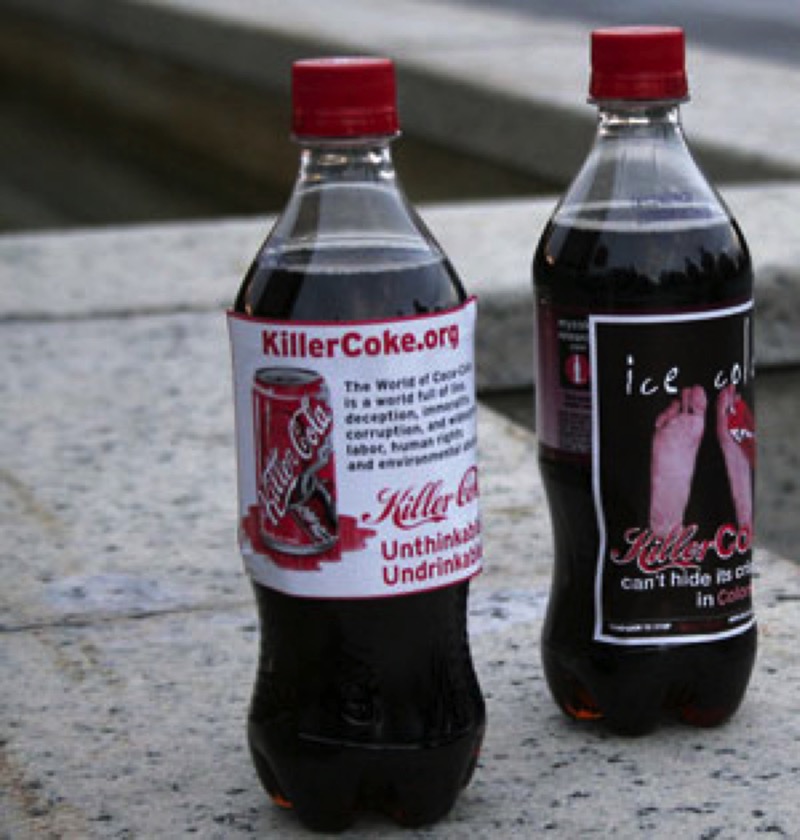
Photo by Jessica Jakoby
"A growing movement on campus is calling for Binghamton University to cancel its contract with Coca-Cola and for the company to be kicked off campus for good. In recent weeks students across campus have been passing out Killer Coke fliers, detailing crimes committed by the company in its Colombian bottling plants."
India Resource Center, "Criminal Charges Against Coca-Cola Likely in India," October 15, 2007
Read Article
"The state government of Kerala has initiated the process of filing criminal charges against the Coca-Cola company for pollution. In a notice to the Coca-Cola company on Friday, October 12, the Kerala State Pollution Control Board has asked the company to show cause as to why a criminal case should not be filed against it for polluting the environment."
Donald Rumsfeld, once president of Searle Laboratories and Secretary of Defense under George W. Bush, along with Pres. Reagan, used their political clout to force the FDA to pass aspartame, a dangerous artificial sweetener, in thousands of products including Diet Coke. One of the following videos concentrates on the dangers of aspartame while the other discusses Rumsfeld's involvement in its being used in food
Fox News, "Fox Nutrasweet Equal Aspartame," Video
Click above or click here to see video on the dangers of Aspartame
Rumsfeld Aspartame, Video, Excerpt from "Sweet Misery: A Poisoned World", See Trailer
Click above or click here to see video on Donald Rumsfeld's involvement in FDA approval of aspartame
MSNBC, Video, On water, thinking outside the bottle
Americans are urged to choose tap water because of the ecological toll of bottles. NBC's Anne Thompson reports.
See Video
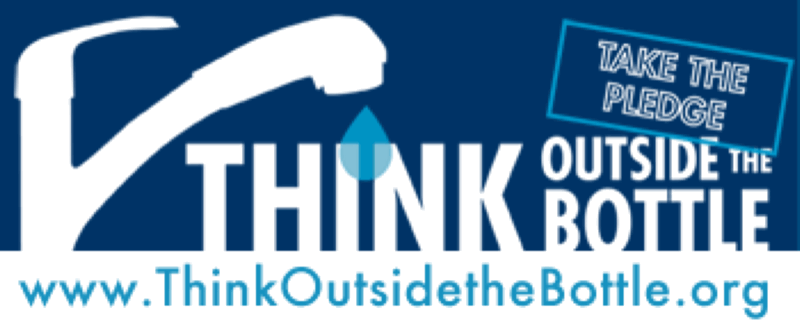
Click here to take the www.ThinkOutsidetheBottle.org pledge
Bottled water corporations are changing the very way people think about water. Though many bottled water brands come from the same source as public tap water, they are marketed as somehow more pure. What's more - bottled water corporations sell water back to the public at thousands of times the cost. Plastic bottles also require massive amounts of fossil fuels to manufacture and transport. Billions of these bottles wind up in landfills every year.
You can help reverse this trend. At events and over online networks thousands are supporting the efforts of local officials to reduce the environmental harm of bottled water by prioritizing public water systems. Taking the Think Outside the Bottle Pledge is quick, easy, and sends the message that water is a human right, not a commodity.
Click here for more on the Bottled Water Scam
The Advocate, "Jazz and Capitalism, or, 'I Want to Get Jazzed!' " By Mark Schiebe, October 2007
"While Dizzy's Club Coca Cola certainly isn't the first venue to take advantage of the desire of the wealthy to consume some high culture along with their dinner (Birdland, The Iridium, and The Blue Note are all restaurants masquerading as jazz clubs), Dizzy's Club Coca Cola represents a disturbing new honesty about the relationship of jazz and corporate sponsorship. Yes, Coca Cola put up the ten million 'leadership grant' to build it, but (at the risk of sounding totally naive) did they have to demand inclusion in the name of the club itself? Wouldn't a few plaques spaced out within the club been more tasteful? While there are certainly precedents for this in many other areas of entertainment (think sports stadiums), to my knowledge this is the first jazz venue to be named after a corporation, and it is more than likely that others will follow suit, or otherwise risk losing the dollars of the wealthy residents and tourists who want the best 'jazz experience' money can buy, and one that comes complete with a slogan they can take home with them. (This was provided by the 'I want to Get Jazzed' postcard handed to each customer). After all, there is only one way to build a venue that could rival this one, and that is to woo another corporate sponsor. As one Village Voice commentator put it, 'Somewhere up in heaven, John Birks Gillespie just hocked a loog in his Coke.' "
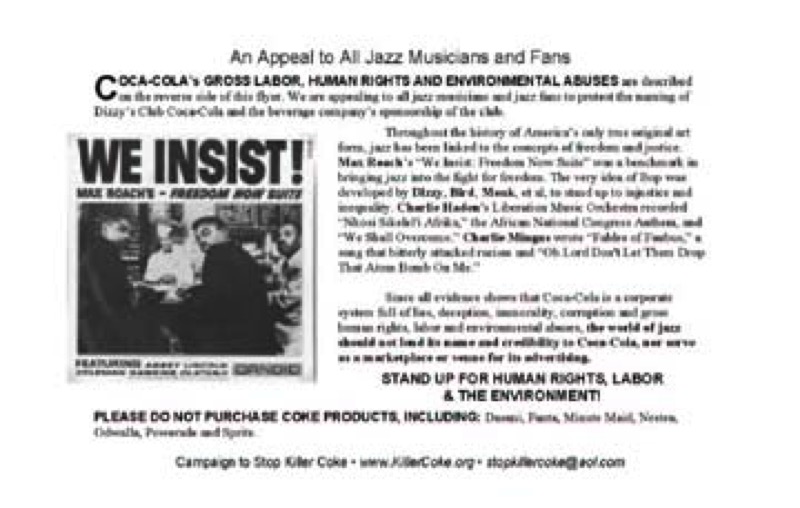
Read the leaflet prepared for Dizzy's Club Coca-Cola's opening
Excerpts from the leaflet:
"Throughout the history of America's only true original art form, jazz has been linked to the concepts of freedom and justice. Max Roach's "We Insist: Freedom Now Suite" was a benchmark in bringing jazz into the fight for freedom. The very idea of Bop was developed by Dizzy, Bird, Monk, et al, to stand up to injustice and inequality. Charlie Haden's Liberation Music Orchestra recorded "Nkosi Sikelel'i Afrika," the African National Congress Anthem, and "We Shall Overcome." Charlie Mingus wrote "Fables of Faubus," a song that bitterly attacked racism and "Oh Lord Don't Let Them Drop That Atom Bomb On Me."
"Since all evidence shows that Coca-Cola is a corporate system full of lies, deception, immorality, corruption and gross human rights, labor and environmental abuses, the world of jazz should not lend its name and credibility to Coca-Cola, nor serve as a marketplace or venue for its advertising."
the stony brook Statesman, "New Tactics by The Coke Campaign: Phone Calls To Administration Begin," By Adam Peck, October 8, 2007
Read Article
"The campus campaign against Coca Cola has begun a new tactic that has proven to be successful on other college campuses. On Wednesday Oct. 3, the Social Justice Alliance lined the walkway between the Student Activities Center and the zebra path and encouraged students to call the office of the president directly and demand that Coca Cola be kicked off campus. Campaign leader Anita Halasz estimated that roughly 20 students called on the spot and several more people to call after the event took place."
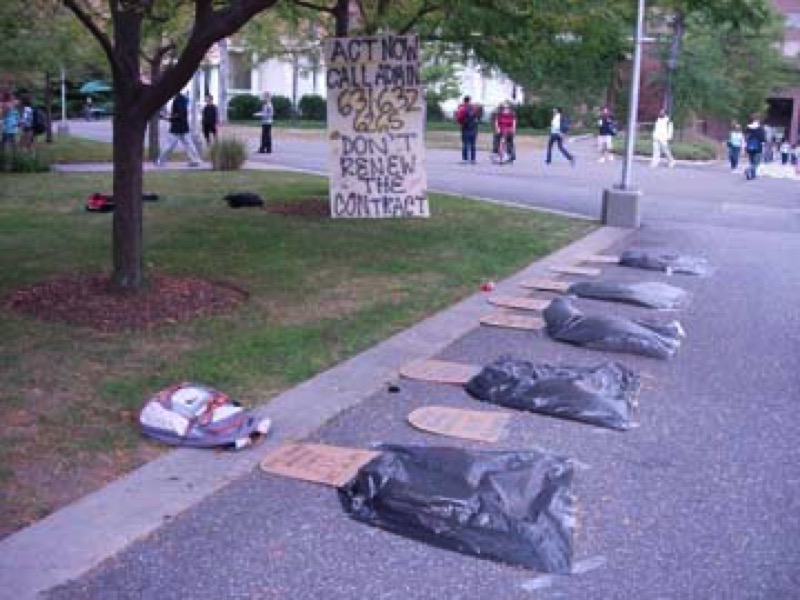
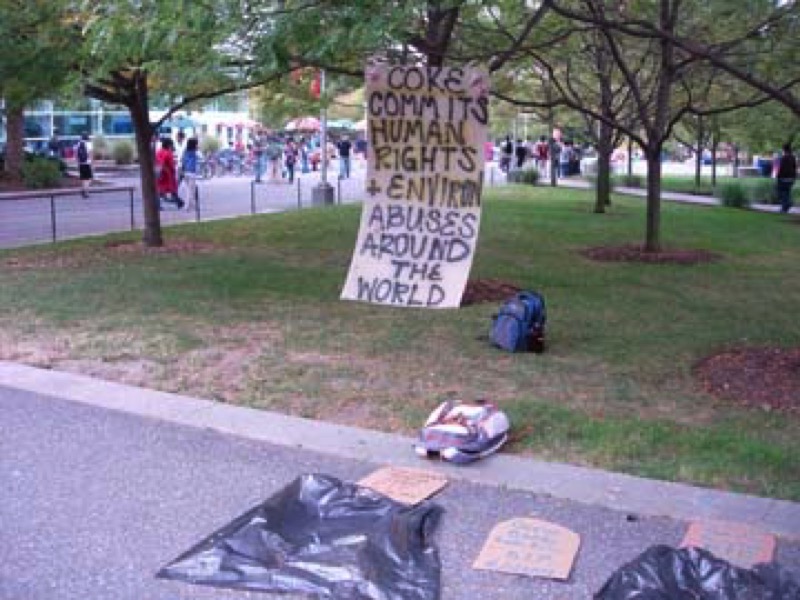
SUNY Albany, Killer Coke Press Conference, April 2, 2007
Watch Press Conference
The Phoenix, (Loyola University, Chicago), "No Coke on campus, please: Letter to the President [of Loyola]," October 3, 2007
Read Letter
"...I have recently returned from Colombia and have become aware of human rights violations facing many union activists in this country. In saying this, I would like to call to attention the justice implications of the Coca-Cola products sold on both Water Tower and Lake Shore campuses."
The Daily Gazette, Swarthmore College " Coke Decision Pushed Back as Dialogue Continues," By Lauren Stokes, September 27, 2007
Read Article
The Phoenix, Swarthmore College, "Kick Coke to present their case to Board of Managers," By ELena Chopyak, September 27, 2007
Read Article
The Daily Gazette, "Swarthmore College, "India Resource Center Defends Kicking Coke," By Amit Srivastava, September 26, 2007
Read Article
Inside Higher Ed, "Back to a Diet of Coke?" By Elia Powers, September 26, 2007
Read Article
The Phoenix, "Campus decision to kick coke under reconsideration," By Elena Chopak, September 20, 2007
Read Article
"Ruth Schultz '09, one of the Kick Coke organizers, said the group did not expect that the Board would be able to reconsider the college's move to eliminate Coke products from campus. 'At first we were sort of surprised because we didn't know that the Board had that kind of authority. Now we are questioning the role of the Board of Managers to overturn the results from a two-and-a-half year campaign,' Schultz said...
" '"[Coke] say[s] a number of things that just aren't true [said Campaign to Stop Killer Coke Director Ray Rogers]. They try to besmirch the information we put out concerning labor, human rights and the environment,' Rogers said. Rogers said that he is willing to meet with Coca-Cola at any kind of venue, forum or committee. 'Coke will not go head to head with me in any venue,' Rogers said.
"Among other examples, Rogers cited KLD Research and Analytics, Inc.'s decision to drop Coca-Cola and two of its largest bottling companies from its index of socially responsible funds as evidence of Coca-Cola's labor and environmental violations. KLD Research and Analytics is an independent investment research firm in Boston that creates a Broad Market Social Index, that, according to KLD's Web site, identifies 'the best environmental, social and governance performers.' "
The Sun News (Santa Fe, NM), "Stop Killer Coke's Worldwide Abuses," By Ray Rogers, September 16-29, 2007
This article, prepared by our Campaign, is on the front page of The Sun News, page 2 of the pdf, third paragraph.
Carpenters Union Local 405, Local 22 and the Northern California Regional Council vote to ban Coke
Carpenters Union Local 405 Field Representative Jorge Moreno reported that his local adopted a resolution to ban Coke products from all meetings and events. At their recent summer picnic with 1,100 members and family, the event was completely Coke-free.
He also reported that Carpenters Local 22 and the Northern California Regional Council also adopted the resolution to ban Coke products. Local 405 and Local 22 are among ten largest locals in the United Brotherhood of Carpenters. The Northern California Regional Council has 40,000 members.
Read Resolution
Democracy Now! "The Bottled Water Lie: As Soft Drink Giant Admits Product is Tap Water, New Scrutiny Falls on the Economic and Environmental Costs of a Billion Dollar Industry," August 1, 2007
Watch Democracy Now
Gigi Kellett. Associate Campaigns Director at Corporate Accountability International joins us in Boston. The group is spearheading the Think Outside the Bottle Campaign.
Michael Blanding. Freelance journalist and author of the article for Alternet.org "The Bottled Water Lie" and "The Case Against Coke" for The Nation
Alan Snitow. Award-winning documentary filmmaker and journalist. His films include "Thirst", "Secrets of Silicon Valley", and "Blacks and Jews". Co-author of "Thirst: Fighting the Corporate Theft of Our Water.
Daytona Beach News-Journal, "Message in a bottle: Plastic 'souvenirs' raise recycling concerns, By Jim Haug, September 18, 2007
"The Container Recycling Institute estimates that four out of five plastic water bottles end up in a landfill or incinerator instead of getting recycled. The city's bottles are recyclable but are not made from recycled materials. Of all the recyclable materials, plastic takes the longest to decompose, said John Anguilli, the interim director of solid waste for Volusia County.
"The other knock against water bottles is that they use up a precious resource. The Earth Policy Institute reported that 1.5 million barrels of oil a year are needed to manufacture the nation's water bottles, a figure that doesn't include the oil needed to transport the bottles."
The Daily Texan, "Watchdog group protests bottled water companies on West Mall," By Anita Avram, September 17, 2007
Read Article
"A few members of the organization [Corporate Accountability International] set up a table to conduct a water taste test. Participants received four cups of water, one filled with tap water and the remaining three cups filled with a different brand of bottled water. Participants then guessed which cup had which water. 'These bottled waters are indistinguishable in quality from tap water,' former UT professor John Williams said after taking the taste test...'These bottled water companies are making a lot of money by hoodwinking the public into thinking their water is cleaner and purer.' "
The Daily Evergreen (Washington State University), "Anti-Coke protest draws attention: The Anti-Coke demonstration draws attention at Campus Involvement Fair," By Alex Schwappach, September 13, 2007
Read Article
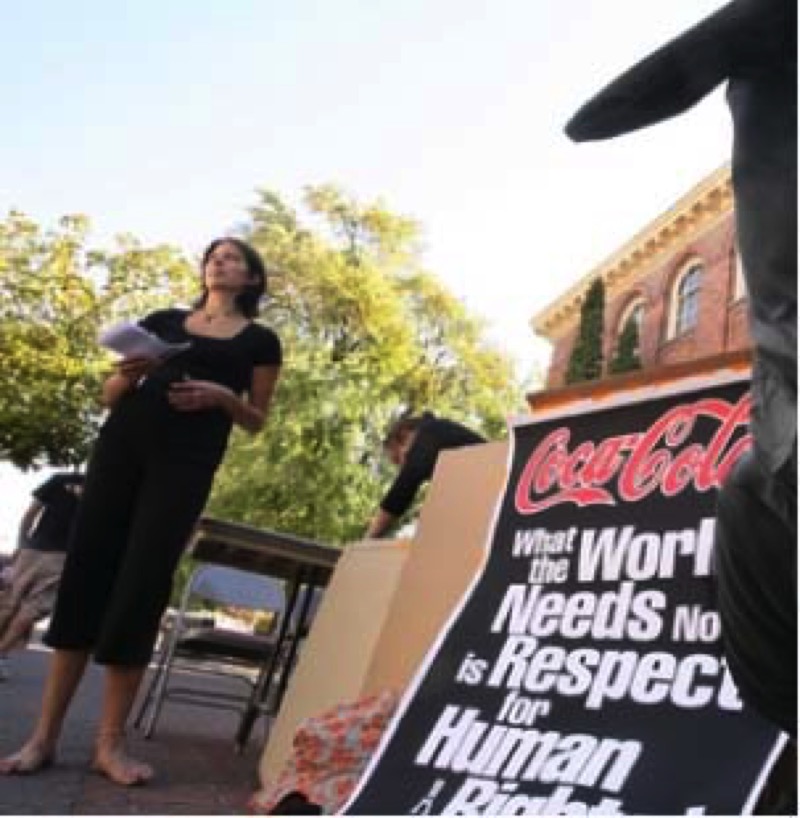
"Members of the Progressive Student Union gathered Wednesday on the Glenn Terrell Mall during the Campus Involvement Fair to protest alleged environmental and human rights abuses committed by Coca-Cola [Co.] 'As an institution of higher education, we should be wary of putting the WSU name behind the poor ethics of the Coca-Cola brand,' event co-organizer Andrew Goodin said."
Gatehouse News Service, "Coke protests state contract with Pepsi: Coca-Cola claims Illinois ignored its proposal," By Mike Ramsey, September 12, 2007
"The state's recent decision to award an exclusive vending contract to Pepsi has left a bad taste with rival Coca-Cola officials, who have challenged the pending deal.
"The centralized deal with Pepsi would cover state buildings, parks, interstate rest stops and prisons under the jurisdiction of Gov. Rod Blagojevich's administration but not Springfield's state Capitol complex, which is under the secretary of state's office. It also would include vending rights at the Illinois State Fair.
"The four universities that would take part in the Pepsi deal are Northeastern Illinois University in Chicago and the University of Illinois campuses in Champaign-Urbana, Springfield and Chicago. The Champaign-Urbana campus has had an exclusive vending agreement with Coke, university spokesman Thomas Hardy said. Although the universities can still opt out of the Pepsi-only deal, the U of I intends to participate, Hardy said."
Read Aug. 6 Press Release from Coalition Against Coke Contracts
ACR News, "Coca-Cola gulps down fine for ammonia leak at plant," September 12, 2007
Read Article
"Coca-Cola swallowed a $4,400 fine for waiting nearly three days before telling authorities about an ammonia leak from a refrigeration system at its Bellevue plant."
Read EPA Press Release
the Justice (Brandeis University), "EDITORIAL: Drink straight from the tap," September 11, 2007
Read Editorial
"It is our job as a university to lead the way. As Brandeis demonstrates its commitment to the "greenification" of its campus with the construction of environmentally sustainable buildings, now is the perfect time to show that our community, not just our architects, is dedicated to preservation. The tradeoff is easy: Give up the tap water that the Coca-Cola company puts into bottles for you, and drink from your own tap. If it's a purification process you need, get a Brita filter."
the stony brook Statesman (New York), "The Coke Campaign Enters the Home Stretch," By Adam Peck, September 6, 2007
Read Article
"The Social Justice Alliance's campaign against the Coca-Cola Company ended with a bang last semester, and organizers are already gearing up for what will be the final academic year before Stony Brook University's 10 year contract expires in June 2008.
"On May 9, members of the Coke Campaign participated in a meeting with administrators, members from Procurement and the Faculty/Student Association, and, most notably, four representatives from Coca-Cola. Also in attendance was Ray Rogers, the head of the national Killer Coke campaign that has helped over 40 colleges remove Coca-Cola from their campuses. The purpose of the meeting was for Coca-Cola to respond to accusations of severe human rights violations, including complacency in the murders of nine union workers at Coca-Cola's Colombian bottling plants and environmental degradation in India."
The Vancouver Sun, "'The end of an era' at UBC [University of British Columbia, Canada]: Controversial 12-year deal with Coca-Cola expires on campus," By Jonathan Woodward, September 04, 2007
Read Article
"University of B.C. students heading to class today will see something on campus that hasn't been spotted for over a decade: Pepsi soft drinks. Ten Pepsi vending machines were installed into UBC's Student Union Building on Friday — the same day a 12-year exclusivity deal between Coca-Cola, UBC and the student-based Alma Mater Society of UBC expired. 'This is the end of an era,' said Boris Kolby, news editor of the student newspaper, The Ubyssey.
"But students protested the [Coke] contract, alleging Coke didn't meet their ethical standards, said Jeff Friedrich, president of the Alma Mater Society of UBC, which oversees student-run clubs and businesses. 'It limited choice on campus, raised the price of a consumer product, corporatized education, and it looked like a cash grab for the university and the student society,' he said. 'This was an issue of real concern to people.' "

Brittany Tyson, Alma Mater Society of UBC vice-president, now has to decide between Pepsi and Coke after a controversial 12-year exclusivity deal with Coca-Cola ended at UBC. Photograph by Peter Battistoni, Vancouver Sun
While Coke is laying off workers in the U.S., Ireland and the Phillipines, let's remember that in 2006, Coke paid its CEO E. Neville Isdell compensation of $32.3 million. (See the three articles below.)
Atlanta Journal-Constitution, Coke lay off 125 in U.S.," By Duane Stanford, September 5, 2007
"Coke has struggled in recent years with lagging sales of some of its flagship carbonated soft drinks. The company has been especially hard hit in the United States, Coke's largest market by volume. The U.S. accounts for roughly 20 percent of Coke's global profit. Volume sales of Coca-Cola Classic have declined since 2000 in the United States, according to industry newsletter Beverage Digest. Volume sales of Diet Coke, which had growth steadily in recent years, fell for the first time in 2006."
The Irish Post, "Anger as Coca-Cola close plant with a loss of over 250 jobs," September 5, 2007
"...in a scathing criticism of the decision the union TEEU's regional secretary Arthur Hall said the decision was an illustration of corporate greed at its worst. Management plan to transfer operations to another site in Ballina. But Mr Hall said: 'The only reason why it is moving its main production to Ballina is that it has a nonunionised workforce there and can ensure less of its profits stay in the local economy.' "
Cebu Daily News, "Cosmos Bottling Corp. terminates 142 employees," By Cris Evert Lato, September 4, 2007
Read Article
"In a press statement, Coca-Cola Bottlers Philippines Inc. (CCBPI) said that 'after thorough review of its internal operations and market growth opportunities, management has decided to implement certain initiatives.' One of these 'initiatives' is to transfer production requirement from Cosmos Bottling Corporation (CBC) facilities in Isabela, Pampanga, Iloilo and Cebu "to specified CCBPI plants under a toll-manufacturing agreement."
"On February 2007, the Atlanta-based Coca-Cola Company acquired 65 percent of San Miguel Corporation shareholding of the Coca-Cola Bottlers Philippines (CCBPI)."
BBC News, "Drink workers strike a third time: Workers at a soft drinks factory in Milton Keynes are set to stage a third strike over pay," September 3, 2007
Read Article
"The Unite union said 100 of its members walked out of the Coca-Cola production plant for 24 hours last Thursday. They are expected to repeat the strike action from 1800 BST as part of a campaign to get a better pay deal."
Private Eye (UK), "BAE Systems: Utterly Daft?" August 17, 2007
Read Article
New Statesman, "The real thing? By Mark Thomas, August 1, 2007
Read Article
"So great is the life of a Coke employee that a cartoon cheerleader (possibly a pear or a parsnip), tells us that she "could not imagine leaving". And in the piece de resistance, a female tuba player with an Hispanic accent asks the camera, "What have I given to Coca-Cola? My loyalty and my love, I give that." then she pauses and demurely chokes "Don't make me cry." So there we have it, working for Coca-Cola is brilliant! How do we know? A flying potato vouched for the company.
"Perhaps in the Milton Keynes version a penguin has just finished a 12-hour shift in hot and humid conditions. 'This used to be a good job once, but over the years it has changed.' "
Watch Happiness Factory that Mark Thomas describes
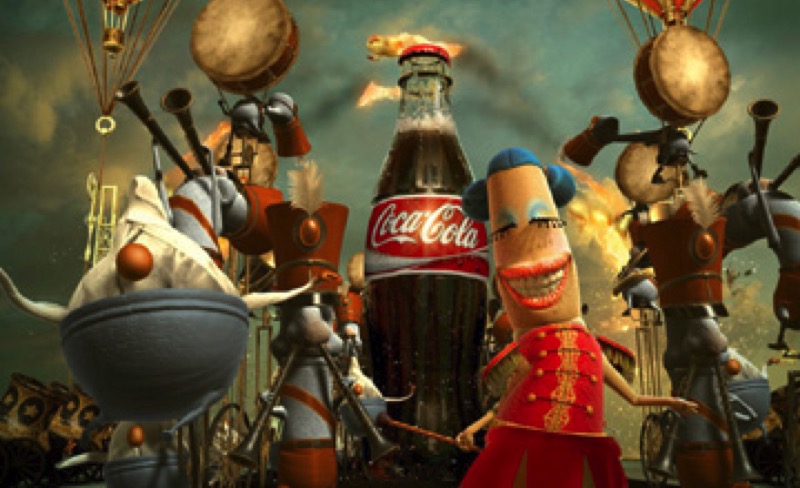
Happiness Factory?
This week marks the 5th anniversary of Adolfo de Jesus Munera Lopez's murder
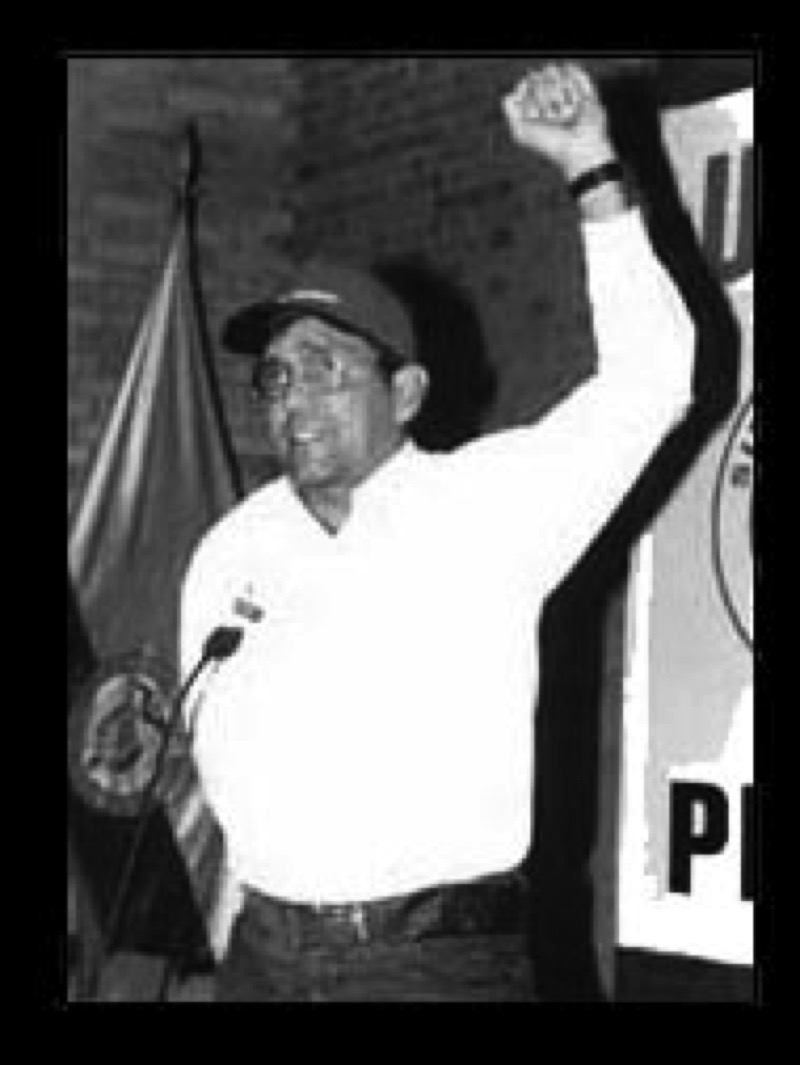
Member of SINALTRAINAL at Coke plant in Baranquilla, Colombia, Murdered on August 31, 2002
"Adolfo de Jesus Munera Lopez, was hired at the Coke bottling plant in Barranquilla in 1983. Mr. Munera worked as a truck driver for this facility. In 1996, Mr. Munera, who had been a vocal pro-union activist since his commencement of work with the Coke bottler, organized a successful strike against the Coke facility in Barranquilla. Because of his role in leading this strike, management at the Coke facility began a campaign of persecution against Mr. Munera, a campaign which included publicly denouncing him, without factual basis, as a 'guerilla' and prevailing upon both the AUC paramilitaries and the DAS to intimidate, harass, arrest and ultimately murder Mr. Munera. As part of this campaign, Mr. Munera began receiving death threats from AUC paramilitaries in the region shortly after the 1996 strike. From 1996 until the present time, managers at the Coke bottler in Barranquilla have permitted AUC paramilitary forces to freely enter the bottling facility and have met with these paramilitaries inside the bottling plant.
"[T]he Coke bottler in Barranquilla terminated the employment of Adolfo de Jesus Munera Lopez on the pretense that he was a "guerilla" wanted by Colombian authorities. In fact, Mr. Munera was fired because of his pro-union activities. ...In 2003, the Constitutional Court of Colombia found that the Coke bottler had terminated Adolfo de Jesus Munera unlawfully and issued a back pay award, to be paid to his family, for the period from 1997 until his murder in 2002."
From the ATCA lawsuit complaint filed by the International Labor Rights fund and United Steelworkers on behalf of the widow of Adolfo de Jesus Munera Lopez and SINALTRAINAL.
The Seoul Times (South Korea), "What Does Coca Cola's Dasani Bottled Water Have in Common with Death by Lethal Injection?" By Stephen Fox, August 31, 2007
Read Article
"The third largest ingredient in Dasani is potassium chloride. If you are to be put death, first you get a barbiturate, then a paralytic agent, and then the chemical to stop your heart (what a coincidence!) you guessed it: potassium chloride! "If you take everything out of the water, you don't get the crisp, clean taste that consumers desire," was the sanguine comment of Kim Price, spokesman for Coca-Cola. Question from Student at Oregon State University: I just noticed potassium chloride was listed as an ingredient in some bottled waters (Dasani, for example). But I remember from Chemistry and other sources of information KCl is used for lethal injections and is often times hazardous... so why would it be in bottled water?"
"From Wikipedia, on Potassium chloride:
"The chemical compound potassium chloride (KCl) is a metal halide composed of potassium and chlorine. In its pure state it is odorless. It has a white or colorless vitreous crystal, with a crystal structure that cleaves easily in three directions. Potassium chloride crystals are either simple cubic or face-centered cubic depending on what atoms are involved. If only potassium or chlorine atoms are considered, then the structured is face-centered cubic. However, both atoms form a crystal with a simple cubic structure: x-ray diffraction analysis will yield a simple cubic structure. Potassium chloride is also commonly known as "Muriate of Potash". Potash varies in color from pink or red to white depending on the mining and recovery process used. White potash, sometimes referred to as soluble potash, is usually higher in analysis and is used primarily for making liquid starter fertilizers. KCl is used in medicine, scientific applications, food processing and in judicial execution through lethal injection. It occurs naturally as the mineral sylvite and in combination with sodium chloride as sylvinite."

UPDATE to the successful campaign at Simon's Rock College in Great Barrington, Massachusetts
The Llama Ledger, "New drinks replace Coke in bookstore, vending machines: Activist Collective not happy," By Timothy Cama, August 29, 2007
Read Article
"Students and employees returning to Simon's Rock this fall noticed a whole new line of drinks both at the bookstore and in on-campus vending machines, thanks to a successful campaign to remove Coca-Cola products from campus. While the Simon's Rock Bookstore now carries beverages from Polar Beverages, Inc., in Worcester, the eight new drink vending machines on-campus carry mainly Pepsi Co. products, a fact that doesn't please students who spent a good part of last year campaigning for the change..."
"[Katharina] Kempf, along with sophomore Elizabeth "Bizzy" Davis, had hoped that a smaller, more local company than Pepsi would supply drinks for the campus's vending machines.'Pepsi is not a great alternative,' said Davis, adding that the company is 'not a small, sustainable business.' "
Read point 1a in our May 14th newsletter
Read May 7th article from The Llama Ledger
TheStreet.com, "Bottled Water Is Draining Your Bank Account," By Jeffrey Strain, August 28, 2007
"If you drink bottled water three times a day and buy it from a vending machine for $1 a bottle, switching to tap water will save you over $1,000 a year. Even if you buy your bottled water in bulk, you will save several hundred dollars a year by switching to tap water."
Atlanta Journal-Constitution, Coke using banned U.S. sweetener in Mexico," By Jeremy Schwartz, August 28, 2007
"Consumer advocates here are blasting Coca-Cola over its use of a sweetener that's been banned in the United States since 1969, but is now an ingredient in the Mexican version of Coca-Cola Zero."
Coca-Cola (KO) loses international brand strength
Three weeks after Business Week reported that Coca-Cola's brand name value lost close to $2 billion, a new report from GfK Custom Research indicates that Coke has taken a loss in "brand power," falling from first place to second, internationally. In contrast, Pepsi and Nestle have shown some gains in both reports.
Read Article about the GfK Custom Research report
Read Business Week article.
See Rankings in Business Week
Read Point 2 of our Aug. 14 Newsletter: Coke's Brand Name Suffers $2 billion loss!
OneWorld South Asia, "Bottled water costs us the earth," By Sunita Narain, August 28, 2007
"In the water and economically-rich world, bottled water started as a luxury-a non-essential item of desire, health and status. The water came from fancy mountain streams: they were packaged and sold as mineral-filled sparkling water. It was different from tap water and a healthy (and snobbish) alternative to sweet and street smart colas. But soon, the industry grew. In most cases, the companies sold water that was not sourced from mountain springs but from public water: municipal water sources. Once the snob habit was formed and the market created, the companies simply packaged tap water in most cases into plastic bottles and sold it from supermarkets."
Faversham House, "'Pack your bags and leave' community tells Coca Cola," By Dana Gornitzki, August 24, 2007
Read Article
" 'It is time for the Coca-Cola Company to finally accept the mandate of the community and now the state. They should pack up their bags and leave from Plachimada,' said R Ajayan of the Plachimada Solidarity Committee."
Niagara Falls Review, BOTTLED WATER IS NIAGARA'S DRINK OF CHOICE: But opponents to the bottled water industry say increased sales could jeopardize tap water safety," By Melissa Churly, August 24, 2007
Marketing Web (South Africa), "Think Outside the Bottle," By Tracey Wraight, August 23, 2007
Read Article
"Have you heard of those restaurants in America that sell air? No jokes - air. Flavoured, purified and enhanced, oxygen bars around the world are tapping into a new public trend and are making a killing by selling a tankard of O2 for $13 a pop - what's more, people are sucking it up. Tracey Wraight warns that before you utter a snide "only in America," bear in mind that you are probably no different. Water, just like air, is readily available, and apart from your levies, it's largely free. Instead of turning a tap on, we would rather shell out R25 for a bottle of designer water."
Scoop Independent News, "Kerala Confirms Support Against Coca-Cola," Press Release: India Resource Center,August 21, 2007
Read Article
"In a significant government move against the Coca-Cola company, the chief minister of Kerala, Mr. V. S. Achutanandan, has promised full legal support to the community campaigning for the permanent closure of the Coca-Cola bottling plant in Plachimada in the south Indian state of Kerala."
The New York Times, "Keeping Cool, Clear Tap Water," Editorial, August 18, 2007
Read Editorial
"Americans have some of the best water in the world -- a bragging point that seems to have gotten lost lately, even by those who take their daily exercise by waving the flag. Perhaps it is because the bottled water industry markets their product with waterfalls and soothing colors to make it seem like the clearest, cleanest, healthiest drink on earth. Unfortunately, that marketing can make tap water seem less clear, less clean and less healthy...The fear is that if too many people convert to bottled water, there would be even less political support for such spending. The last thing America needs is two water streams -- one for the rich and another for the rest of us."
Houston Chronicle, "BOTTLED-WATER BACKLASH: Rethink water, Cost-conscious Americans can still turn the tap to quench thirst," By Nicki Britton & Mary Vuong
Read Article
"Tap water is as hot as a Houston parking lot. It's safe to drink, supercheap, calorie-free and spiked with tooth decay-preventing fluoride, making you wonder why it fell out of favor in the first place. And while bottled water may have been the trendy choice for the past few decades - last year we drank 8.3 billion gallons of it, or 23 times the amount we did in 1976 - today, a backlash is bubbling. In Houston, tap water costs about a quarter of a cent per gallon. Bottled thirst quenchers can run a buck or two for a quarter that amount."
SRI World Group, "To Avoid Risk of Alien Tort Claims Act Cases, Companies Must Improve Human Rights," by Bill Baue, August 17, 2007
Read Article
"Other companies, including Coca-Cola, Exxon-Mobil, Firestone, Shell, and Wal-Mart, face ATCA cases, and they should not necessarily consider the Drummond not guilty verdict as setting a precedent predisposing them toward winning their cases."
Time, "Higher Education: A Student Backlash Against Coke," By Meg Massey, August 14, 2007
Read Article
Resolution of the Coventry University Student Union [UK]
Email from Conventry University Students Union: "Last year, Coventry University Students Union passed this motion to bring in an ethical alternative alongside Coke because of student concerns over Coke's ethical practices. Though it falls short of a full boycott, it is a step in the right direction and we will push for a full boycott this year."
Read Resolution
The New York Times, "Water, Water Everywhere, but Guilt by the Bottleful," By Alex Williams, August 12, 2007
Read Article
"In the last few months, bottled water -- generally considered a benign, even beneficial, product -- has been increasingly portrayed as an environmental villain by city leaders, activist groups and the media. The argument centers not on water, but oil. It takes 1.5 million barrels a year just to make the plastic water bottles Americans use, according to the Earth Policy Institute in Washington, plus countless barrels to transport it from as far as Fiji and refrigerate it."
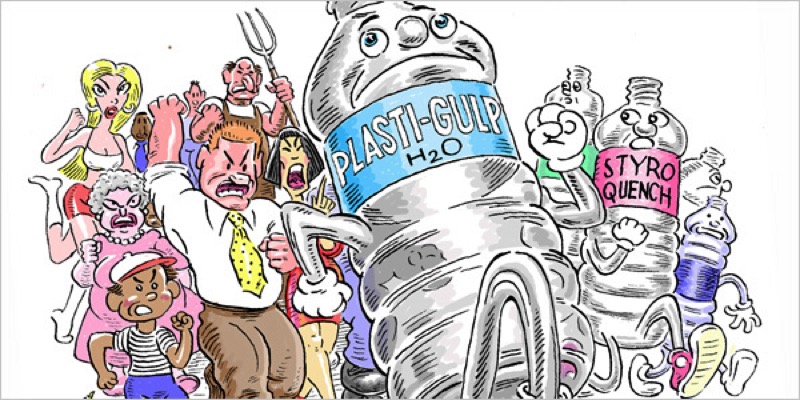
Graphic by Robert Grossman
OneWorld South Asia, "Indian university bans soft drinks on campus," August 7, 2007
"The soft drinks will not be allowed on Banaras Hindu University (BHU) campus in Varanasi from August 1, 2007. BHU has placed a ban on Coke and Pepsi on campus. This decision was taken by the BHU administration on 1st August."
Coalition Against Coke Contracts, "Coca-Cola Kicked Out of University of Illinois," August 6, 2007
Read Press Release
"For the past two years, CACC, a student & community group in Champaign Urbana has forcefully demanded that the University end its business relationship with Coca-Cola in light of the company's egregious records. It has further demanded a public statement from the administration regarding, what has been stated by Chancellor Hermand as "Coca-Cola's recalcitrance" on the afore-mentioned issues. More than 25 local groups joined the coalition, holding numerous dialogs with the administration and organizing public actions. Even as the current contract with Coca-Cola expired on June 30, CACC organized "the last day of contract" action that involved soda-tasting of a range of locally produced beverages. For the new beverage contract, the University of Illinois has decided to comply with the State's decision to grant pouring rights to Pepsi."
The News-Gazette Online, "State [Illinois] Gives Pepsi Pouring Rights," By Christine Des Garennes, August 4, 2007
Read Article
"For several years, some students and staff on campus have been lobbying university administrators to drop its relationship with the Coca-Cola company due to concerns about alleged anti-union activity at the company's plants in Colombia and alleged water supply and pollution issues in India. The Illinois Student Senate in 2005 passed a resolution asking the university not to renew its agreement with Coca-Cola unless the company invites an independent, third-party to review the allegations. Also in 2005, UI Chancellor Richard Herman wrote a letter to Coca-Cola outlining the concerns raised."
Food Co-op, Port Townsend, "Odwalla Pulled from Shelves," by Janet Welch, Board President, and Cindy Wolpin and Julie Jaman, Co-op Member-Owners
Read Food Co-op's Article
"The Food Co-op has made the decision to boycott Odwalla, a subsidiary of the Coca-Cola Corporation. In doing so, the Co-op joins the largest anti-corporate movement since the campaign against Nike for sweatshop abuses. The pressure on Coke is coming from the Campaign to Stop Killer Coke, boycotts at over 130 colleges and universities worldwide, and action from the International Teamsters."
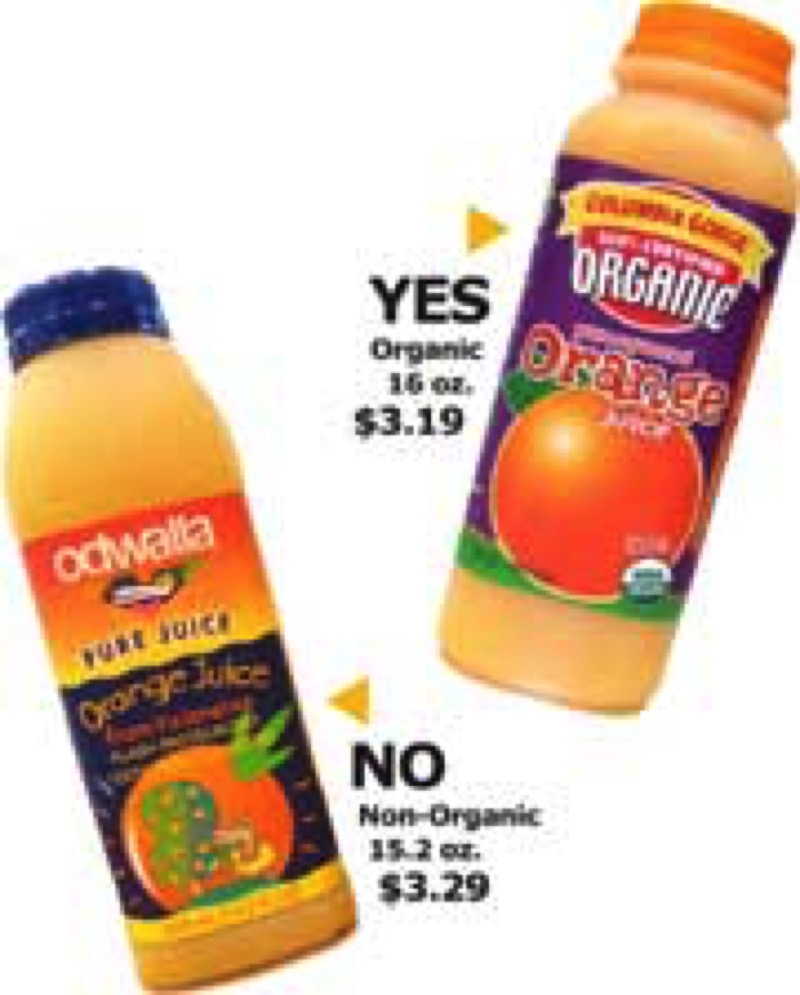
Port Townsend & Jefferson County Leader, "Food Co-op boycotts Odwalla as a Coca-Cola product," By Celeste Flint, August 1, 2007
Read Article
"The Food Co-op, spurred by store members, has joined an international boycott of Coca-Cola products and has stopped selling Odwalla juices and snack bars. The Co-op has made about $80,000 annually from Odwalla-related products."
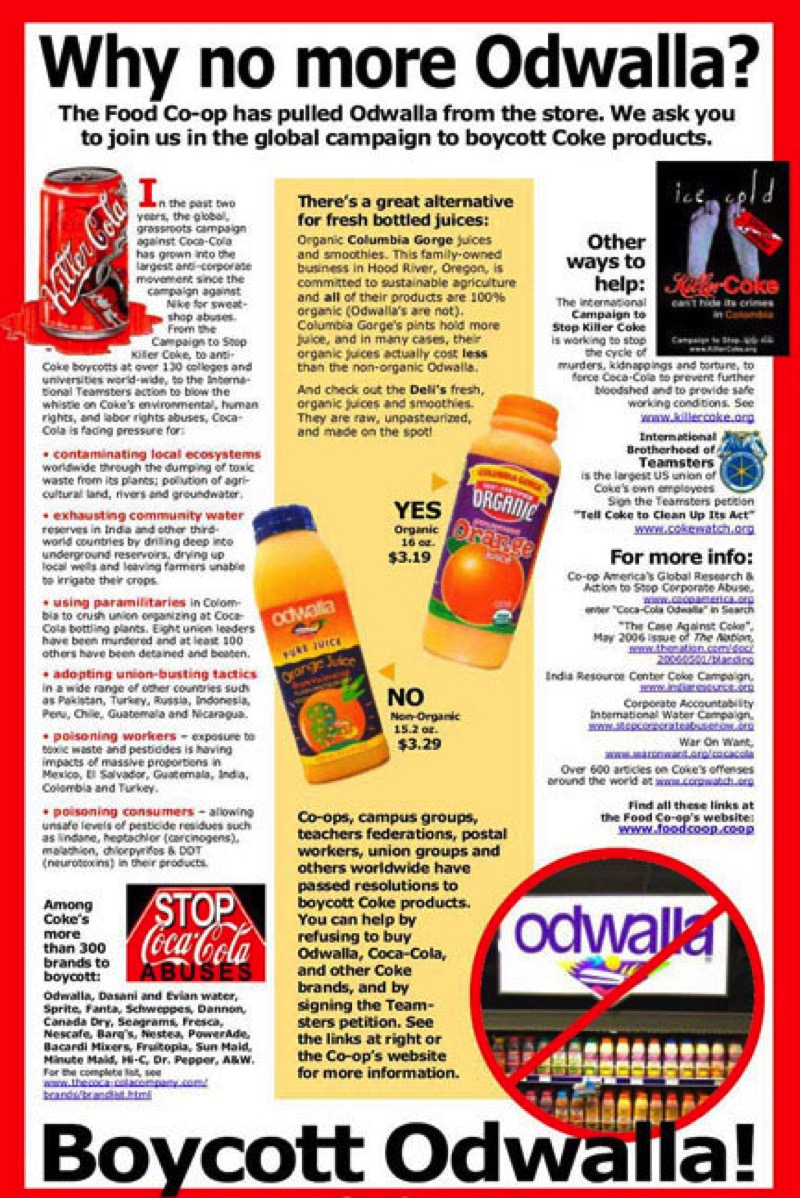
Click here to read "Why No More Odwalla?"
Camp in Norway Bans Coke
"Graham here from the Trinity College Killer Coke campaign in Dublin.
"I was invited to a Framfylkingen Camp just outside of Oslo, Norway last week to hold a workshop with the kids there on the Killer Coke campaign. The main ages expected at the workshop were 12-14 but turned out to be much larger interest from the kids and grow to 25 participants ranging from 8-16 years of age. I worked over the history of 'Boycotts' (the word was mistaken to mean 'Boys' only), their uses and why the Killer Coke campaign is advocating boycotting Coca-Cola.
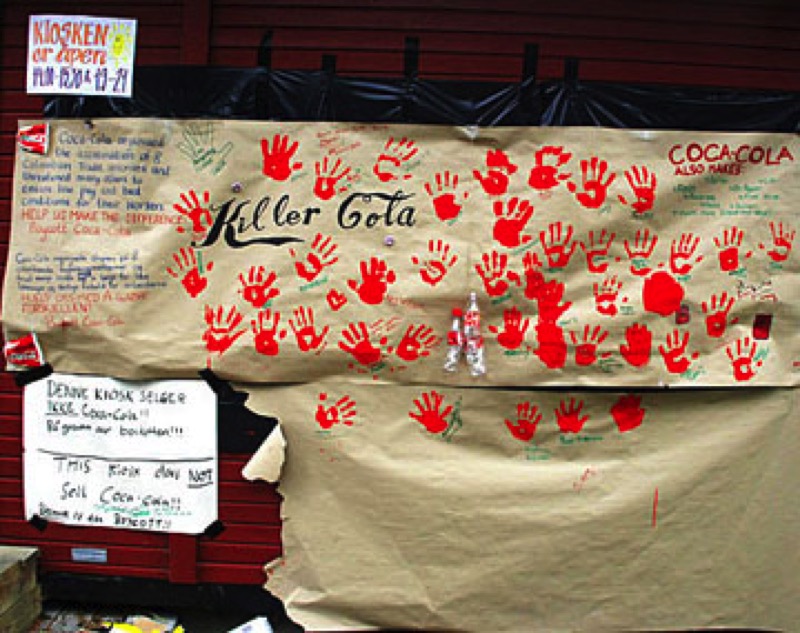
"I was worried about talking in detail about assassinations, torture, kidnapping and violence in Colombia but the kids really connected with the issues. In particular the story about a union leader's son being kidnapped by the paramilitaries connected with them on child protection issues.
"The kids broke into smaller groups and worked on an Action for the campaign and put together a hand-paint petition [see photo above] and got the Kiosk on the camp to withdraw its Coke products and not restock Coke for at least the duration of their camp. The small demo and petition was covered by the Norwegian press with photographers on the camp of 300 children from the UK, Norway and Finland."
Link to article in Norwegian(Killer Coke info at bottom of article)
Business Week, "Best Global Brands: How five names in this year's rankings staged their turnarounds," By David Kiley, August 6, 2007
Read Article
See Rankings
For the second year in a row, Coke, although still the number one global brand "because it is big and everywhere," has lost a large portion of its brand name value. In 2005, its brand name was valued at $67.5 billion; in 2006 it was worth $67 billion, a loss of 1%. This year, Coke's brand name was valued at $65.3 billion, a loss of 3% or close to $2 billion — a loss of more than $2 billion over the past two years.

Click here for site of the new Polish campaign against Coke
EarthTimes.org, "Coca-Cola Workers in Oceanside Choose Teamsters Union," Press Release, Teamsters Local 683, August 3, 2007
"Earlier this year, Teamsters in Southern California, Texas, Ohio, Atlanta and other cities protested Coke's opening of the formerly non-union Oceanside plant by rallying at numerous sporting events sponsored by Coca-Cola and its subsidiary brands. These rallies culminated in an historic rally in New York's Times Square, near Coke's giant video screen. Hundreds of Teamsters from across the country, as well as union leaders from Coke's overseas operations spoke at the rally."
ABC News ran a story as a part of their Caffeine Nation series: "Are you addicted to Diet Soda?" The piece stated that a "new study suggests too much diet soda could mean health risks."
ABC News, "Caffeine Nation: Are You Addicted to Diet Soda?"
Read Article.
International Environmental Law Research Centre, "Legal Implications of Plachimada: A Case Study," By Sujith Koonan, May 2007
Read Report
"The deterioration of groundwater in quality and quantity and the consequential public health problems and the destruction of the agricultural economy are the main problems identified in Plachimada. The activity of the Coca Cola company has caused or contributed a great deal to these problems. The people living in the vicinity of the Company have been suffering these problems for the last few years. The availability of good quality water for drinking purposes and agriculture has been affected dangerously due to the activity of the Company. Apart from that, the Company had also polluted the agricultural lands by depositing the hazardous wastes. All these points to the gross violation of the basic human rights, that is, the right to life, right to livelihood and the violation of the pollution control laws."
The New York Times, "In Praise of Tap Water," Editorial, August 1, 2007
Read Editorial
"...if you choose to get your recommended eight glasses a day from bottled water, you could spend up to $1,400 annually. The same amount of tap water would cost about 49 cents...The more the wealthy opt out of drinking tap water, the less political support there will be for investing in maintaining America's public water supply. That would be a serious loss. Access to cheap, clean water is basic to the nation's health."
Sky News, "Workers Take The Fizz Out Of Coke," July 26, 2007
Read Article
"Workers at Coca-Cola's biggest UK bottling and distribution centre have gone on strike for 48 hours. Unions say the strike will have a "devastating effect" on supplies. Members of the Unite union based at the West Yorkshire site of Wakefield stopped work after turning down a 2.5% pay offer"
National Resources Defense Council, "Bottled Water: Pure Drink or Pure Hype?"
Read Report
Read Executive Summary
Read Petition to FDA
"This is the online version of NRDC's March 1999 petition to the FDA and attached report on the results of our four-year study of the bottled water industry, including its bacterial and chemical contamination problems. The petition and report find major gaps in bottled water regulation and conclude that bottled water is not necessarily safer than tap water..."
Newsday, "[New York] City seeks to pul
Read Article
" 'Most containers for bottled water are made from non-degradable plastics, which take a 450 years to break down when disposed of in landfill sites. Even glass bottles of water still take a lot of energy to crush and recycle, whereas all we do with a restaurant glass of water is wash it up afterwards.' "
Penn & Teller, "The Truth About Bottled Water," June 30, 2007
Watch on YouTube
Newsweek MSNBC, "Environment: A Good Drink at the Sink," July 2-9, 2007
"Nothing irks Salt Lake City Mayor Ross (Rocky) Anderson more than seeing people tote water in plastic bottles. In fact, he argues, his city has some of the best tap water in the country. Several months ago, Anderson instructed department heads to stop buying bottled water for the city's 2,200 workers and provide coolers and fountains instead. 'For a long time, I've viewed [bottled water] as a huge marketing scam,' he says."
Tap Water vs. Bottled Water
Watch on YouTube
MSNBC (Associated Press), "S.F. mayor bans bottled water at city offices: Global warming and saving taxpayer money cited as reasons," June 25, 2007
Read Article
"[Mayor Gavin] Newsom has issued an executive order banning city departments from buying bottled water, even for water coolers. In a press release announcing the decision, the mayor cited the environmental impact of making, transporting and disposing of the bottles. More than a billion of them end up in the state's landfills each year, the release said."
News Release, "Coca-Cola Suffers Two Big Setbacks in SRI Community: The Coca-Cola Company & Coca-Cola Enterprises Deemed Not Socially Responsible," Campaign to Stop Killer Coke, July 11, 2007
Read News Release
"The Coca-Cola Company and its largest bottler, Coca-Cola Enterprises (CCE), do not meet the criteria as socially responsible companies, according to KLD Research & Analytics, Inc. of Boston, Mass., an independent investment research firm and world leader in defining corporate responsibility standards."
"After sending out this News Release, we received the followinng information from KLD about a third major setback for Coke in the SRI community: 'I have confirmed that Coca-Cola Bottling Company Consolidated was on the BMSI last year but was removed this year...as was CCE.' "
Political Affairs, "TIAA-CREF Says Coca-Cola not Socially Responsible," August 14, 2007
Read Article
Star Tribune, "U pops the age-old question: Coke or Pepsi?" By Jeff Shelman, July 5, 2007
Read Article
" 'I have an issue that Coke is giving a lot of money for branding and a monopoly,' Vladimir Makarov, an electrical engineering graduate student, said. 'I think that's totally ridiculous. I don't like Coke, I think their products are unhealthy.' "
OneWorld South Asia, "Stop corporate human rights violations, says ActionAid," July 5, 2007
"Global Compact fails to stop corporate human rights violations, says ActionAid. 'What is needed are legally-binding regulations to control corporate activities with respect to human rights.' The UN flagship initiative on corporate responsibility - the Global Compact - is failing to stop corporate human rights violations, says ActionAid ahead of a UN summit on corporate responsibly in Geneva this week."
India Resource Center, "Coca-Cola Undermines UN Global Compact: Keynote at Leaders Summit Mocks Corporate Social Responsibility," July 4, 2007
Read Press Release
"The very fact that the Global Compact is voluntary - there are no enforcement mechanisms - is its Achilles Heel. It allows companies with abusive track records to join readily without any genuine attempts to become more socially responsible. It has become a tool for these companies to use the UN to get access to markets, and nothing else,' said [India Resource Center's Amit] Srivastava."
The Campaign to Stop Killer Coke stated on April 17, 2006, "In another UN-related public relations scam, Coca-Cola announced in mid-March [2006] that it had signed on to the UN Global Compact, which has been described by its senior officer, Gavin Power, as 'a voluntary initiative to promote and advance a principles-based approach to corporate responsibility.' Mr. Power added: 'It is not a regulatory body nor monitoring instrument... The Global Compact is not a club for "perfect companies," if such organizations even exist. It is a platform for companies to work on universal principles and related challenging issues and improve their performance over time.'
" 'The Global Compact is another public relations vehicle for imperfect companies,' said Ray Rogers. 'Nothing is expected of them nor do they expect to do anything to become perfect or even respectable.' "
Law.com, "Plaintiffs' Expert: Coke Cost Investors $1.3 Billion — Shareholders say damages resulted from 'channel stuffing' to inflate stock prices artificially," By R. Robin McDonald, July 2, 2007
"Coca-Cola Co. shareholders sustained damages exceeding $1.3 billion after the international soft drink conglomerate improperly inflated revenues to boost stock prices artificially, a financial expert retained by suing shareholders has concluded."
From an article in Daily Report:
"Shareholders say damages resulted from 'channel stuffing' to inflate stock prices artificially."
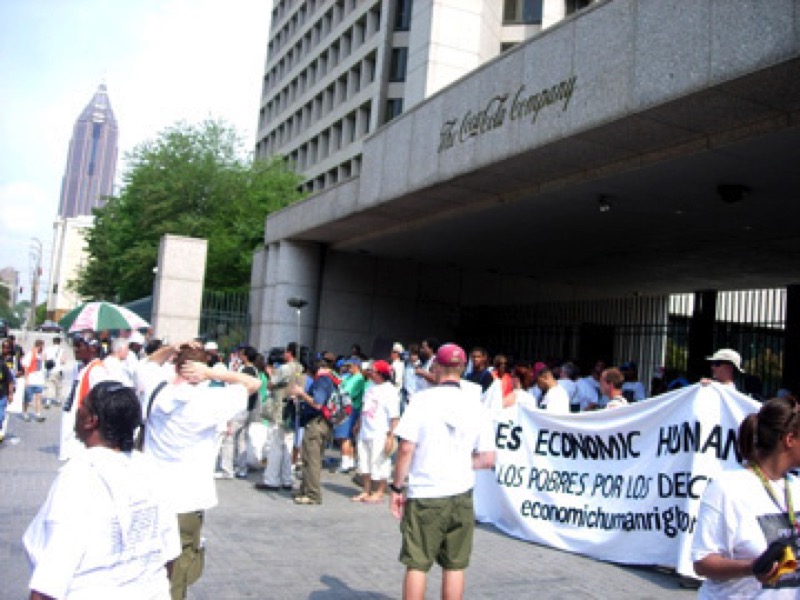
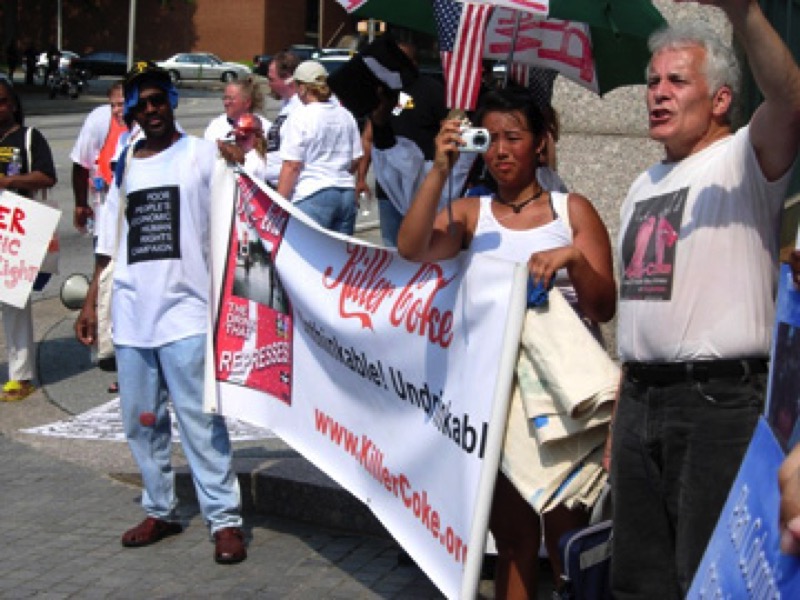
Demonstration at The World of Coke during the U.S. Social Forum in Atlanta, Georgia, June, 29, 2007
Photos by Dan Woulfin
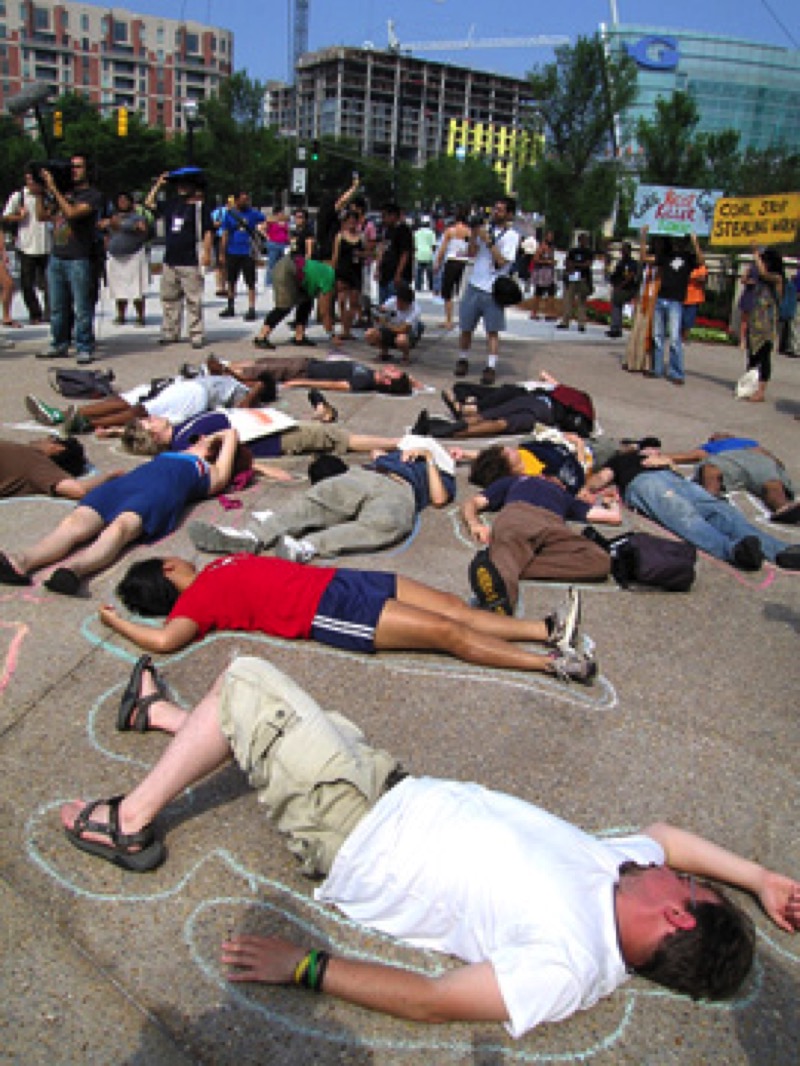
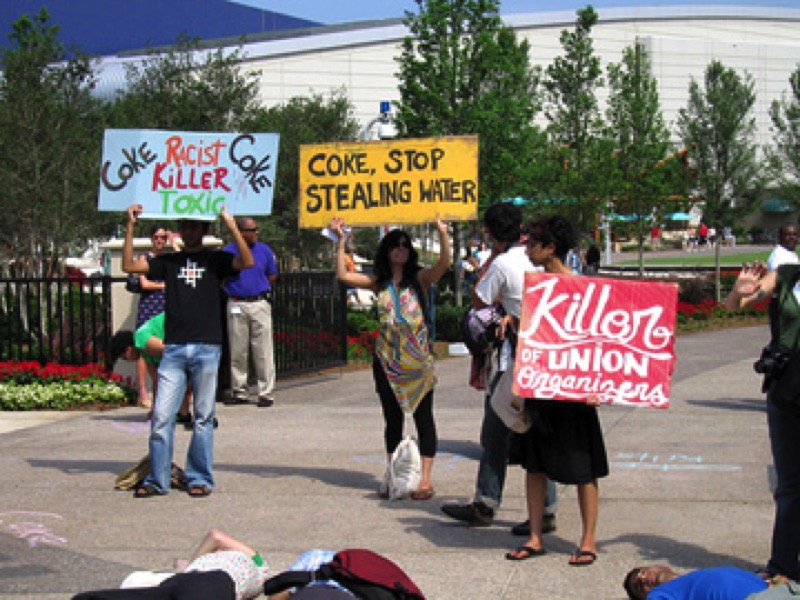
Demonstration at The World of Coke duringb the U.S. Social Forum in Atlanta, Georgia, June, 29, 2007
Photos by Nadia Khastagir
Click here to see a slideshow of Nadia Khastagir's photos
India Resource Center Press Release, "Major Protest at Coke Museum in Atlanta: Activists Reject Museum as 'Fairy Tale' Land," June 29, 2007
Read Press Release
Read a report from the march
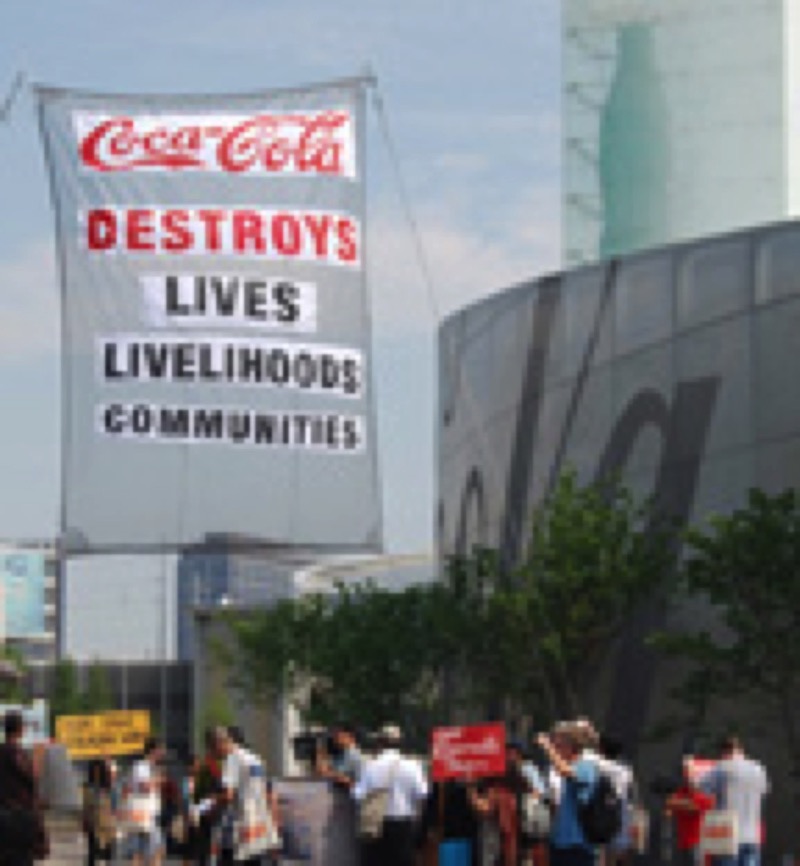
Jim Hightower, "Why Not Drink 'Local?'," June 29, 2007
Read/Listen to Commentary
"In a triumph of marketing over reasoning, the bottled water industry has turned us into conspicuously silly consumers. Controlled by a handful of global conglomerates (such as Coca Cola and Nestle), the water industry has created the fantasy that if it's in a bottle, it's purer than what comes out of the tap."
Post-Bulletin (Rochester MN), "FOR WED Franciscans: Corporations bilk communities of water supply," By Jeff Hansel, July 3, 2007
"Is water a human right, or is water a commodity to be bought and sold for profit?"
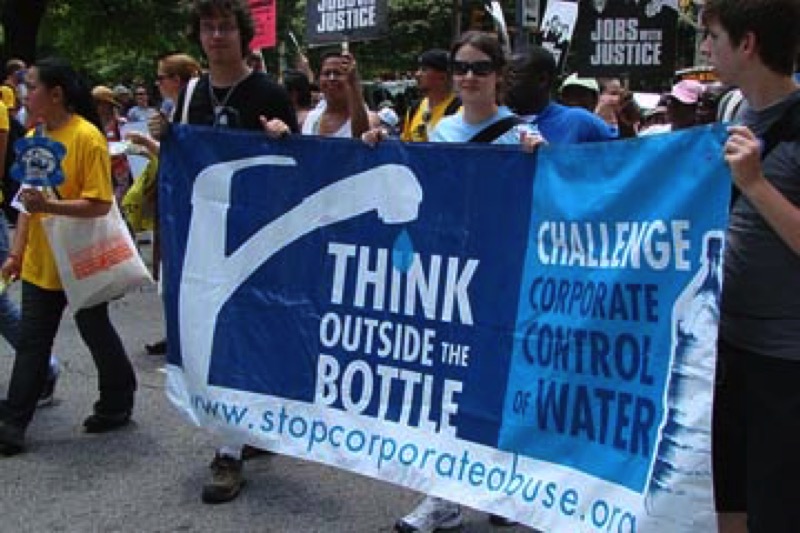
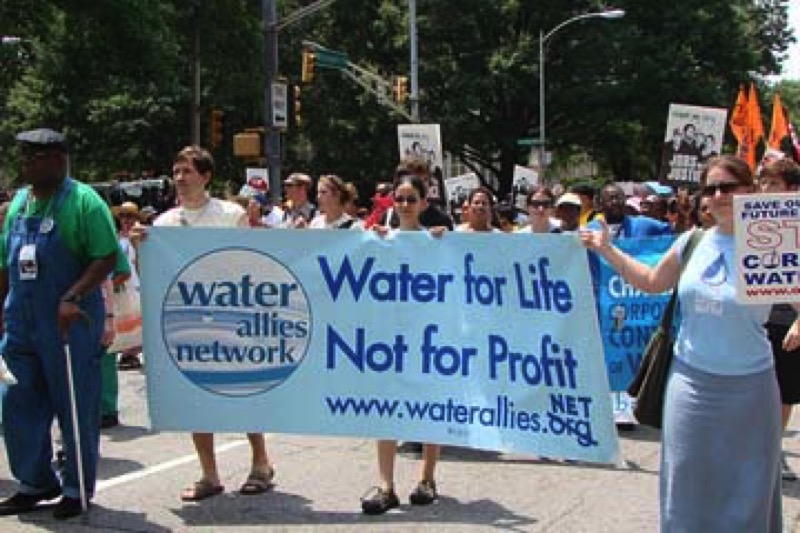
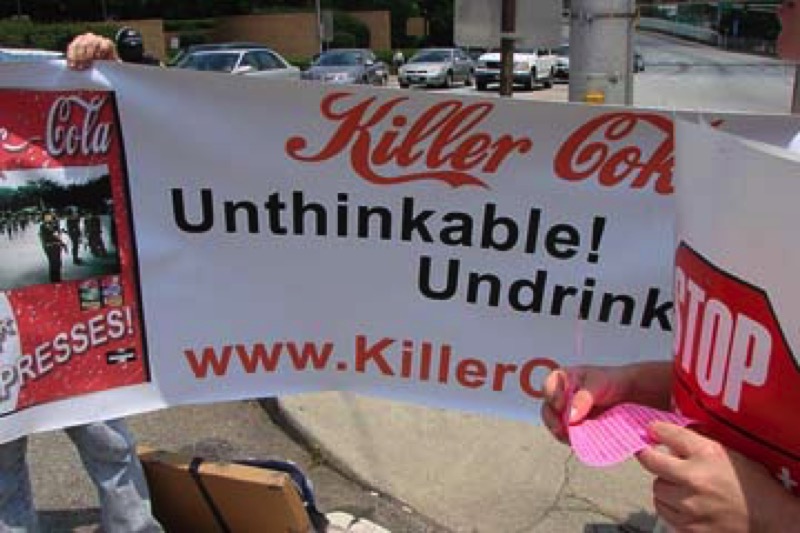
Photos from the U.S. Labor Forum by Nirainjana
Campaign to Stop Killer Coke, "Coca-Cola's Crimes and Misconduct to be Highlighted at U.S. Social Forum: Ray Rogers to join Poor People's March on Coca-Cola," June 27, 2007
Read News Release
"The Campaign to Stop Killer Coke will be participating in the U.S. Social Forum this week by reaching out to participants and the Atlanta community to bring attention to the widespread crimes and abuses of The Coca-Cola Company, which is becoming known around the world as KillerCoke...Ray Rogers, director of the Campaign to Stop Killer Coke, will join the Poor People's March for Economic Human Rights on Friday June 29th starting at 3 pm at the Martin Luther King Jr. History Center. The march will culminate with a demonstration at Coca-Cola's headquarters. Protest organizers are asking others to 'join us in presenting Coca-Cola with a Citizen's Arrest for Crimes Against Humanity.' "
See website of Poor People's Economic Human Rights Campaign
See website of the U.S. Social Forum
Jobs with Jusitice, "Tell Coca-Cola to Stop Worker & Environmental Abuses," Petition
"Help blow the whistle on environmental, human rights, and labor rights abuses by Coca-Cola and its largest bottler, CCE! Coke is accused of contaminating water and farmland in India. Coke allegedly allowed death squads in Colombia to murder eight pro-union employees. In the U.S., Coke paid $192 million to settle an employee lawsuit over its widespread racial discrimination. And now Coke's latest restructuring could destroy good jobs, retirement security, and health care coverage for many Americans. Please sign the petition..."
The Zero Coke Movement
Click here for website
"Welcome to the Zero Coke movement...Waste, pollution and questionable nutrition are at the centre of Coke's business model. Drinks don't need cheesy theme songs, a posse of trucks, or plastic/aluminium containers. But thanks to companies like Coke, land is cleared and waste & pollution are created just to make sure people have sweetened, chilled beverages.
"All this in a world where one person in five has ZERO access to clean drinking water."
Press Release, COALITION AGAINST COKE CONTRACTS (CACC), University of Illinois, "Even as the current contract expires, University of Illinois continues to evade real questions," June 30, 2007
Read Press Release
Demonstration in Italy, "Killer Coca - Contestazione alla Coop," January 13, 2006
Watch on YouTube
Die-in in Italy (2003), "Die in alla COOP per il boicottaggio alla Coca Cola (2003)"
Watch on YouTube
International Herald Tribune, "U.S. companies tied to Colombia labor activist murders at House hearing," Associated Press, June 28, 2007
"The president of Colombia's national mining union, Francisco Ramirez, claimed not just Chiquita and Drummond but also Coca-Cola, Occidental Petroleum, BP Amoco and Exxon Mobil were complicit in the killing of union activists in Colombia -- either by paying paramilitaries or indirectly through the U.S. military aid for Colombian army units that he said committed the murders."
Monsters & Critics: Tech News: Coca Cola in a fizz about Sprite Yard," By Stevie Smith, June 12, 2007
Read Article
" 'We know that when it comes to reaching teens, mobile is the medium,' said Denis Sison, Sprite Global Brand Director. 'This program will enable us to connect with teens by putting Sprite both in their hand and in their phone.' "
The Wall Street Journal, "Coca-Cola to Launch Teen Networking Site," June 7, 2oo7
"Coca-Cola Co. is creating a virtual teenager hangout like MySpace and Facebook — but only on cellphones — to lure more youngsters to its sodas and flavored drinks, starting in the U.S. and China. "
The New York Times, "A thirst for Sprite in teen cellphone users," By Louise Story, June 7, 2007
Read Article
This is another effort by The Coca-Cola Co. to aggressively market to youth nutritionally worthless and damaging soft drinks that health experts point out fuel the obesity, high blood pressure and diabetes epidemic in young people.
An article in San Francisco Chronicle on April 7, 2006 stated:
"A study by researchers at Children's Hospital in Boston, published in March [2006] by the journal Pediatrics, found that teens ages 13 to 18 who drank one 12-ounce sweetened drink each day — such as a soda, sports drink or lemonade — in addition to their regular diet gained an average of 1 pound every 3 to 4 weeks. Nutritionists also note that most sugary drinks lack calcium, vitamins and other nutrients."
This is yet another contribution of Coke to obesity and poor health in young people.
Campaign to Stop Killer Coke, "Comment on the two following articles re: Colombia removed from the ILO list of 25 countries of concern for labor"
When the International Labor Organization of the United Nations agreed in April 2006 to do "an assessment of current working conditions" in Colombia, Coke boasted that there would be an independent investigation of allegations of past and present abuses in Colombia. Because of this, one administrator at the University of Michigan, CFO Tim Slottow, decided to bring Coke back to the campus after a strong campaign by a coalition of student groups was successful in getting the University of Michigan to dump Coke.
The Campaign wrote then: "The ILO's very structure favors corporate interests. The ILO is made up of 28 representatives of governments, 14 from employers and 14 from labor. Labor observers and advocates who are familiar with the ILO say it's heavily skewed against workers, since most government representatives align themselves with the employers." With only a quarter of the votes, there was no way for labor to get its agenda passed - most governments align with employers.
The two following articles indicate that our analysis has been correct. Director of Global Labor Relations and Workplace Accountability Ed Potter, is the head spokesperson for the entire Employers' Group, a powerful position within the ILO structure to promote the interests of big business and thus the interests of Coca-Cola. Because of the inequitable structure of the ILO and the strong position of Potter within the body, he was able to "veto" the decision to place Colombia on the list of 25 countries of concern for labor.
Potter clearly has a great deal of influence over decisions made by the ILO and University of Michigan CFO Tim Slottow.
Resources:
University of Michigan Falls Prey to Another Coca-Cola PR Scam
Part 7 in Critical Talking Points: The ILO and the 'Investigation' That Never Was
The Sydney Morning Herald, "Hockey's attack on union boss debunked,: By Mark Davis, June 6, 2007
Read Article
"EMPLOYERS led by a Coca-Cola executive [Ed Potter] stopped the International Labour Organisation examining violations of workplace rights in Colombia..."
Guerilla News Network, "Things go worse with Coke," By Center for Media and Democracy, June 6, 2007
"After the International Labour Organisation included Australia on a list of 25 countries of concern for their labour standards, the Australian government lashed out. The Minister for Workplace Relations, Joe Hockey, claimed that the Australian Council of Trade Unions (ACTU) had lobbied to have Australia included at the expense of listing Colombia, where many labor officials have been assassinated.
"However, the ACTU's international officer, Alison Tate, said that while the international unions had Colombia at the top of their list, it was effectively vetoed by the representatives from the International Organisation of Employers (IOE). Tate told The Sydney Morning Herald that the IOE representative in the negotiations was the Coca-Cola Company's Director of Global Labour relations, Ed Potter. The Killer Coke campaign has identified numerous union leaders and workers from Coca-Cola's Colombian bottling plants who have been murdered, tortured and kidnapped by paramilitary groups. They are suporting a legal action against Coke and pressing the company to 'prevent further bloodshed and to provide safe working conditions.' "
The BG News (Bowling Green, Ohio), "Shopping for political values," By Melinda Jacobs, June 6, 2007
"You are what brand you buy. Just as the average person has to be aware of the dangers of 'wearing their heart on their sleeve,' many corporations are also being forced to learn a similar lesson: the dangers of wearing their political beliefs on their logo. Or in some cases, trying to hide their unethical actions behind it as well. However, not only is the fear of association between politics and brand names applicable to large corporations, but consumers also are beginning to fear how their personal purchases will reflect their values."
Center for Media and Democracy/Environmental News Service, "WWF Greenwashes Coca-Cola," June 5, 2007
Read Article
"WWF, the corporate-funded environmental giant often accused of taking greenbacks in return for greenwashing its corporate benefactors, strikes again."
OneWorld U.S., "Coke Faces New Charges in India, Including 'Greenwashing'," By Aaron Glantz, June 7, 2007
Read Article
"The Coca-Cola company has been charged with illegally seizing lands communally owned by small farmers and indiscriminately dumping sludge and other industrial hazardous waste onto the surrounding community.
" 'The Coca-Cola company and WWF did not dare to include India in this initiative (because) the public in India is increasingly becoming aware of the Coca-Cola company's disastrous relationship with water, and would have to see it for what it's worth — a drop in the bucket,' he [Amit Srivastava] told OneWorld."
Polaris Institute, "The Polaris Institute's Statement at The Coca-Cola Company's Annual General Meeting"
Read About Greenwashing Award
"On behalf of the Corporate Greenwashing Award Selection Committee, I would like to present The Coca-Cola Company with the first ever corporate Greenwashing Award.
"This award is presented to corporations that have pushed revenue and profits higher while putting millions of dollars into covering up environmentally and socially damaging practices using corporate social responsibility projects.
"...we were able to select The Coca-Cola Company as the company that has worked the hardest this year to fool the public that it is an upstanding corporate citizen."
Polaris Institute, "Coca-Cola Company wins Corporate Greenwashing Award"
Read Article
""After careful consideration, the Coca-Cola Company stood out as the company that has worked the hardest this year to present itself as socially and environmentally responsible - while continuing to harm environments and communities through the production and distribution of its products", says Verda Cook, Campaigns Coordinator at the Polaris Institute."
Commondreams.org, "The Greenwashing Of America," by Philip Mattera, June 7, 2007
Read Article
"...some companies began to infiltrate the environmental movement itself by contributing to the more moderate groups and getting spots on their boards...In fact, we shouldn't be joining any company's environmental initiative. Human activists should be leading the effort to clean up the planet, and corporations should be made to follow our lead."
Seattle Weekly, "Make Your Own Vitamin Water!" By Jonathan Kauffman, June 7, 2007
Read Article and Recipes
"I consulted with nutritionists, naturopaths, and vitamin dealers to develop the following recipes, each the equivalent of a VitaminWater variety. With the purchase of a few easy-to-find household chemicals and some crystalline fructose, enterprising cooks and chemists will find the recipes simple to mix up for their hydration pak or hip flask. Of course, you're looking at an outlay of $60 or so for your first batch. But considering that the cheapest of these drinks costs $1.50 a bottle, you'll see a return on your investment in no time.
"However, when you weigh the benefits of buying and recycling a glass bottle of juice versus inflicting four 20-ounce plastic bottles of VitaminWater upon Mother Earth, you may come to the same realization that I did: It's no longer your call to make, is it?"
Take Action! Tell the University of Chicago to Kick Coke Off Campus! Petition maintained by USAS
Sign Petition
"President Zimmer,
"Make the right decision and remove Coca-Cola from campus dining halls. Students at the University of Chicago have demonstrated that they do not want their school doing business with such a socially unjust company."
Daily Hampshire Gazette, "Convinced of abuses, Smith College severs ties with Coca-Cola," By Kristin Palpini and Andrew Horton, June 1, 2007
"After a two-year study into Coca-Cola's alleged environmental and labor rights violations, Smith joins 40 colleges and universities nationwide that have barred Coca-Cola from campus. The list of colleges banning Coke includes Hampshire College (which booted Coke in 2006), Simons Rock College in Great Barrington, New York University and Rutgers University. In the letter, Christ cites poor business practices in Colombia and India as reasons why the college has decided not to renew Coca-Cola's contract."
India Resource Center, Commondreams.org, "Smith College Kicks Coca-Cola Off Campus"
Read Article
TheBostonChannel.com, "College Banning Coca-Cola: School President Prohibits Soft Drink Sales, May 30, 2007
"BOSTON — Smith College students looking for a Coke and a smile will now have to go off campus to get it.
"The Northampton, Mass., school announced Coca-Cola will no longer be allowed to sell its products on campus.
"The school's president said the move is based on Coke's business practices in Colombia and India.
(Read Letter from Smith College President Carol T. Christ.)
"She said Smith College takes the issues of human rights and environmental sustainability very seriously."
Smith College News Office News Release, "Smith College Discontinues Contract with Coca-Cola: Smith College President Carol T. Christ sent the following letter [linked below] to Coca-Cola notifying the corporation that it will not be permitted to participate in the college's upcoming soft drink bidding process."
Read News Release
"As a private college with a public conscience, Smith College takes issues of human rights and environmental sustainability very seriously. Social responsibility is a core value of the college, one we aspire to reflect in our educational mission and in our campus operations. In severing our ties with the Coca-Cola Corporation, Smith joins other institutions and organizations around the world in urging Coca-Cola to take significant steps toward more responsible business practices across all realms of its operations."
Aquinas College, Michigan, Dumps Coke
Aquinas College, "rooted in the Catholic Dominican tradition" is in Grand Rapids, Michigan.
Posted on "the moose"
"Campus Changes in Soft Drink Vending
"Please note that as the campus changes beverage suppliers, Coca-Cola Bottling will be emptying and removing their vending machines within the next week. Pepsi Bottling Group will be installing new machines on campus during the second week of June."
Chicago Maroon (University of Chicago), "Why I'm voting to get rid of Coke," By Ryan Kaminski, May 25, 2007
"I find the latest SG Assembly vote symptomatic of the problem that has been plaguing SG all year: Many representatives forgot time after time that they were representing their constituents and not their own political, social, or ideological interests. Some representatives voted negatively without attending the town hall meeting, quoted their economics textbooks for guidance, ignored tens of emails from concerned constituents..."
"Anyone who actually attended the meeting itself--including Coke supporters--would probably admit that representatives from Coca-Cola left a lot to be desired compared to Ray Rogers from the Killer Coke Campaign. While Rogers was at times a little too passionate and jumpy with his arguments, he presented independent evidence from a variety of sources including the LA Times, Business Week, CNN, The New York Times, and others to verify his claims. Conversely, the Coke representatives patronized and, as far as I am concerned, belittled the audience..."
Chicago Maroon, CDAB to decide Coke's fate," By Mischa Fierer, May 25, 2007
"SG's decision disappointed fourth-year Miranda Nelson, a leader of Kick Coke Off Campus. She said that anti-Coke activists had done everything CDAB had requested by procuring the petition and by educating students about the issue. Nelson noted that none of the SG members at the forum took notes while students spoke. Alex Moore, another anti-Coke leader, said that he was disappointed 'to hear that people who are going to make decisions for students aren't going to listen to students.' "
Chicago Maroon, "If Coke can't be humane to workers, it has to go," By Shira Tevah, May 22, 2007
"But kicking Coke off campus is not about individuals personally not drinking an 'evil' soft drink: It is about forcing one corporation with a poor human-rights record to change its ways. The Maroon cites Pepsi as another 'evil' because it sourced from Burma in the 1990s. What the Maroon might not realize is that it took a national campaign to get Pepsi to change its sourcing practices. We are part of an international campaign to make Coca-Cola fix its own practices."
Response to Pro-Coke Student Barney Keller at University of Chicago
University of Chicago student Barney Keller personally attacked Director Ray Rogers in his poorly-researched article below. The article was widely-distributed on campus in preparation for Tuesday's meeting that would have Ray and Coke address students and answer their questions. Students asked the Campaign to respond to Keller and the response, also widely distributed on campus, follows Keller's article:
Chicago Maroon, "Don't buy into the Killer Coke craze," By Barney Keller, May 18, 2007
Response to Keller's Article
Read Response
Chicago Maroon "Coke's future on campus hinges on vote," By Mimi Yang, May 11, 2007
"By the end of spring quarter, students will know whether University-run dining and food facilities will continue to provide Coca-Cola brand products in the upcoming year. Both Coca-Cola supporters and members of the Campaign to Kick Coke Off Campus anxiously await the decision that will be the culmination of two contentious years of student activism."
Chicago Maroon "With Coca-Cola, capitalism's injustices are abundantly clear," By Daniel Benjamin, May 11, 2007
Read Article
"McCarl's claims that the campus campaign selected Coca-Cola 'arbitrarily' and that Coke's human-rights abuses are 'alleged' are in every way specious. Our actions respond to the Colombian workers' call for an international boycott, a call answered by over 30 colleges, including DePaul, NYU, and Swarthmore. While Coca-Cola is not the only corporation with deplorable human rights practices, it is one of the worst and is the leader in the soft drinks industry. Change in Coke's behavior makes change by Pepsi and others far likelier."
"While surely no one on the anti-Coke campaign claims to stand outside the benefits of capitalism, we try to be aware, and to make others aware, that there are many injustices in the free-market system. And so, through our purchasing power, we try to help workers worldwide to exercise the freedoms that McCarl values so highly."
BBC News, "Coke says no China jail labour," By Paul Danahar, May 21, 2007
Read Article
"It was in Ningbo prison, he [Jon Sims} told the BBC, that he was made to work on merchandise intended for the company [Coca-Cola].
B. Wardlaw, a huge Coke shareholder, said in the 2004 Coke shareholders' meeting: "As far as my proposal on China business principles which I am bringing to you for the third time, I introduced this proposal because I, along with many other socially conscious shareholders, are concerned about Coke, its reputation and its share price. As I've said here the last two years, we seem to be heading toward possible public relations calamity in China. So just looking at it from the viewpoint of the company, it makes sense for us to spend more time thinking about, before we go in, we're spending over a $1 billion, what over the last 20 years in China, developing products there. The Olympics are coming to China in 2008 in Beijing. This is a moment where Coca-Cola is going to be highlighted because of our close involvement with the Olympics and the, as someone has said, as a recognized product in the world. I think what is happening, is that we are still not, as a company, paying enough attention to what could happen in China. Every human rights abuse possible has been committed in China..." His proposal was voted down all three years by the shareholders.
Center for Science in the Public Interest (CSPI), "Federal Trade Commission Urged to Crack Down on Enviga: CSPI Says 'Calorie Burning' and Weight Loss Claims Illegal," May 21, 2007
Read Article
"If you want a lighter wallet, drink Enviga," said Jacobson [CSPI executive director Michael F. Jacobson]. "If you want a lighter you, drink water."
Colombian Coke truck drivers fired for joining SINALTRAINAL
Sixteen Coke truck drivers were fired in April for joining SINALTRAINAL. This led to a number of workers chaining themselves in front of Coca-Cola FEMSA building as a part of a demonstration against the firings. All of these demonstrating workers have put their lives at risk. These are some of the brave, subcontracted, "flexible" workers who make up the vast majority of Coke workers in Colombia.

Coke CEO E. Neville Isdell boasts: "We have solid relationships with organized labor in Colombia." The company and Ed Potter, Coke's Director of Global Labor Relations and Workplace Accountability have repeatedly stated that more than 30 percent of Coca-Cola system workers in Colombia are unionized, in a country where the average for all companies is about four percent...and employs approximately 8,000 people in Colombia. Potter has said in a published article: "In Colombia, the unionization level of our bottlers is over eight times the national unionization rate of four percent."
This is in complete contradiction to what is being reported from Colombia. Coca-Cola considers the vast majority of those 8,000 Coke workers in Colombia to be "flexible" workers employed through various subcontracting schemes, not employees. These workers have no chance of union representation, receive low pay and meager benefits (if any), have no job security and often are mired in poverty. Due to Coke's lobbying efforts in Colombia and the campaign of terror directed at union leaders, only about 4% of Coke's workers in Colombia belong to unions.
Eat the State, "I Pledge Allegiance to Coca-Cola," by Jason Miller, May 11, 2007
Read Article
Terra Incognita No. 7, "Campaign to Stop Killer Coke: UPDATE," Winter '07
Terra Incognita was a not-for-profit magazine, published in Madrid, Spain, promoting cultural exchange among the many communities in which English an/or Spanish are spoken.
Read Update in English
Terra Incognita, "Campana para Detener la Coca-Cola Asesina: ACTUALIZACION," Invierno '07
Read Update in Español
Guardian Unlimited (Associated Press), "Coca-Cola Vs Coca Sek in Colombia," By Sergio De Leon, May 10, 2007
Drug War Chronicle, "Latin America: Colombia Bans Coca Products — Except Coca-Cola," May 11, 2007
Read Article
" 'They [Coca-Cola] lose their fight in October and then in February the government decides to prohibit Coca Sek,' said David Curtidor, a Nasa in charge of the company that produces the drink. He is leading a legal challenge to the ban. In the meantime, the community is losing $15,000 a month from lost sales of Coca Sek and other coca products. 'Why don't they also ban Coca-Cola? It's also made of coca leaves,' he complained to the Associated Press."
The Llama Ledger (Simon's Rock College), "Coca-Cola contracts to be terminated: Company attempts to keep contracts," By Timothy Cama, May 7, 2007
Read Article
" 'This is a terrific job by the students,' [Campaign Director Ray] Rogers says of Simon's Rock's campaign. Rogers was pleased that Simon's Rock's administration was so supportive of the student-led campaign, in contrast to administrations at many other schools who have attempted such campaigns.'
United University Professions (UUP), votes to boycott Coke
United University Professions (UUP) is the union representing more than 32,000 academic and professional faculty on 29 State University of New York campuses, plus System Administration, Empire State College, and the New York State Theatre Institute. UUP is affiliated with the New York State United Teachers and the American Federation of Teachers, AFL-CIO. The Delegate Assembly, the union's top policymaking body, voted to not serve Coke products at events and to urge UUP chapters to press for the termination of contracts with Coca-Cola on their campuses.
UUP Resolution Proposal Regarding The Coca-Cola Company
Read Resolution
UWeekly (Ohio State University), "Killer Coke?:Student to spill Coke secrets on university senate," By Jocelyn Beach Sexton, May 9, 2007
Read Article
" 'I first heard about [Coke's business practices] when my brother studied abroad in Colombia,' [Chris] Trout said. 'He spoke to a Coke employee there who was part of a union. One of his family members was kidnapped because of this [union participation], and he was forced to leave the union, or else. This happens all the time down there.' "
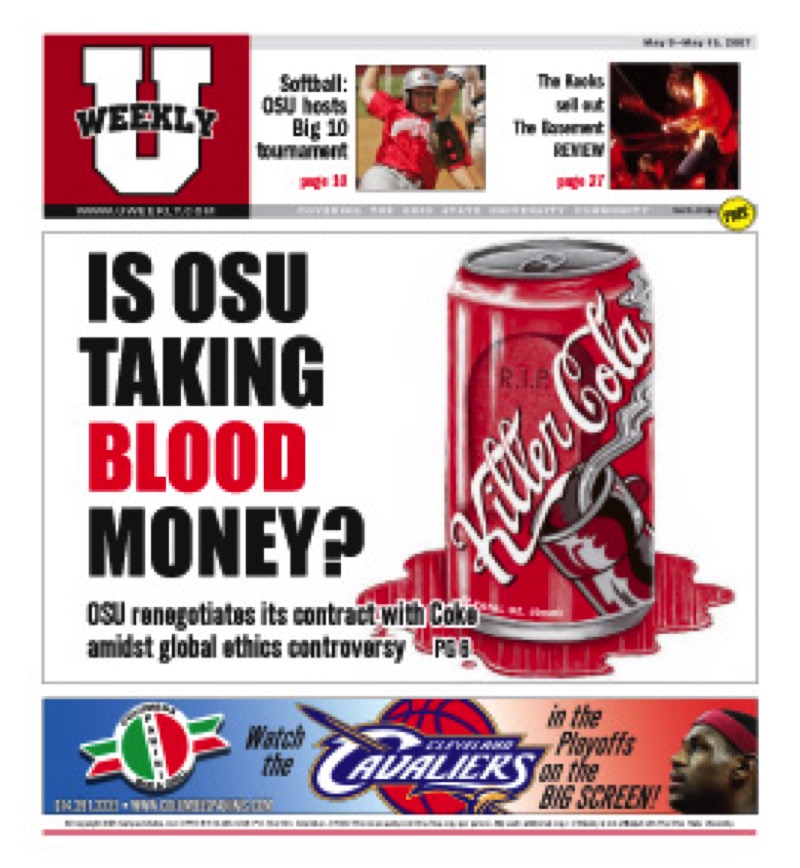
SUNY Albany Demands and End to Coke Contract
"On Tuesday May 1, 2007 Students for Worker's Rights held a Press Conference demanding the University sever their contract with the Coca-Cola Company after announcing that over 1,200 students supported a contract severance. Members of Students for Workers' Rights, including Bessam Sinan, Jackie Hayes and Sean Kite, read statements condemning Coca-Cola for its deplorable actions abroad and calling on UAlbany to sever all ties with such a disreputable corporation. Jim Collins, Anthropology Professor and member of United University Professions (UUP) read the anti-Coke resolution passed at the UUP's statewide Solidarity Committee meeting on April 20, 2007. The resolution called for all UUP chapters to, "press for the termination of contracts with Coca-Cola on their campuses."
Following the Press Conference students marched to the office of Susan Herbst, the Provost and current Officer in Charge, to deliver an anti-Coke petition signed by over 1,200 students along with a list of demands. Susan Hebst received the petition and demands, but refused to comment on her position.
Press Release: Students Demand Ualbany Sever Their Contract With The Coca-Cola Company
Read Press Release
Letter to Provost-In-Charge Susan Herbst
Read Letter
Washington Square News, "Dave Hancock," By Rachel P. Kreiter, May 7, 2007
A story about one of the many young people who was so important in making the Campaign to Stop Killer Coke successful at NYU — Dave is "heading out to California to become a union organizer. Rock the hell on, Mr. Hancock." We suspect we'll see Dave again in the future.
The Stony Brook Statesman, "Killer Coke Campaign Looks to Expiring Contract in 2008, By Adam Peck, May 5, 2007
Read Article
Killer Coke by Chio
Also watch "Killer Coke" by Chio byclicking here
The Daily Record (College of Wooster), "College of Wooster Students debate value of banning soft drink," By Linda Hall, April 16, 2007
Read Article
Smith Coke off Campus, "Smith Committee Votes 7-2 to Exclude Coca-Cola From Beverage Contract Bidding Process; School Awaits Decision by Senior Staff"
Read Press Release
"On Friday, April 27th , Smith College's Soft Drink Advisory Committee voted 7-2 to recommend that Smith not renew its exclusive 7-year contract with Coca-Cola Inc. and ban Coca-Cola from the soft drink bidding process. The recommendation has been forwarded to the Senior Staff, who have pledged to reach a final decision within 30 days."
"No Coke," Created by Rawane Nassif, Edmonton
?You can also click here for " No Coke."
TIME"Terrorism and Bananas in Colombia," By Sibylla Brodzinsky, May 2, 2007
Read Article
"The terms of the deal scandalized human rights activists in Washington and high-level officials in Colombia: 'If they had admitted to paying Al-Qaeda, things would be different,' said Dan Kovalik, a lawyer with the United Steelworkers Union, which is sponsoring civil suits against a number of U.S. corporations for allegedly hiring Colombian paramilitaries to kill or intimidate union members and officials. 'It's like they're saying, well, yes, they're terrorists, but they're our terrorists,' Kovalik said...
"A Justice Department spokesman declined to say whether there are probes into similar activities by other U.S. firms operating in Colombia. Terry Collingsworth, an attorney with the International Labor Rights Fund, which is supporting civil suits being pursued against Drummond, Nestle and Coca-Cola, says there should be, charging that other U.S. companies in Colombia have broken the same laws that Chiquita admitted violating."
University of Vermont's Coca-Cola Olympics
From Justin Hurtt
Hello everyone! This past weekend, the University of Vermont held Earthfest in celebration of Earth Week and as a tribute to Michelle Gardner-Quinn, a student who was murdered this past fall in Burlington. Coalition for Responsible Coca-Cola was out in full swing with its Coca-Cola Olympics to highlight the unethical and environmental destructive acts Coca-Cola commits in Columbia and India.
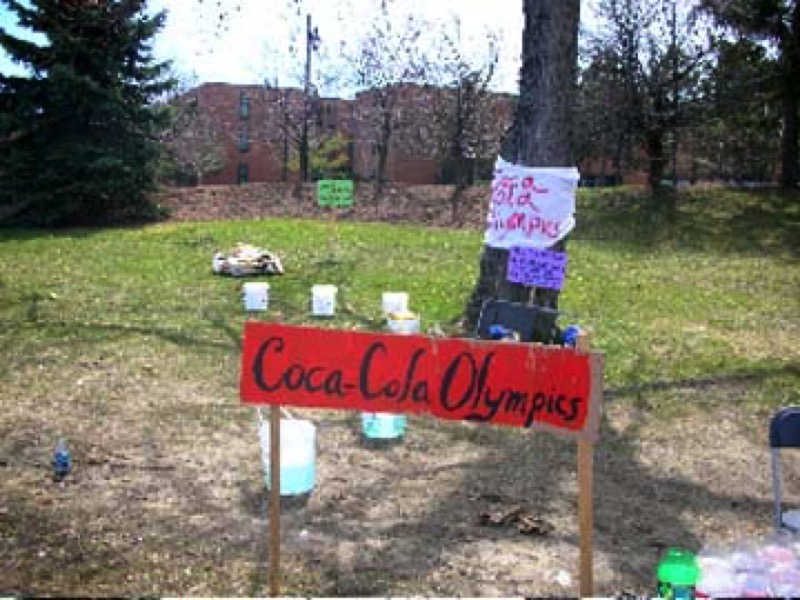
These crimes were transformed into carnival activities for people to participate in and learn about Coke's misdeeds! These included:
• Steal Groundwater from Indian Villagers Sponge Race which had participants fill a sponge with water from the Indian villager's well and race across to fill a Dasani bottle with the winner being the first to fill their bottle.
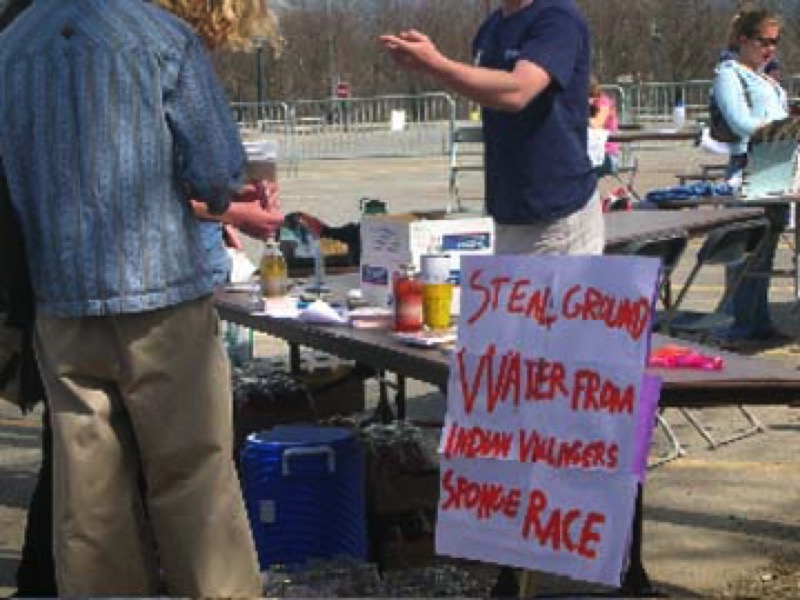
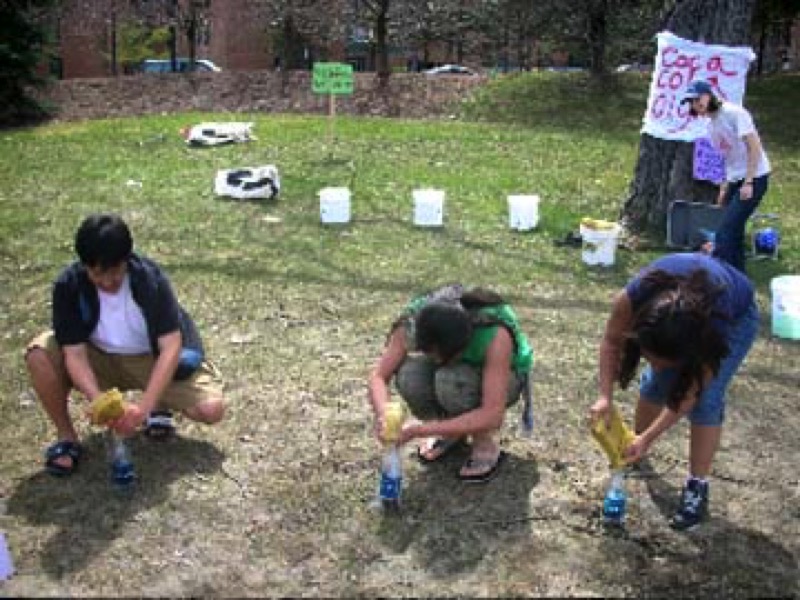
• Contaminate Coca-Cola with Pesticides Rock Toss which had people throw rocks or "heavy metals and lead" into Coke products, similar to ring toss.
• Chased by the Paramilitary Potato Sack Race which had participants represent Colombian trade unionists in burlap sacks trying to out run the paramilitaries or they would be shot by water guns.
• Pollute the Groundwater Around the Bottling Plant Relay Race which had participants get rid of "toxic waste" from a Coke bottling plant by dumping it into a nearby village's groundwater. We had the participants form groups of two to transport the waste by a cup, but couldn't hold the cup so they "wouldn't have any traces on their hands."
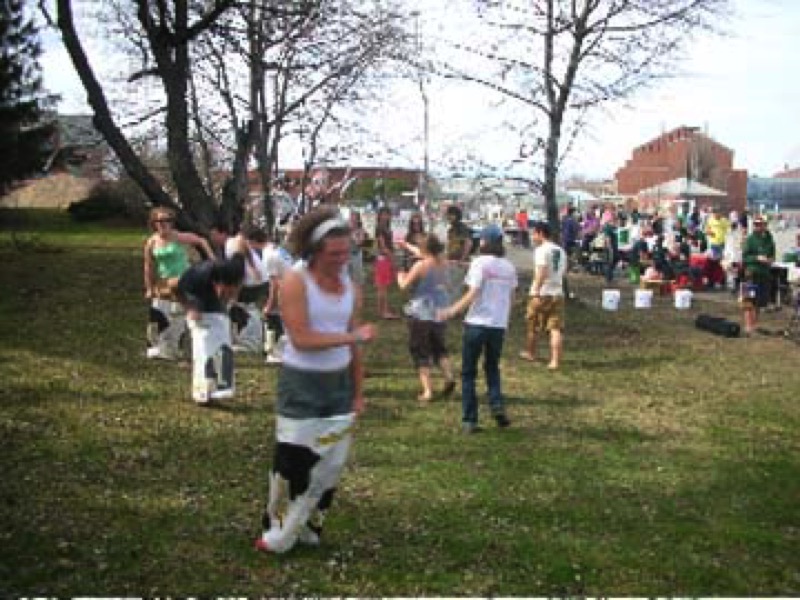

All in all, the event was a big success having many people sign our petition to kick Coke off campus while also providing information about each of these different events. A local drink company named Vtea donated several cases of their product to help us promote a local and healthier alternative to Coke products on campus. Many of these drinks were given away to winners of their events. We even had our university president participate in one of the events!
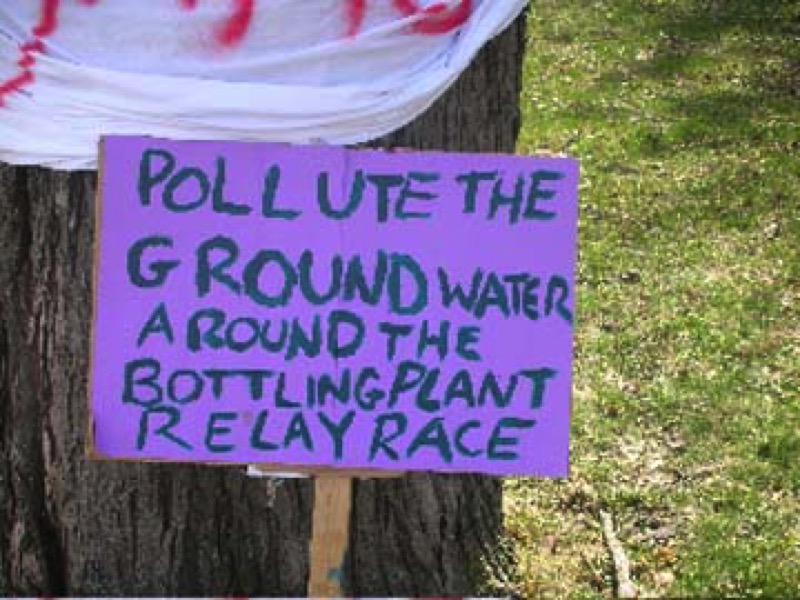
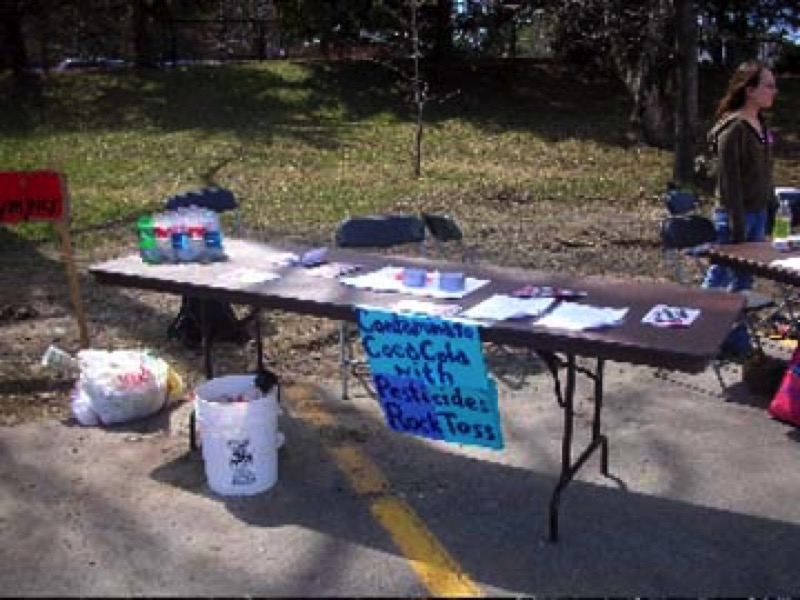
Although our semester is winding down, we received much attention from the event and also recently gave a packet of information to our university president detailing the crimes Coca-Cola has committed. We will be meeting with him to discuss the packet sometime soon. In the meantime enjoy some of the pictures from this event!
DailyIndia.com, "Shareholders rap Coke for not disclosing liabilities in India," April 27, 2007
" 'The Coca-Cola company has finally admitted that it has made mistakes in India but Coca-Cola has not fixed those mistakes. We will continue to increase the pressure on the Coca-Cola company until it is held accountable for the past and present mistakes in India,' said Amit Srivastava of the India Resource Centerwho spoke at the shareholders meeting on behalf of the communities in India campaigning against Coca-Cola."
Marketplace-American Public Media, "To do business in Sudan?" Gretchen Wilson reports, April 25, 2007
Read and Listen to Article
"This Coca-Cola plant in Khartoum sends a million bottles of Coke, Sprite and Fanta speeding around a massive conveyer belt every day. Some Western companies, like Coca-Cola, have gotten a pass to do business here. Through a U.S.-approved licensing process, it sells its syrup to a private Sudanese bottler. But critics say that its brand, its business and the local taxes it generates prop up the country's military regime."
The Minnesota Daily, "Bruininks must answer for Coca-Criminals: The University must be a responsible world citizen," By Adri Mehra, 4/26/07
"Coca-Cola has proven time and again that it opposes or ignores fair labor practices in Latin America, and many communities near the company's bottling plants in India are experiencing severe water shortages and chemical contaminations of groundwater and soil. It is far past time for University of Minnesota President Robert Bruininks to address these issues with Coca-Cola, as our school has the largest remaining campus contract with the corporation."
The Stony Brook Statesman, "SJA Gains Momentum Against Coke: Student Voices Heard, By Adam Peck, April 23, 2007
Read Article
Associated Press, "Critics Speak at Coke Annual Meeting," By Harry R. Weber, April 18, 2007
International Brotherhood of Teamsters (Press Release), "Teamsters Tell Coke Shareholders: Picketlines Next Step: Teamsters Say Mismanagement at Coke Hurting Company, April 19, 2007
The News Journal, "Protesters greet Coca-Cola execs at meeting: Activists voice concerns, but shareholders focus on bottom line," By Luladey Tadesse, April 19, 2007
Read Article
India Resource Center (Press Release in Scoop Independent News), "Coca-Cola Rapped at Shareholders Meeting, April 19,2007
Read Release
CNNMoney.com, "Bottled water: No longer cool?: Activists turn up the heat on Coca-Cola, PepsiCo and Nestle, says Fortune's Marc Gunther," By Marc Gunther, April 25 2007
Read Article
"Gina Solomon, a physician and senior scientist with the Natural Resources Defense Council, who oversaw the group's 1999 study, uses a low-cost filter at home and a reusable bottle of tap water.'People complain about the cost of gasoline,' Solomon says. 'No one seems to realize that they are paying for a picture of pretty mountains on the label and a product they could get for free from their own tap.'
"Salt Lake City's outspoken mayor, Rocky Anderson asked city officials to stop handing out bottled water at meetings. 'The environmental impacts surrounding the production, shipment and disposal of bottled water do not fit within the city's goal to conduct itself in an environmentally sustainable way,' Anderson wrote.
"A handful of high-end restaurants - including Chez Panisse in Berkeley, the home of celebrity chef Alice Waters - have stopped serving bottled water.
Commondreams.org (Corporate Accountability International), "Questions About Coke's Abuses Still Outnumber Answers at Shareholders' Meeting," April 18, 2007
Read Article
Webcast of 2007 Coca-Cola annual shareholders meeting
Watch Webcast of 2007 Shareholders Meeting
Independent Media Center, "Westchester County, NY Wholesaler Calls for Boycott of Coca-Cola: The global abuses by Coca-Cola are now being brought to light by local action," By Jason Gooljar, April 16, 2007
Read Article
Miami Herald, "Payoffs to Colombian terrorists scrutinized: Chiquita Brands International is just one of several U.S.-based companies facing allegations of wrongdoing in Colombia," By Jane Bussey & Steven Dudley, April 16, 2007
The Wooster Voice, "Panel holds forum, looks into specifics of Coke boycott," By Chalkie Horenstein, April 6, 2007
The-Daily-Record.com, "College of Wooster Students debate value of banning soft drink, By Linda Hall, April 13, 2007
Read Article
Gulf News (The Christian Science Monitor), "A cautionary tale," By Sibylla Brodzinsky, April 13, 2007
Read Article
"At least three multinationals operating in Colombia - coal mining giant Drummond, Nestle, and Coca-Cola - have been targeted in civil lawsuits in the US that claimed these companies paid paramilitaries to kill or intimidate union workers. The Chiquita case could pave the way for investigations into other companies, as well...'If Chiquita can be prosecuted, then Drummond can,' says Terry Collingsworth, an attorney with the International Labour Rights Fund which supports civil lawsuits against Drummond, Nestle, and Coca-Cola."
The Daily Tar Heel (University of North Carolina), "Activists engage in cola war," By Clint Johnson, April 12, 2007
The Daily Tar Heel, " Coke faces world of critics" By: Clint Johnson, April 11, 2007
"Recently, Coca-Cola has come under fire for conducting business with a bottler in Sudan. A military dictatorship controls the Sudanese government and is blamed for atrocities in Darfur, where hundreds of thousands of people have been killed...'They're backing up an economy and paying taxes into a big military regime,' [Campaign Director Ray] Rogers said. He also said it could hurt the company if universities that contract with Coca-Cola begin making an issue of its involvement in Sudan."
The Daily Tar Heel, "Murder in Colombia: the real thing?" By: Clint Johnson, April 10, 2007
World Peace Herald (Washington Times, "Bolivian farmers demand right to coca industry: 'If Coca-Cola can do it, why can't we?' By Martin Arostegui, April 12, 2007
" 'Coca-Cola has bought 4 tons of coca from my syndicate in Chapare. If they can industrialize coca, why can't we?' asked Margarita Teran, who heads the coca committee of Bolivia's Constituent Assembly, which is writing a new constitution.
"A U.S. government official familiar with the process confirmed that coca leaves are imported into the United States from Bolivia and other Andean countries to two private companies, where they are processed under the supervision of the U.S. Drug Enforcement Administration (DEA) to eliminate any cocaine. The cleansing process rids any trace of the drug from the leaves, which are then used as a flavoring agent for Coke, the official said."
The Michigan Daily, "Coke investigations behind schedule: Inquiries into alleged violations were slated to end in May," By Emily Angell, April 10, 2007
"When Coke products were brought back to campus in April of 2006, the Dispute Review Board set a deadline for assessments of the conditions in both countries to be completed by March 31, 2007 and be reported to the University by April 30. By May 31, Coke is required to have a plan of action in place. So far, the investigations have missed the March deadline."
" 'It's really a comedy of sorts if you look at it,' Rogers said. 'The ILO investigation and their office in Colombia doesn't exist now and won't ever exist.' Rogers, like many involved with the issue, is especially concerned about the ties between Potter and the ILO, because Potter's involvement in both the ILO and the Coca-Cola Company. 'The ILO cannot be considered unbiased because of their relationship with Ed Potter,' he said.'
Read the Campaign's "University of Michigan Falls Prey to Another Coca-Cola PR Scam," April 17, 2006
PR-Inside.com, "Teamsters Protest Coke Layoffs at Padres Game in Southern California," April 12, 2007
IUF, "Transatlantic union action: Coca-Cola workers demand basic rights and guarantees," April 10, 2007
Read Article
"On 21 March, 2007 the 25th IUF Congress unanimously supported an emergency resolution submitted by the International Brotherhood of Teamsters (IBT), representing around 14,000 CCE and Coca-Cola workers in the USA.
"The resolution demanded, among other things, that CCE and the Coca-Cola Company recognize the right of their union employees to job security, union representation in cases of restructuring, and engage in meaningful dialogue and negotiations with their unions and works councils over a sustainable, long term strategy for growth and employment."
IUF, "Tell Coca-Cola 'Every Worker Counts' - April 2 transatlantic Coke protest day," March 30, 2007
Read Article
Read the Action Leaflet
India Resouce Center Press Release, "Coca-Cola Booted from the University of Guelph," April 5, 2007
Read Press Release
Earthtimes, "Canadian university students say 'No' to Coca-Cola," Indo Asian News Service, April 6, 2007
Read Article
" 'Students have voiced their opinions loudly and clearly. We want ethical choices on this campus. We are breaking our brand loyalty to Coca-Cola and standing up for human rights and the environment in India and Colombia,' said Becky Wallace of the central student association at the University of Guelph."
The Western Courier (Western Illinois University), "Pick Pepsi over Coca-Cola," By Jessie Kallman, April 2, 2007
Read Article
Watch this video in which Campaign Director Ray Rogers answers a question about switching to Pepsi
Part Four (1:59) Rogers answers a question about whether there is any sense in switching to Pepsi (Watch additional videos from this speech below.).
Press Release, "Teamsters Converge on Times Square to Protest Coke's Anti-Worker Tactics: Teamsters Put Coke On Notice For Possible Job Actions Over Worker Abuses," International Brotherhood of Teamsters, April 2, 2007
Read Press Release
" 'Coke is discriminating against union workers, cutting health care benefits and risking American families' futures,' said Jack Cipriani, Director of the Teamsters Brewery and Soft Drink Workers Conference. 'Coke has essentially declared war on workers here in the United States and around the world, and the Teamsters will not stand for it. We are putting Coke on notice today that it must clean up its act.' "
Press Release, "In Atlanta, Union Cites Labor, Human Rights, and Environmental Abuses," International Brotherhood of Teamsters, March 31, 2007
Read Press Release
"Teamsters rallied today in Coca-Cola's hometown of Atlanta at the NCAA Men's Final Four game to urge the NCAA to drop key sponsor Coca-Cola. Along with Teamster members handing our fliers, six Teamster tractor-trailers displaying banners reading 'Coca-Cola Cash Corrupts - NCAA: Dump Coke Sponsorship' surrounded the Georgia Dome in Atlanta."
Guelph Mercury, "Squeezing out Coke: Students want it off campus," By Thana Dharmarajah, March 30, 2007
Read Article
"The University of Guelph's contract with Coca-Cola expires in August and students want to push for a different soft-drink supplier. In a referendum during student elections last week, nearly 65 per cent of the 4,780 students who voted said they want an alternative supplier."
The Beacon, "Coke should be kicked off campus," By Jose Pagliery, March 29, 2007
Read Article
"The claims against Coke show a degree of legitimacy. As reported by the American Anthropological Association in 2004, Coke's bottling plant companies have been in collusion with local right-wing paramilitaries with hopes to dissolve unionizing of factory workers...Surprisingly, Coke refuses to allow for independent investigations of their bottling plants, forcing groups like the AAA to conduct secret interviews with workers who are put at risk by speaking to them in the first place. In response, Coca Cola was removed from the Broad Market Social Index of KLD Research and Analytics Inc. on ethical grounds. The highly respected TIAA-CREF, a $380 billion financial services group, then banned the company from their Social Choice Account."
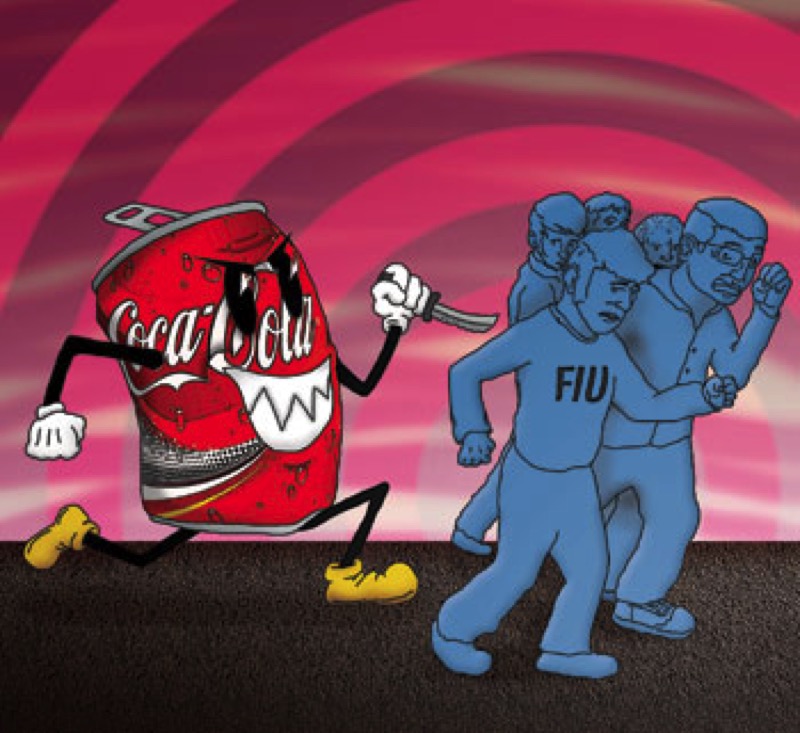
Graphic by Jon Roberts/The Beacon
The Michigan Daily, "Coke has returned but still in violation of code," Letter to Editor by Clara Hardie, March 26, 2007
The Economic Times, "Social responsibility: Coke flunks?" Brand Republic, March 26, 2007
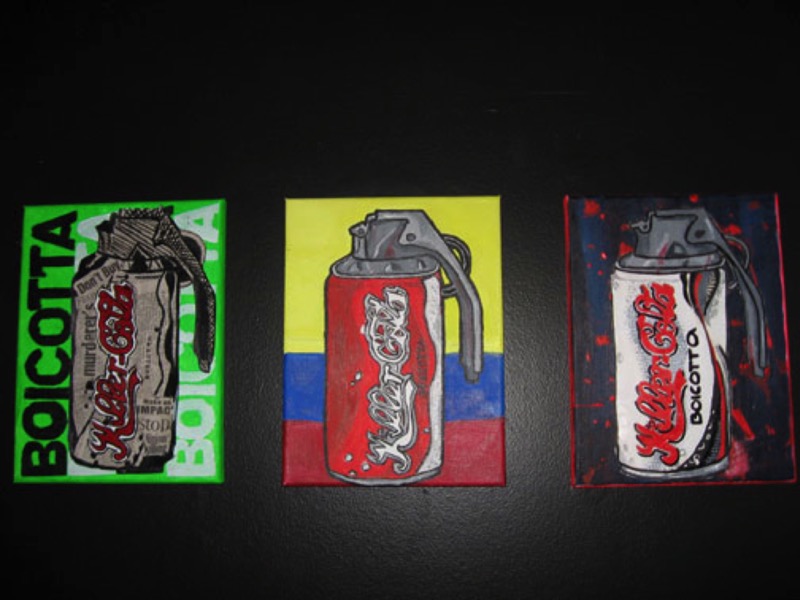
Western News, "Challenge injustice? Let's start with Coke," By Steve Duncan, March 22, 2007
The Undercurrent, "Fresno City College students win a motion to end Killer Coke's exclusive vending monopoly," March 6, 2007
Read Article
Press Release, "Unions Worldwide Condemn Coke for Cuts in Jobs, Retirement, Health Care: International Union of Food Workers Passes Unanimous Resolution, March 21, 2007
Press Release, "Teamsters Urge NCAA to Drop Coke Sponsorship: Union Cites Labor, Human Rights, and Environmental Abuses," International Brotherhood of Teamsters, March 16, 2007
"Teamsters rallied today at NCAA Men's Basketball Tournament games in Chicago; Spokane, Washington and Columbus, Ohio to urge the NCAA to drop key sponsor Coca-Cola. The union cited concerns about Coca-Cola's destruction of natural resources in developing countries, its worker and human rights abuses in the U.S. and abroad, and the elimination of good-paying U.S. jobs at Coke bottler and distributor Coca-Cola Enterprises (CCE)."
The Hamilton Spectator, "The Coke Deal: Students at several Ontario universities are questioning whether Coca-Cola should be selling its beverages on campus. The issues are choice and accusations of human rights violations," By Barbara Aggerholm, Mar. 15,2007
"Several U.S. colleges have ended contracts with Coca-Cola, although that has not happened in Canada. Watson [Hayley Watson, a third-year McMaster student who is president of McMaster Campus Choice] said the list of Canadian campus groups is growing and includes the University of Ottawa, Ryerson University in Toronto and Kings University College at the University of Western Ontario, London."
The Independent, "Manchester students ban Coke in human rights protest," By Martin Hickman, March 10, 2007
Read Article
"Students at Manchester University have banned Coca-Cola in protest at the American company's alleged abuses of human rights and the environment. A motion banning the company's fizzy drinks from the student union's shops and bars because of its behaviour in Colombia, Turkey and India won overwhelming support at a meeting this week. The decision, approved by 400 votes to about 20, means the 36,000 undergraduate and postgraduates at one of Britain's biggest universities will now drink Virgin or another cola rather than the world's number one soft drink."
gair rhydd online (Cardiff Student Weekly), "Students say no to Coca-Cola at Manchester University Students' Union," By Natalie Parkinson, March 10, 2007
Read Article
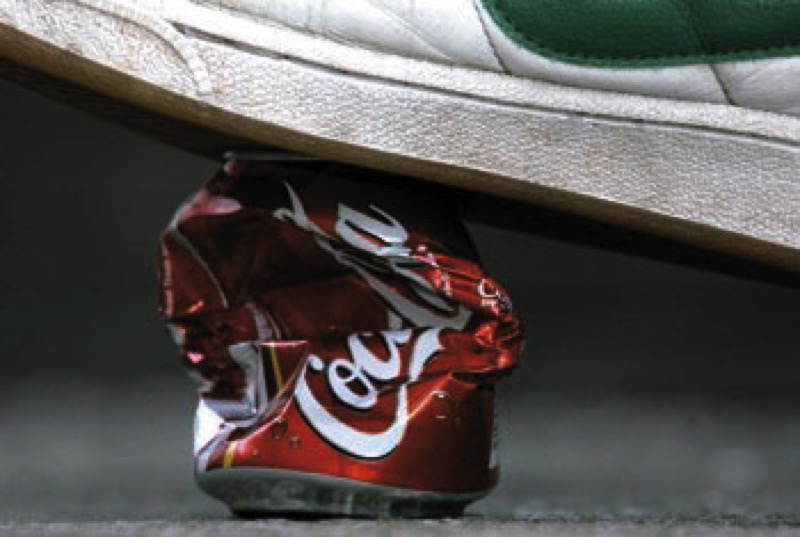
The Korea Times, "Manchester Students Ban Coke in Protest at Rights Abuse, March 12, 2007
Read Article
University of Kent, UK, "Enjoy a Coke-Free Campus" Resolution at University of Kent Canterbury, UK
The resolution has 357 Signatures so far.
"We the undersigned, are students and members of staff at the University of Kent Canterbury. We believe that Coca-Cola is an unethical company, and would like the sale of its products on campus to cease."
Metroland, The Alternative Newsweekly of New York's Capital Region, "The Cola Wars," By David Canfield, March 2007
Read Article
Park Slope Reader, "Water, water everywhere, but is it green to drink?" By Elizabeth Ruksznis, Winter 2007
Read Article
Read "Bottled Water: Top 10 Reasons Not to Buy It
A note from the webmaster:
I would like to apologize to campaigners for allowing our Killer Coke website to remain untouched for the past two weeks. I was traveling in Morocco finding The Coca-Cola Co. omnipresent and meeting people who might carry our campaign into that country.
I met students, workers and a couple of progressives who serve on committees to reform the more backward structures of that society. At least one of them was very interested in our campaign.
Below are a couple of photos of waiters in a seafood restaurant in Essouaira (or as I called it, "Coke City"), a beach resort attracting many tourists. The entire town is filled with awnings advertising Coca-Cola and Ciel, the water produced by Coke in Morocco. When I showed our flyer to this worker, he stood on the side and slowly read it translating it into French or Arabic. He also asked me to give our flyer to two other co-workers which I did.
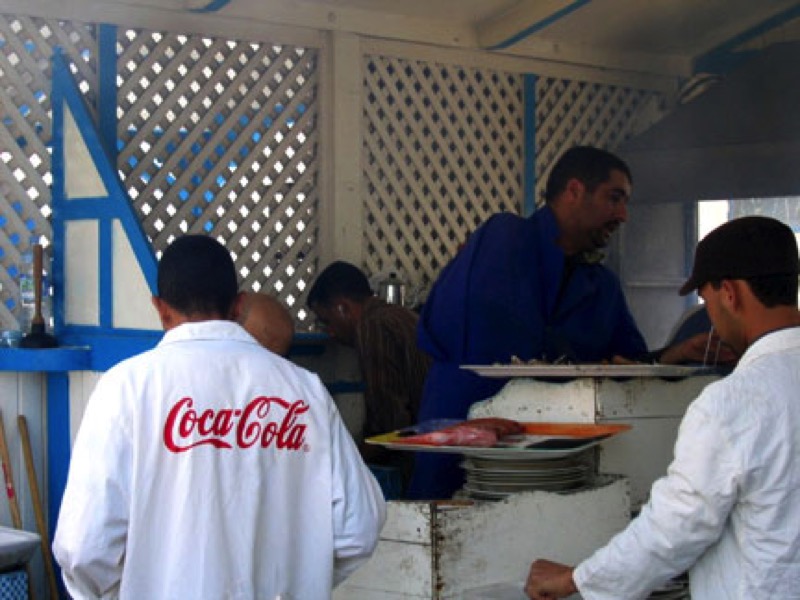

In traveling in Morocco, the first thing you often see as you approach a small town is a large red sign on the side of a building which turns out to be a Coke ad. The red of the ad stands out in contrast to the greens, browns and whites of its surroundings. Inside the town are often awnings with Coke's ads in English and in Arabic. In at least three of the towns we visited were red plastic tables and chairs supplied by Coke with Coke's logo very visible.
I have heard that this is common throughout the world, especially in poor countries that can least afford to purchase Coke's products.
Now that I am back, we will try to update the site with lots of information that has been coming to our office during these two weeks.
Click to see more omnipresent Coke ads throughout Morocco.
Stony Brook Independent, "Coke Campaigners Focusing on Next Contract," By By George Agathos, February 20, 2007
Read Article
Pepperdine University Graphic, "Risky Business," By Ashlyee Hickman, March 2, 2007
Read Article
The Hamilton Spectator, "Watergate: How bottled water could drink Canada dry," By Dianne Rinehart, March 3, 2007
Trinity Students Vote to Boycott Coke
"Trinity Students [Ireland] have voted in a landslide victory for the boycott of Coca-Cola products due to the murder of Coke workers and trade unionists in Colombia. Since 2004, the Trinity Student Union controlled shops have ceased to sell all Coca-Cola products. Over 2,000 students voted in support of the boycott - the largest number of Trinity students ever to support the boycott.
"Speaking on behalf of the Boycott Killer Coke Campaign, Cait Ni Dhubhda said:
" 'This is the 3rd time that student in Trinity have voted against selling Coke products and in favour of human rights. This is also the largest ever vote by Trinity students in favour of the boycott - showing that the campaign is growing rapidly in strength. Since 2004, over 34 colleges around the world together with several trade unions have now joined this campaign. It is time for Coca-Cola to clean up its act in Colombia. This campaign will continue to grow until Coke respects the right to join a union.
" 'This is a clear message from Trinity students to the Trinity College authorities to stop selling Coke. It is unacceptable that the college continues to ignore the democratic wishes of the students and we are calling on them to immediately cut all contracts with Coca-Cola. Colombian Coke workers have been tortured, intimidated, threatened, kidnapped and killed simply for joining a trade union. It is time that Trinity College ceases to be associated with such human rights abuses.' "
The Vote:
Trinity Students Vote to Boycott Coke ¯ 2007
| Description | 2004 | 2005 | 2007 |
| For Coke Boycott | 1816 | 1926 | 2029 |
| Against Coke Boycott | 1680 | 1737 | 1199 |
| Margin of victory | 136 | 186 | 830 |
| Total Valid Poll | 3,496 | 3,663 | 3,226 |
| % for Boycott | 51.9% | 52.6% | 62.9% |
Indymedia Ireland, "Report from Boycott Killer Coke meeting in Trinity,"
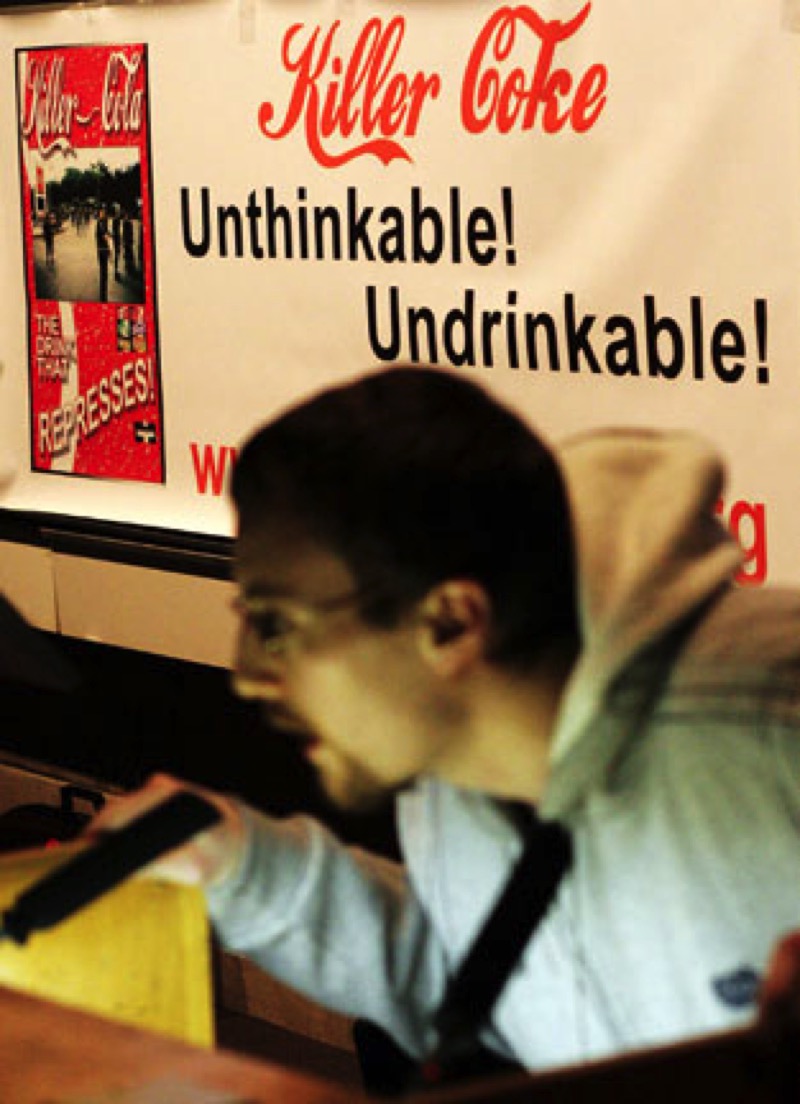
Gavin Bushe at Trinity
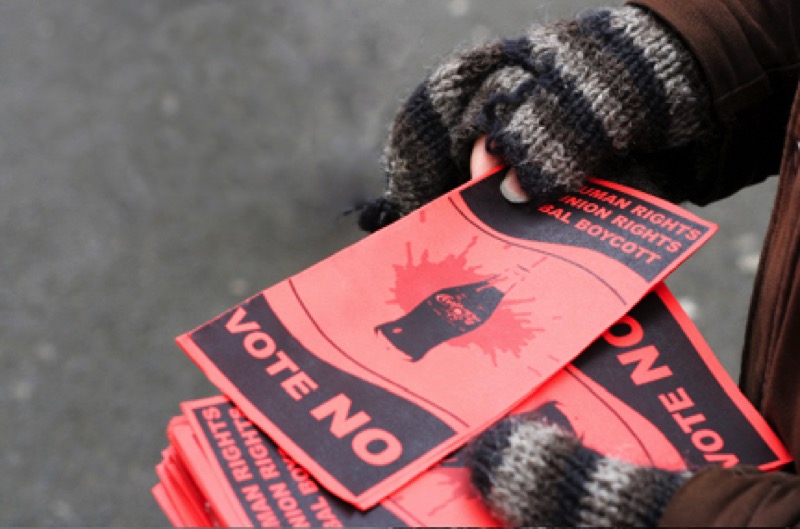
"Vote No" flyer distributed by Trinity Student Union
The Beacon (Florida International University), "Students question Coke's ethics," By Christopher Newland and Maria Chercoles, March 1, 2007
Read Article
"The Student Government Association has decided to support a student campaign asking that the University think twice before renewing its contract with Coca-Cola this April...
"The Coca-Cola Company currently has a 10-year exclusivity contract with FIU under the terms that the contract will open for revision and bidding after its fifth year, which will occur at the end of this semester."The Voice (UK), "Support Grows for Coca-Cola Workers:The UK-based Haiti Support Group has backed unions in the Caribbean against action by a Coca Cola subsidiary," March 1, 2006
Read Article
Co-op America's Real Money, "The Sinister Side of Soda: The unvarnished truth about how soda consumption affects your family's health, the environment, and communities around the world," By Tracy Fernandez Rysavy, January/February 2007
Read Article
"When it comes to the health effects of drinking soda, it's hard to separate fact from scary urban legend. Do sodas cause esophageal cancer? Can you get brain tumors from drinking too many diet sodas? Are there really 19 teaspoons of teeth-rotting sugar in each can? And just how much extra weight could you lose by kicking the can-a-day habit?
"Real Money dug deep to find the facts about soda consumption and how it affects your family's health, the environment, and communities around the world. Once you discover the true facts about soda, you may want to curb your consumption and, with our help, look for healthier alternatives."
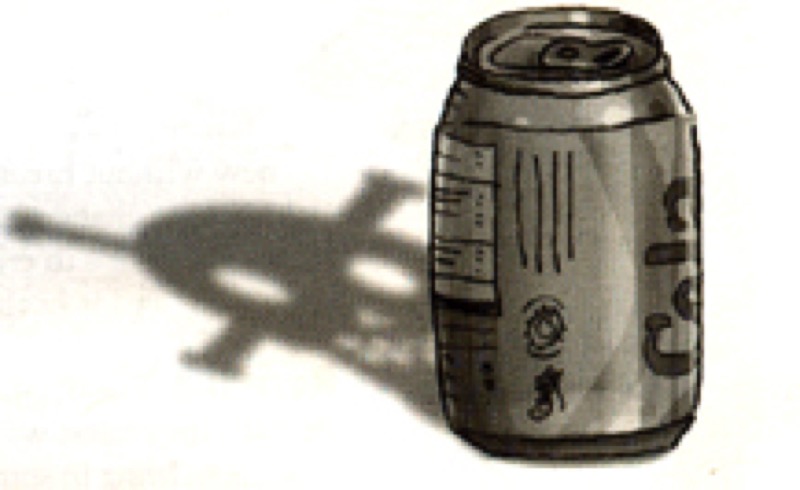
The Gateway(University of Alberta, Canada):
"New complaint aimed at Coke Yes: Ballot beef argues Coca-Cola advertising, Gateway opinion article should be seen as pre-campaigning," By Scott Lilwall, February 27, 2007
"CRO penalty not very sweet, Decision on pre-campaigning materials should apply to soft drink giant too," By Jessica Warren, February 27, 2007
"I'm thrilled that the University has taken such a hard stance on pre-campaigning--it's not as though Coke machines every 30 feet, bright red Coca-Cola cups everywhere on campus and million-dollar commercials count as swaying the masses. We wouldn't want an under-funded, under-represented group to have an unfair advantage over a billion-dollar international corporation would we?""Enjoy Bitter Irony," Letter from Emily zzzzzzz
St. Cloud Times, "Times Writers Group: Bottled water hurts environment," By Jeanette Blonigen Clancy, February 26. 2007
"We've been had. We buy expensive bottles of water when we could just turn on a faucet. How expensive? According to The Sierra Club, bottled water costs 1,000 times more than tap water...The National Resources Defense Council tested bottled water and found a third of it contaminated with bacteria, synthetic chemicals and arsenic. The FDA's regulations on bottled water are weaker than the EPA's regulations on tap water."
Sierra Club, "Corporate Water Privatization: Bottled Water Campaign"?
Go to the Sierra Club's Bottled Water Campaign Website
"How safe? Many people think bottled water is safer than tap water. There is no such guarantee. The Environmental Protection Agency (EPA) has strict water quality standards for tap water, but the EPA does not oversee bottled water. Bottled water sold across state lines is regulated by the Food and Drug Administration (FDA). The FDA interprets EPA clean drinking water regulations and applies them selectively to bottled water. While the FDA requires water sources to be 'inspected, sampled, analyzed and approved,' it only has one inspector so the industry does the inspecting. Nor do the FDA regulations prevent bottling companies from drawing water next to industrial sites, underground storage tanks, or dumps."
Sierra Club, "Bottled Water: Learning the Facts and Taking Action"
Read the Sierra Clubs Brochure on Bottled Water
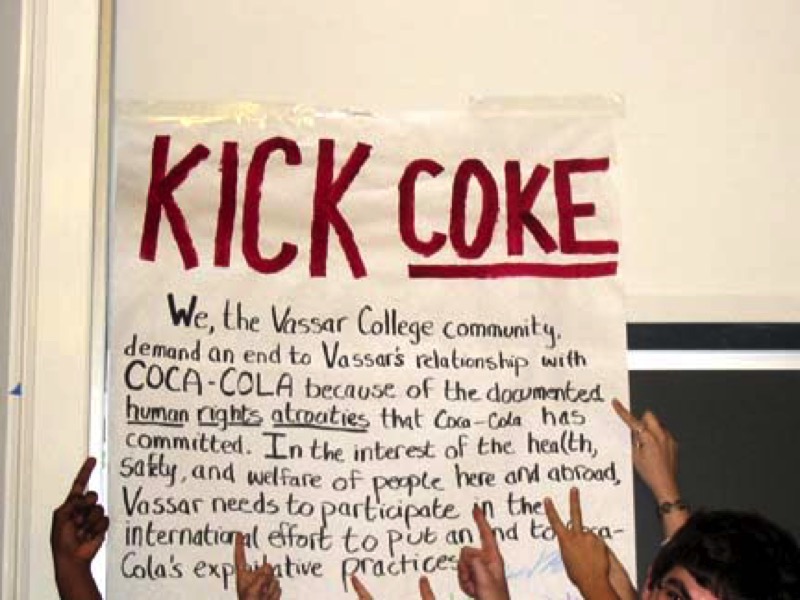
Photo from the Vassar Kick Coke Campaign
Kick Coke Campaign Mission Statement:
We the Vassar community demand an end to Vassar's relationship to Coca-Cola because of the documented human rights atrocities that Coca- Cola has committed. In the interest of the health, safety and welfare of people here and abroad, Vassar needs to participate in the international efforts to put an end to Coca-Cola's exploitative practices.
Members of the Vassar Kick Coke campaign created a Coca-Cola Monster with 9 arms, each with the name of a union leader killed in Coca- Cola's Colombian bottling plants. (See more photos by clicking here.)
The New York Times, "Foreign Minister of Colombia Quits in Scandal," By Simon Romero, February 20, 2007
Read Article
Read Original New York Times Article by subscription.
"The resignation of Foreign Minister Maria Consuelo Araujo came days after Mr. Uribe expressed support for her. But fallout from the arrest last week of five politicians, including her brother, Senator Alvaro Araujo, on charges of working with paramilitary squads in a kidnapping case related to the scandal, made her presence in the cabinet untenable." And this is the government that The Coca-Cola Co. claims cleared the company in impartial investigations of SINALTRAINAL's allegations of labor and human rights abuses.
A report from December: "On 12 December [Colombian Vice President] Santos attacked the union's fight for justice from notorious multinationals Coca Cola, Nestle and other private corporations, and contended that they are pushed by 'sectors of the extreme left, radicals infiltrated into trade union sectors that are generating absolutely absurd campaigns against the corporations'. In Colombia this is a green light for paramilitary attack and, following Santos prompt, two days later the 'Black Eagles' left a death threat inside the home of Barranquilla SINALTRAINAL activist EURIPIDES YANCE, also targeting his fellow Coca-Cola workers LIMBERTO CARRANZA, CAMPO QUINTERO and several local trade union, student and social movement leaders, as well as defenders of human rights. The Black Eagles gave their targets one week to leave, or else."
Our Action Alert regarding a February threat against SINALTRAINAL leaders by the Black Eagles
"Coca-Cola: Coke Kills," by Vanessa Jones-Brewer
"This is a project I did that was originally intended to be a slide show. It's about Coca-Cola and Multi-National corporation and how it treats it's workers."
Use this link to see video or click above.
BeverageDaily.com, "CCE execs get cash bonus ahead of job cuts," By Chris Mercer, February 20, 2007
Associated Press, "Largest Coke bottler to cut 3,500 jobs after big 4Q loss," By Harry R. Weber, February 14, 2007
Waterloo Record, " Students vs. Coke:Group presses University of Waterloo not to renew contract with Coca-Cola," By Barbara Aggerholm, February 19, 2007
Read Article

Miriam Papps is part of the Students Against Sweatshops, a University of Waterloo group urging students to investigate companies' ethics before buying their products.
(Photo by Peter Lee, Record Staff)
The Daily Vidette Online (Illinois State University), "Black S.T.A.R.R. protests Coca-Cola's ISU contract," By Guadalupe Rosales, February 16, 2007
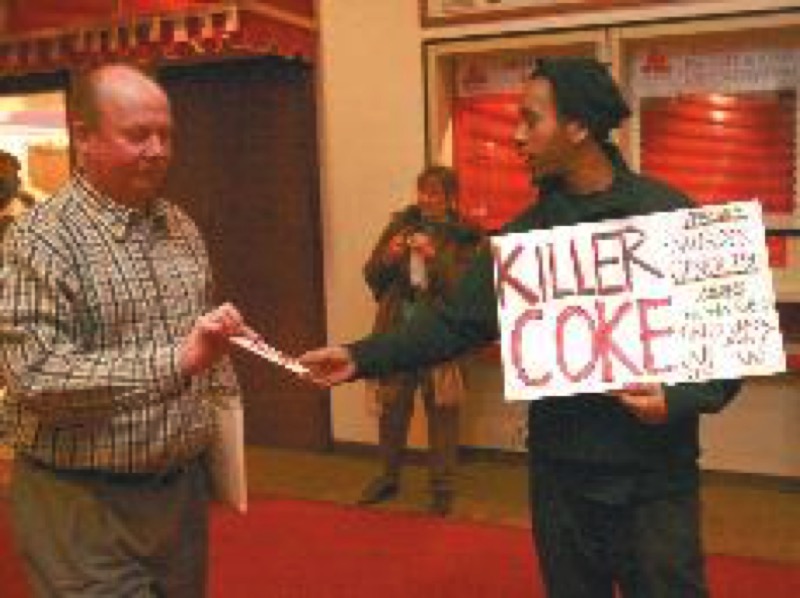
Media Credit: Jim Moldenhauer / Daily Vidette Staff
WJBC (Illinois), The Online Voice of McLean County, "Students Want Cola Cancellation," February 18, 2007
February 16, 2007 Double Action Alert
1. Death Threats Against SINALTRAINAL (English & Spanish), call Coca-Cola 1-800-GET-COKE and Colombian Embassy — (202) 387 8338 in the United States — to express your concern regarding these threats. More info and Canadian contact in the Alert, in other countries use the link in the Alert to look up the Colombian Embassy in your country and contact them.
(From Colombia Solidarity Campaign)
2. TIAA-CREF is Deciding on Issues & Companies to Take On — Call & Email Them; Call TIAA-CREF and tell them that if they remain invested in Coca-Cola and other companies such as Wal-Mart, Costco, Nike, Altria/Philip Morris, and Chevron, that they should direct their proven record of shareholder advocacy to change these companies' irresponsible behavior. Call and ask for CEO Herbert Allison at 800-842-2733 or 212-490-9000 (leave message with an assistant) More info in the Alert and details about sending an email.
(From Make TIAA-CREF Ethical)
The Gateway, "Anti-Coke posters net $900 fine," By Scott Lilwall, February 13, 2007
Campaign to Stop Killer Coke Director Ray Rogers spoke at International Week at the University of Alberta on January 29, 2007. Here are some of the highlights.
Click above the watch overview (Part 1); click below for other parts of speech and response to questions.
Part One (9:15)
This is a general overview of the Killer Coke campaign.
Part Two (4:31)
In this section, Rogers discusses improper studies of Coke's labour policies in Columbia.
Part Three (2:56)
Rogers answers a question about Coke's labour practices in Columbia.
Part Four (1:59)
Rogers answers a question about whether there is any sense in switching to Pepsi.
Part Five (5:10)
Rogers answers a question about his strategies for keeping Coke off campuses and discouraging people to purchase it.
Part Six (6:07)
Rogers further explains problems with Coke's labour practices.
Part Seven (8:06)
Rogers discusses Coke's labour and health concerns in India.
Part Eight (5:37)
Rogers discusses Coke's labour practices in Mexico and Sudan.
Part Nine (4:50)
In response to a question, Rogers discusses the impact of banning Coke on workers.
Alter Presse, "Solidarity with workers at Coca-Cola subsidiary: Haiti Support Group backs Cap-Haitien bottling plant union," By Charles Arthur, February 14, 2007
Read Article
Campaign to Stop Killer Coke, "10 Critical Talking Points," February 14, 2007
Read Talking Points in html
Coca-Cola Black History Timeline: Coca-Cola Marketing Meets Coca-Cola Facts.
See video of Coca-Cola Facts
See Coke's original video of Coca-Cola Marketing
Associated Press, "Coca-Cola 4Q Earnings Decline 22 Percent," February 14, 2007
Ronald McCroak and the Cadavers, "F**k the Defamation," A song about abuses by Coke and McDonalds, from Sunshine Coast, Queensland, Australia
"We value children so much in our lives and yet we allow them to become addicted to products that ultimately cause them the greatest harm. We abhor people in society who exploit and harm children, and yet, we allow companies to constantly advertise products that are unhealthy and which lead to life threatening conditions. McDonalds, Coca-Cola, et al and child exploiters prey on children in similar fashion. With manipulation, coercion, untruths and outright lies. And if child exploiters had the type of public relations budgets of McDonalds and Coke, there wouldn't be a convicted child exploiter in jail."
Ronald wrote us: "It's very confrontational with some swear words but it's all in context." (Click on the name of the song in the upper right)
Read the lyrics to the song
Foodconsumer.org news release, "Enviga study casts doubt on calorie burning & weight-loss claims, Feb 12, 2007
Read Article
"Six of the 31 participants actually burned up to 10 percent fewer calories after three days of consuming the ingredients in Enviga. 'If you follow Coke's and Nestle's logic, then about one in five consumers will eventually get fatter from drinking Enviga every day,' said CSPI senior nutritionist David Schardt. 'They've been withholding this information from their customers.' "
The Tyee (Vancouver, British Columbia), "Students Spill Coca-Cola's Profits: Campus deal killers cost soft drink giant millions," By Eric Szeto, Feburary 6, 2007
Read Article
"But over the past half decade, a pattern has been emerging at postsecondary schools across North America. Student societies, upset about Coke's alleged human rights and environmental abuses in developing countries, have started taking matters into their own hands to cripple the deals. The result is one of the world's largest activist movements since the anti-Nike effort of the '90s, and it's costing the company millions."
Photos from the January 25 Day of Action
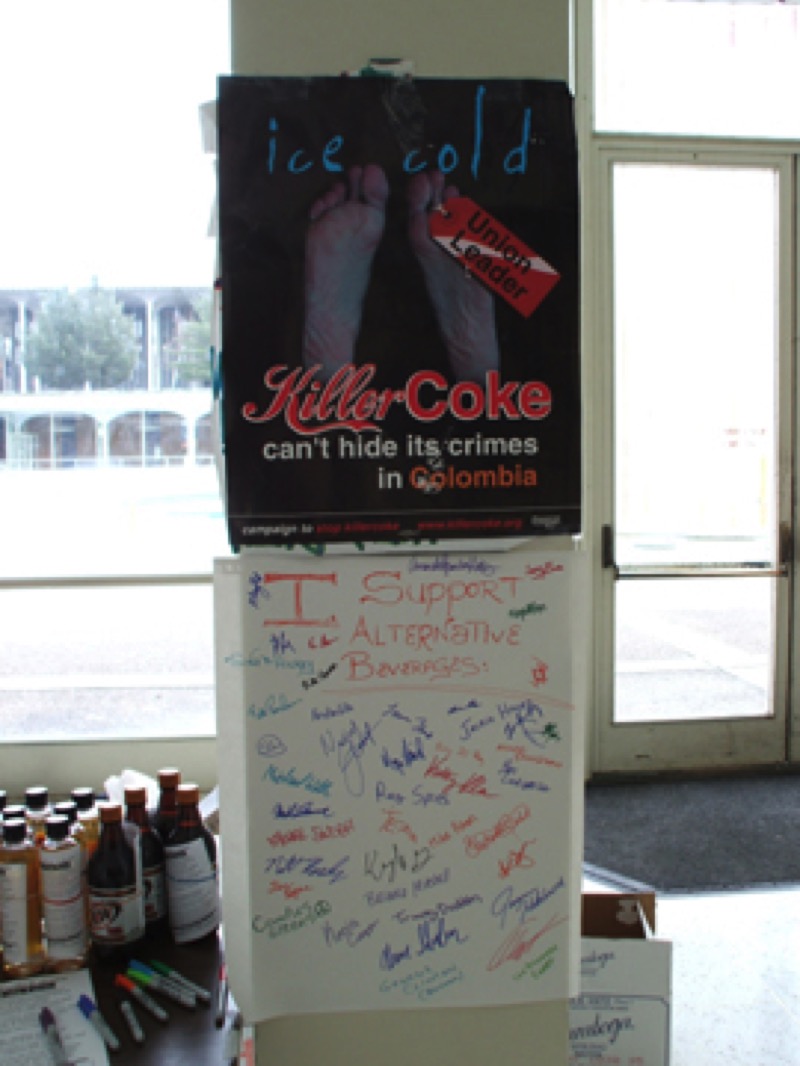
SUNY Albany Day of Action
Campaign Director Ray Rogers speaking at Grant MacEwan College in Edmonton, Alberta, Canada
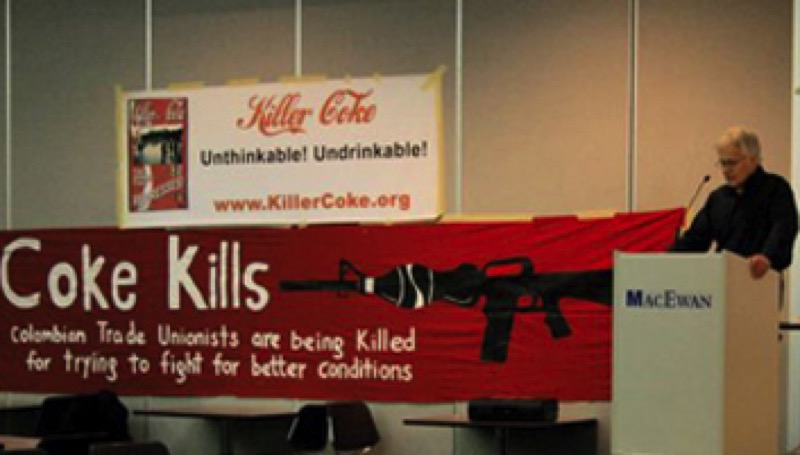
More photos at Student Protest Pics
Yale Daily News, "Commercial recalls old tensions for NFL," By Steven Engler, February 7, 2007
Read Article
"The groans in the room were nearly unanimous…one commercial was notable for a different reason. This one, the 'Coca-Cola Black History Timeline,' was more than inappropriate — ; it was disrespectful and misleading." [See satires of the ad below]
Coke's Black History
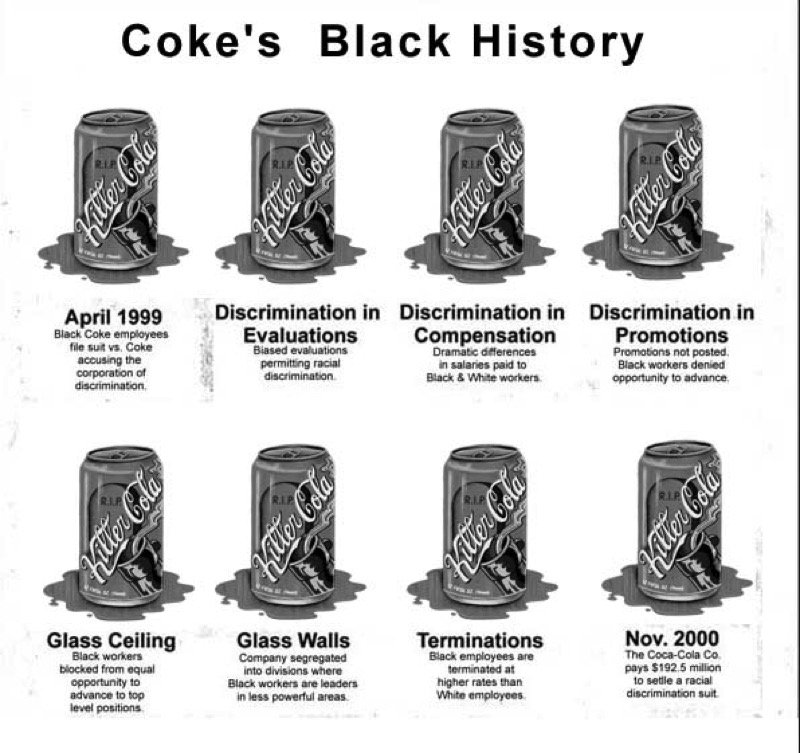
Reuters, "Conn. attorney general wants proof Enviga burns calories," By Jessica Wohl, February 5, 2007
Read Article
Nutraingredients-USA, "Coke and Nestle Enviga lawsuit filed," By Lorraine Heller, February 2, 2007
"Drinks giants Coca-Cola and Nestle have this week been officially slapped with a lawsuit for claiming their new Enviga energy drink can help consumers burn off calories."
Read Article in Business Week
Coke is acquiring Fuze; it is now off our list of alternatives to Coke
Vermont Cynic (University of Vermont), "Coca-Cola Making a Killing: Anti-Coca-Cola activists set up tables outside of campus dining facilities proclaiming the sin of the company," By John Meierdiercks, January 30, 2007
Read Article
The Phoenix, "Coke banished from Sharples, Pepsi reigns," By Rosario Paz, January 25, 2007
Read Article
Local 122 4-U, "Local 122 — ; A Coke-Free Zone," December 2006
UAW Local 122 in Ohio passed a resolution "That UAW Local 122 will not serve Coke products in our hall," and "That we will share this resolution with other UAW bodies and urge them to take similar action." Read Resolution
The Eyeopener (Ryerson University), "Rye and Coke," By Sarah Boesveld, January 23, 2007
Read Article
Press Release, "Jan. 25 Day of Action: Students Organize Against the Coca-Cola Co.," January 22, 2007, USAS
Read Press Release
New York Times, "Colombian Government Is Ensnared in a Paramilitary Scandal " January 21, 2007
Read Article
Video, "State of the Union" The story of Coke in Colombia, produced in Colombia in Spanish with English subtitles
Watch Video
Miami New Times, "Have a Coke and a Trial," By Francisco Alvarado, January 16, 2007
Miami New Times, "Religious Conviction," By Trevor Aaronson, October 12, 2006
"Judge Jose E. Martinez ruled on a contentious case involving the Archdiocese of Miami. Problem is, he's a Eucharistic minister."
Campaign to Stop Killer Coke, "Judge Jose Martinez and Coca-Cola: Conflict-of-Interest Pattern Emerges," January 11, 2007
Read Release
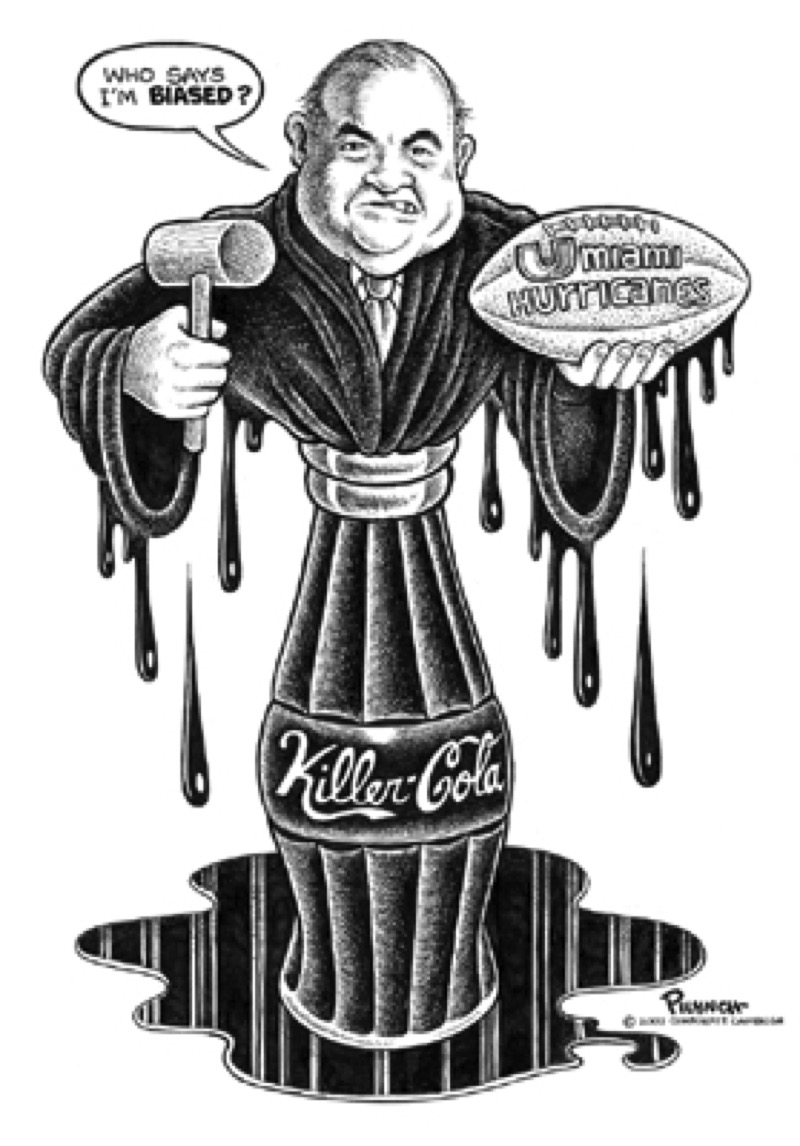
Political Affairs, "Judge Jose Martinez and Coca-Cola: Conflict-of-Interest Pattern Emerges," By Campaign to Stop Killer Coke, January 11, 2007
Read Article
Campaign to Stop Killer Coke, "Campaign to Stop Killer Coke vs. The Coca-Cola Co," January 12, 2007
January 12, 2007 Op-Ed Article
Press Release, Teamsters Local 683 (Southern California), "Teamsters Protest Coke Layoffs," January 14, 2007
"Coke is hiring new, non-union employees to replace the experienced union employees...Coke is now forcing these experienced and reliable workers to reapply for their own jobs at the new facility with no assurance that they will be re- employed or that their Teamster-negotiated wages, conditions and benefits will remain the same."
Hartford Courant, "Cal-burning claims from Enviga drink brew outcry," By Joann Klimkiewicz, January 14, 2007
The Gateway (University of Alberta), "Coke contract raises ethical concerns for SU," By Natalie Climenhaga, January 11, 2007
New Stickers and New Half-Size Flyers
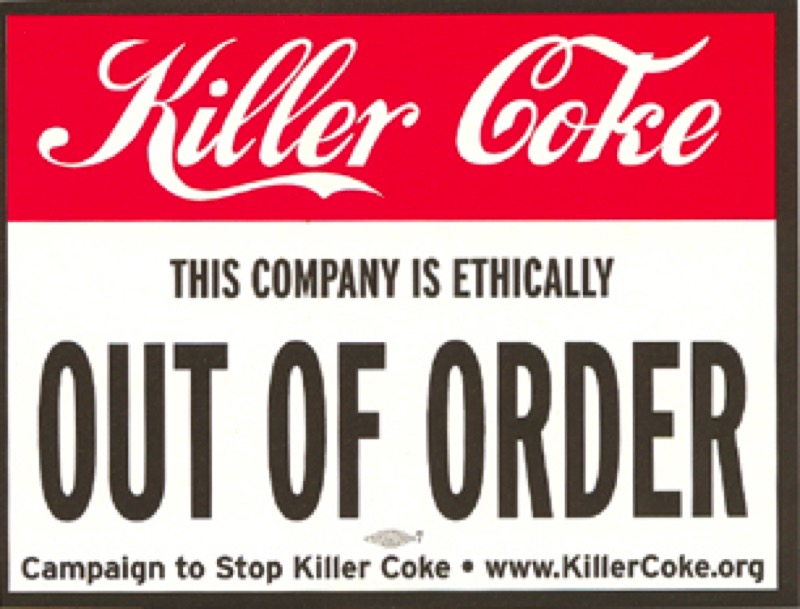
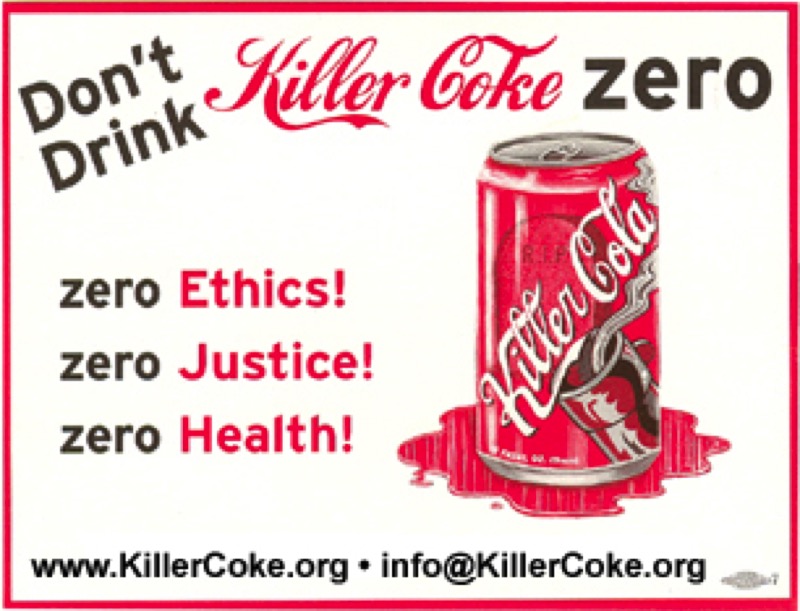
target="_blank"Click for All New Stickers
Print out three of the new stickers.
You can use Avery Standard Labels #5164, six to a page.
Print out three more of the new stickers.
You can use Avery Standard Labels #5164, six to a page.

Click of All New Half-Size Flyers
Order Posters, Stickers and Leaflets
The Age, "Coke in the firing line as caffeine flunks the taste test," By Jill Stark, January 9, 2007
Read Article
"COCA-COLA has come under fire again for fuelling the childhood obesity crisis after Melbourne research found that adding caffeine -- an addictive stimulant -- does not enhance flavour. Soft drink companies say caffeine adds flavour to cola, but a scientific taste test conducted by Deakin University found consumers could not tell the difference between caffeine-free Coke and a version with caffeine. Head researcher Russell Keast said it was "unethical" for companies to use caffeine if it did not enhance flavour and could lead to young people becoming addicted to sugary drinks."
The Christian Century, "Is Bottled Water a Moral Issue?" January 9, 2007
Read Article
"Rooted in the notion that clean drinking water, like air, is a God-given resource that shouldn't be packaged and sold, a fledgling campaign against the bottling of water has sprung up among religious groups."
" 'It's putting marketing hype ahead of science,' Katz said. 'The science here is not ready for primetime. There is a hint in animal research and in very early studies that EGCG can boost metabolism a little bit, but we don't know if that contributes to weight control.' "
Daily Report (Associated Press), "Court agrees to hear Coca-Cola appeal in race discrimination case, By Pete Yost, January 8, 2007
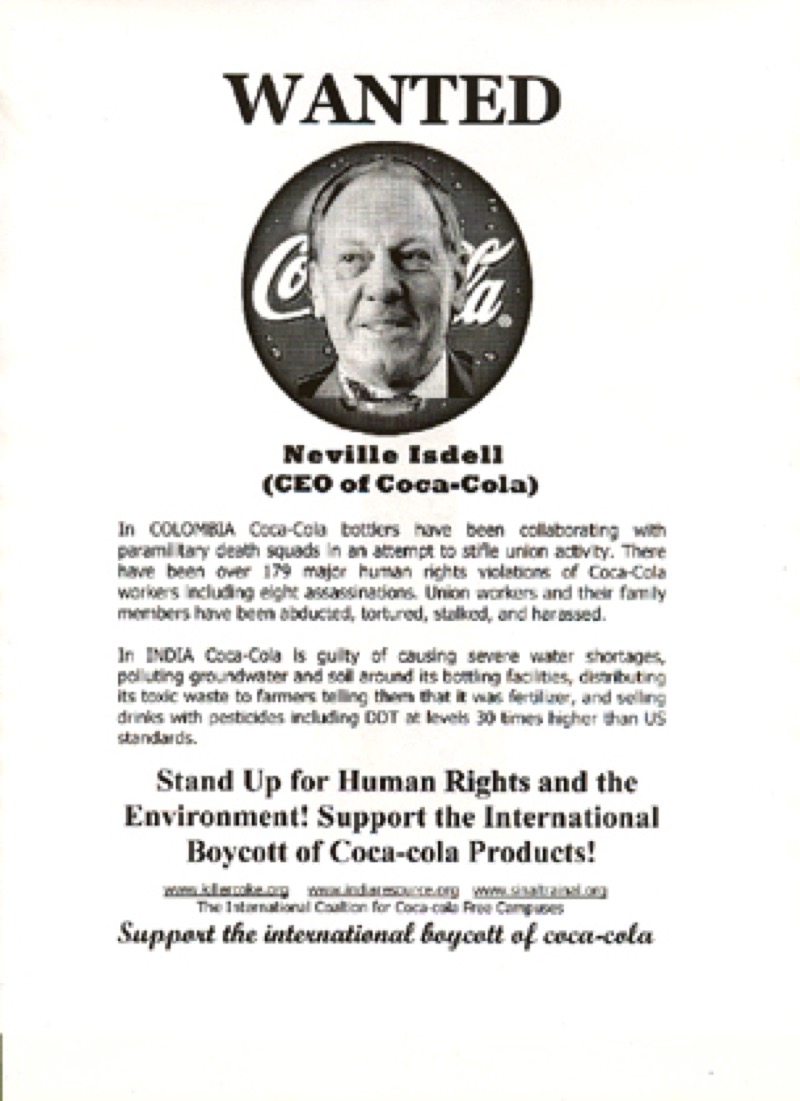
Click to get USAS's Isdell Wanted Poster
The Age, "Coke in hot water over 'diet-aid' tea," Julian Lee and Vanda Carson, January 8, 2007
Read Article
"They should have called this drink Fleece, since that's what they're trying to do to consumers," he [Michael Jacobson, the executive director of Centre for Science in the Public Interest] said at the time of the law suit. "Plain old tap water has zero calories, five calories fewer than Enviga, but unlike Enviga, tap water doesn't cost $15 a gallon."
India Resource Center, "Icon of Anti Coca-Cola Struggle, Mailamma, Passes Away," January 7, 2007
Read Article
ibnlive.com, "Kerala's anti-Coke crusader is dead," January 7, 2007
Read Article
India Resource Center, "Icon of Coca-Cola Campaign Receives Speak Out Award," October 8, 2005
Read Article
Hartford Courant, "So-called health soda sparks vigorous debate," By Joann Klimkiewicz, January 1, 2007
"The center charges Enviga is falsely marketing itself as a weight-loss product. The group contends the product's claims are paper-thin and based on an unpublished study it calls short-term, weak and inconsistent - much of that research, it notes, is funded by Coke and Nestle..."
CalorieLab Calorie Counter News, "The Enviga Code: The coming of the Anti-Coke," By Robert S. Wieder, January 1, 2007
Read Article
"It is probably not coincidental that Coca-Cola's introduction of Enviga comes amid (1) the release of studies demonstrating that the consumption of sugary soft drinks goes hand in hand with increasing rates of childhood and adolescent obesity, and (2) growing pressure to limit the availability of those drinks in public schools.
"The fact is, if Coke were motivated by altruism or a concern for the public health, the company would simply start producing and selling Enviga in place of its current mega-cal drinks. The actual point of Enviga is just the opposite."











